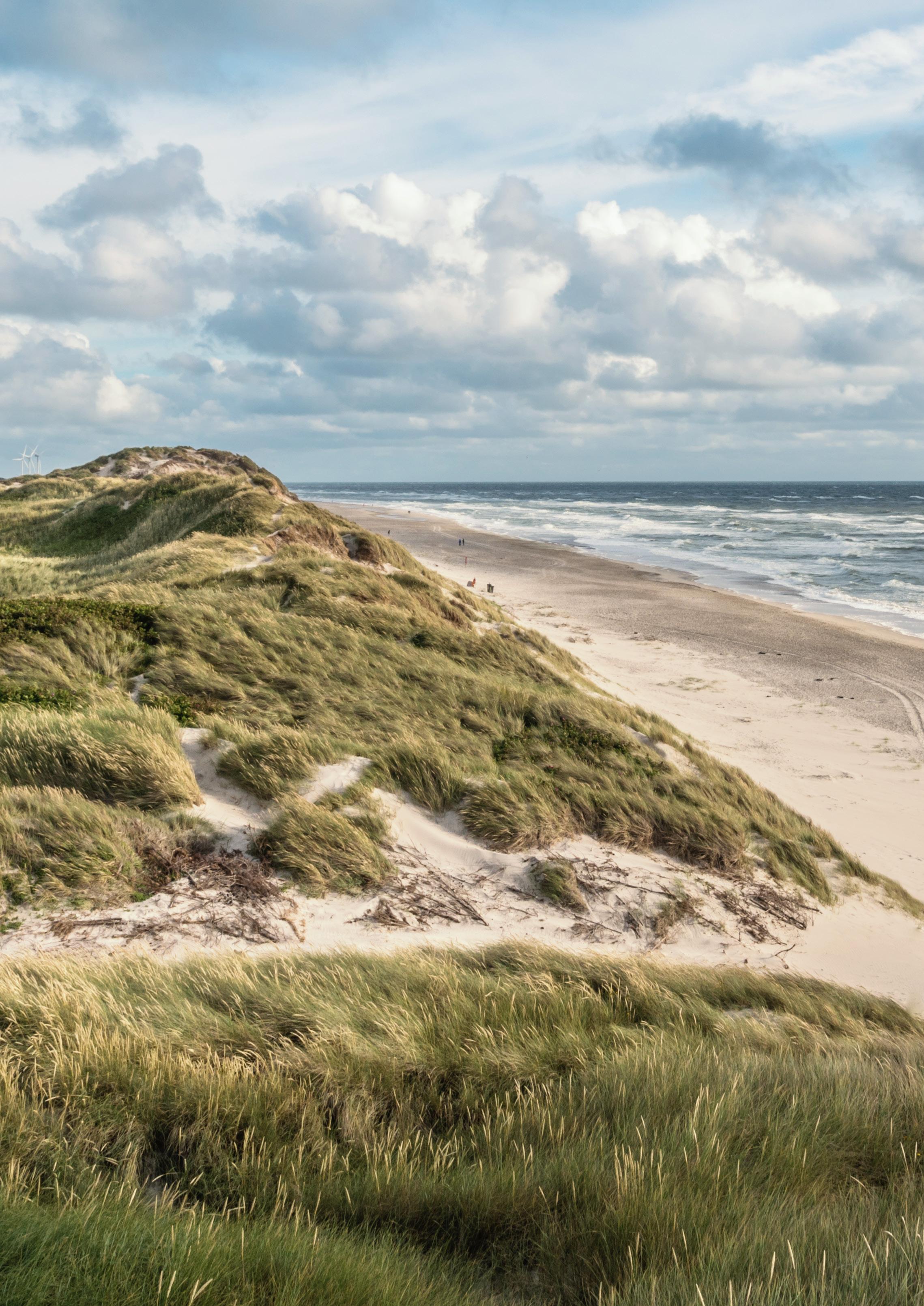
Verdo’s Annual Report 2023
06
About Verdo energy group
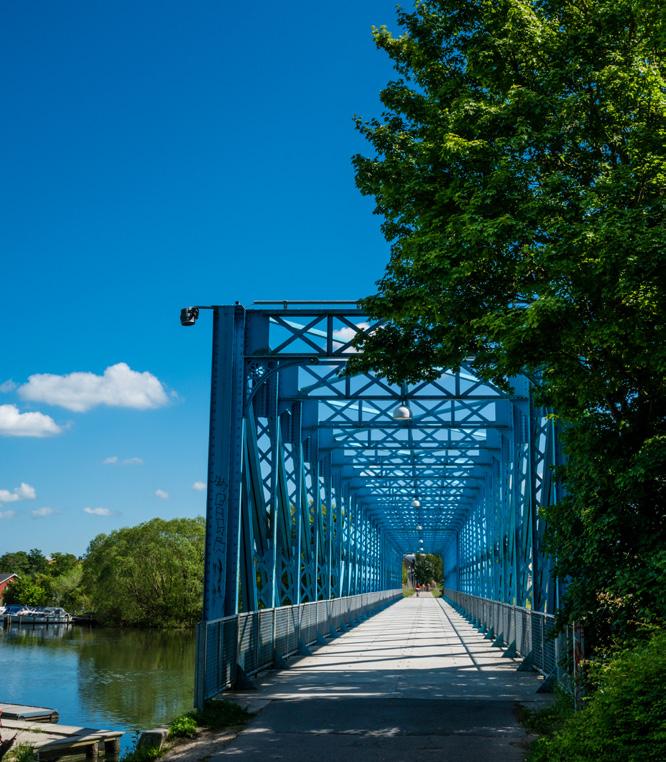
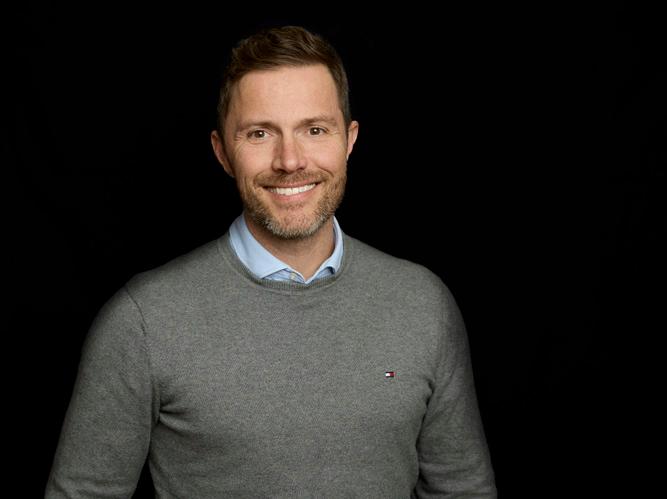
Energy for the future
22

36
Verdo’s business areas

20
30
Update on historical cases

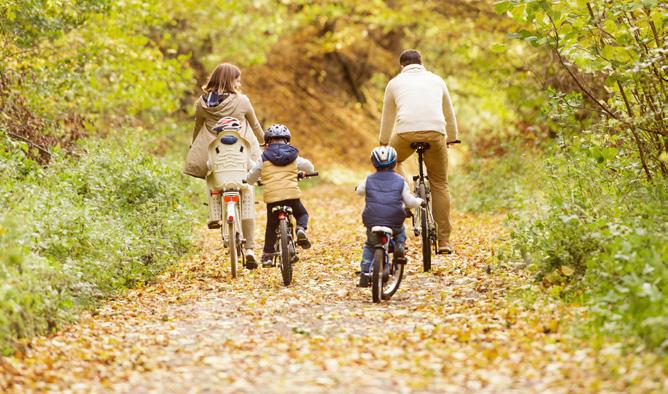
Climate and environment (E) Energy consumption and composition
61
2 Annual report 2023
Verdo in numbers 2023

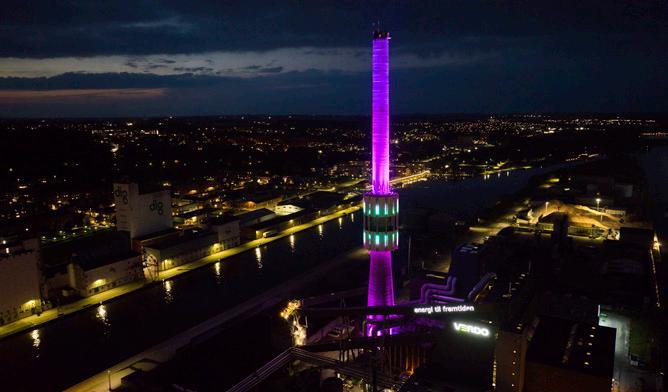
3 Annual report 2023 Contents 85 106 Financial statements Management commentary Management introduction 4 About Verdo energy group 6 Social contract 8 Our foundation 10 Value of the social contract – from the local community’s perspective ......................................................... 11 A democratic way of doing business ......................................... 14 Board members in profile......................................................... 16 From the Board of Representatives 18 Verdo in numbers 2023 20 Energy for the future 22 Strategic focus areas 26 Verdo Group companies and structure 29 Update on historical cases 30 The financial statements for 2022 and 2023 must be viewed together to see both sides of the energy crisis 32 Financial highlights 35 Business areas in the Verdo Group 36 Energi & Forsyning ............................................................................. 37 Trading .................................................................................................... 44 Energy ..................................................................................................... 46 Teknik ....................................................................................................... 48 Elsalg ....................................................................................................... 50 Verdo as a responsible social player ...................... 52 Business model 53 Verdo’s ESG results 2023 56 Climate and environment (E) ................................... 60 Social sustainability (S) ............................................ 77 Governance (G) .......................................................... 94 ESG table ...................................................................... 98 Financial statements Management’s statement 107 Accounting policies 108 Income statement for 2023 115 Balance sheet on 31 December 2023 116 Statement of changes in equity for 2023 119 Cash flow statement for 2023 121 Notes 122 The independent auditor’s report 132 Social sustainability (S) Employee training
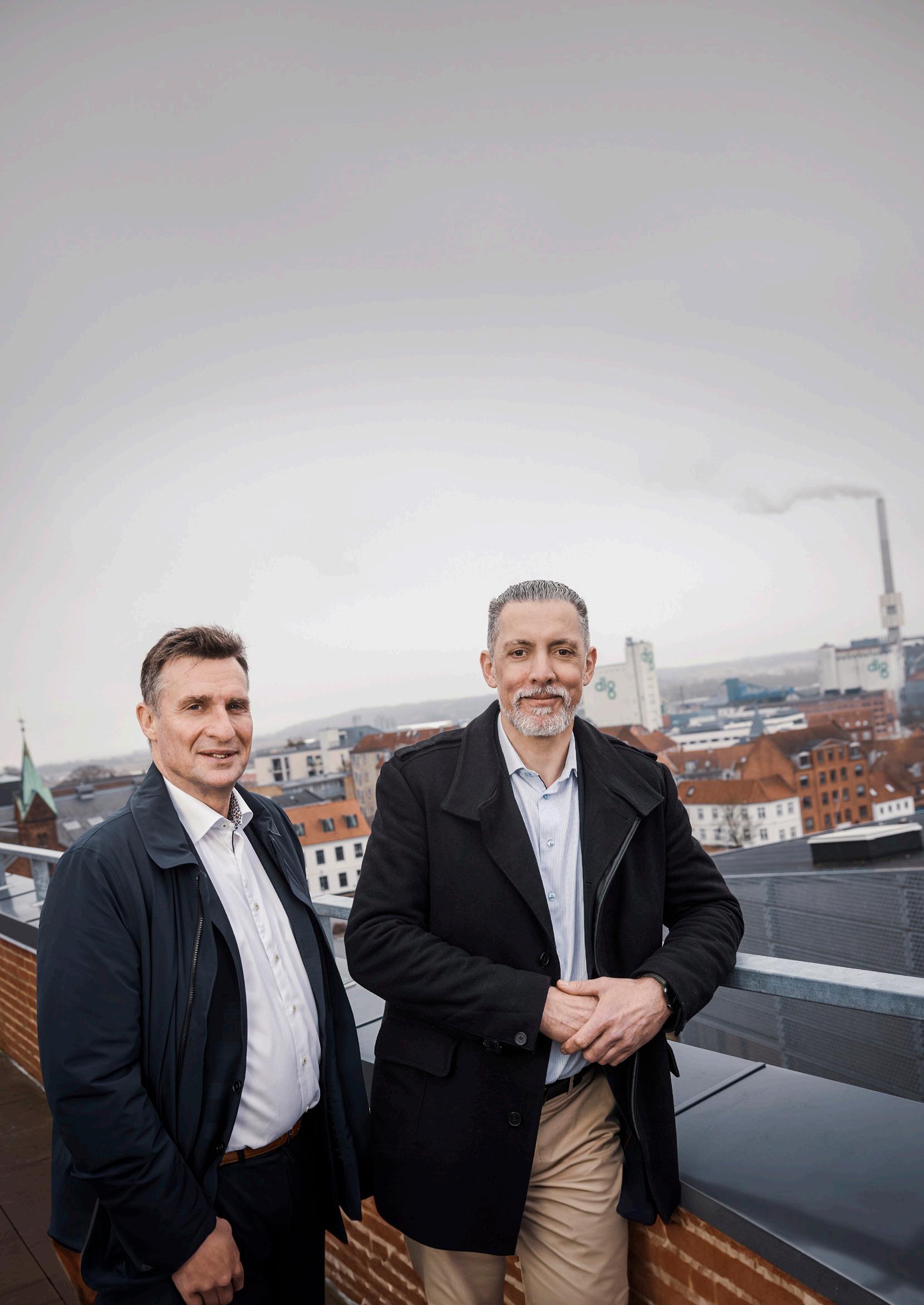
We have laid the foundation for the future energy supply, and this work will continue at full speed in 2024, with more detailed analyses and several concrete initiatives that will bring the transition much closer to home.”
Course set for Energy of the Future
Some years bring greater changes than others. Most people well remember the energy crisis of 2022 and the tremors it sent through society. 2023 seemed tame – almost boring –by comparison, and is unlikely to be remembered.
However, this is far from true at Verdo, where 2023 ended up being a landmark year and one that marked the start of a new era. This is because of the extensive work on Energy of the Future, which will define the energy supply in Randers and Herning for future generations.
After several years of intense analysis, the backdrop was set for ensuring a green energy supply for consumers at competitive prices in the coming decades. This will be firmly anchored in local energy sources, with security of supply levels that, despite rising external pressures, are at least as high as today.
Energy of the Future really got underway when Verdo decided to establish a heat storage facility on Bronzevej in south Randers. This is the first concrete investment in the future energy supply, and one of the elements that will pave the way for increasing the share of renewable energy from solar and wind in the heating supply.
2023 also marked another record year for the conversion of households and businesses from fossil fuels to district heating. This is especially the case in Randers, where the potential is greatest and where citizens are strongly supporting this part of the green transition. Gas conversion is the area where Verdo currently contributes most to reducing carbon emissions, and we are conscious of our responsibility to expand the supply area where possible, so that as many households and businesses as possible can phase out oil and gas.
However, in terms of earnings, we cannot in any way be satisfied with 2023. The year was dominated by highly volatile prices and demand scenarios. The collapse in Q4 2022, in particular, was keenly felt throughout 2023. Significant drops in electricity prices impaired conditions for Verdo Produktion A/S, while the collapse in wood pellet prices impaired conditions for Verdo Trading A/S. A change in behaviour towards lower electricity consumption was also part of the mix.
While Verdo Teknik A/S made progress, it was not enough to secure the necessary earnings. Verdo Energy Systems A/S has seen impressive growth, but has only just created the foundation for future earnings now.
The financial results give occasion to review all parts of the business and adjust operations where necessary, adapting to the reality we are now facing.
We expect 2024 to be another difficult year characterised by high levels of unpredictability, supply chain uncertainties, global crises and wars, and a general economic downturn.
However, this does not change our course. We have laid the foundation for the future energy supply, and we will continue to move ahead at full speed in 2024, undertakingmore detailed analyses and several concrete initiatives that will bring the transition much closer to home. It is a complex process involving major investment decisions. Verdo will therefore have a special focus in the coming period on ensuring that we have the competencies needed to take the next steps into the future. It is a job we look forward to.
In conclusion, we would like to thank our employees, partners and everyone else who contributed during 2023 to the development of Verdo and of the communities we are an integral part of.
We look forward to keeping up the good teamwork.
We hope you enjoy reading the report.

 Torben Høeg Bonde Jakob Flyvbjerg Christensen Chairman of the Board CEO
Torben Høeg Bonde Jakob Flyvbjerg Christensen Chairman of the Board CEO
5 Annual report 2023
About Verdo energy group
Verdo is a purpose-driven company with over 150 years of history. We work to promote our cooperative owners’ common interest in heating, water and electricity, and towards increased democratisation, by ensuring the broadest possible consumer influence in our supply areas in Randers, Herning and Kongerslev.
We are a locally anchored energy group, responsible for supplying electricity, water and/or heating to a large number of private homes and businesses in central Jutland. In addition to our regulated utilities business, the Verdo Group consists of a number of commercial business areas.
We are a forward-looking organisation, made up of almost 600 talented people, which aims to create energy for the future in responsible ways that contribute to addressing climate and environment challenges. Verdo also makes energy and infrastructure more accessible, thus helping to maintain living standards and ensure well-being in the areas where we are active.
We are the specialists who build the district heating network, and produce and transmit the heat in people’s radiators.
Who supply coal to industry, and thereby to present and future technologies, and for energy production, where coal remains an indispensable part of global security of supply.
Who upgrade street lighting to more climate-friendly LED solutions and help reduce energy consumption and climate footprint.
Who develop intelligent traffic lights that read and optimise traffic flows, helping to improve traffic safety and reduce carbon emissions.
Who make it easier for private households and businesses alike to drive in a more eco-friendly manner through our charging stations.
Who produce and sell green power based on environmentally certified and renewable energy sources such as solar, wind and biomass.
And who help companies and other utilities produce energy responsibly by providing high-tech waste and biomass plants and heat pumps, which actively displace fossil fuels and support the energy transition.
We thus make a key difference in a variety of ways. At home. Locally. Nationally. Globally. We are part of the global community, more than ever before, while also being part of and actively supporting the local community. We take joint responsibility as we develop and use energy-efficient solutions for the benefit of our climate and planet – today and for future generations. We are conscientious and ambitious, and take new steps every day – together.
Facts:
As of 31 December 2023 Verdo had 590 employees –126 in Energi & Forsyning, 155 in Energy, 144 in Teknik, 39 in Trading, 109 in Holding and 17 in Elsalg.
The majority of employees work at our Danish sites in Randers, Herning, Aarhus, Aalborg, Hillerød and Næstved. We also have sites in Norway, Poland and the USA.
6 Annual report 2023
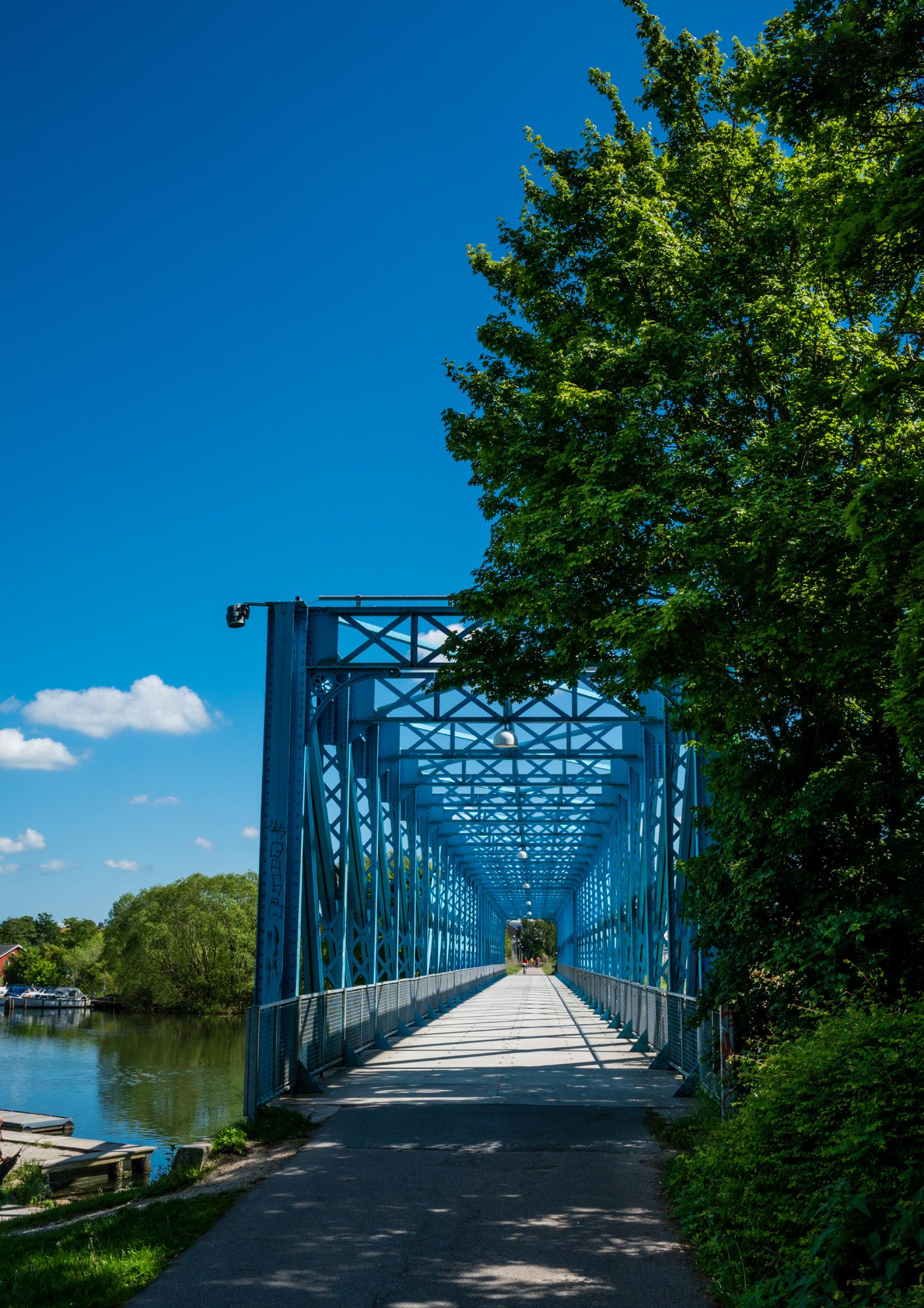
7 Annual report 2023
Social contract
Verdo’s social contract defines our efforts in relation to the climate and environment, and social, financial and leadership sustainability, and the way we do business. It is based on mutual interest and dependence between companies and society, such that we create change together – for the benefit of all.
It is vital for companies that there is a functional society and a strong infrastructure that creates security and opportunities and supports society economically and socially. Conversely, the outside world has an interest in successful and competitive companies that can support the economy.At Verdo, the social contract helps to cement our responsibility towards our customers, the local community, our partners and each other as employees.
We have no shareholders or owners who are entitled to a share of any profits, so instead we reinvest part of the profits over time in developing our business, which also benefits society. As part of our social contract, we also distribute funds to promote business and urban development, and to innovation projects related to the transition to sustainable critical infrastructure. Finally, we support the development of local communities, financially and otherwise, through sponsorships and other local activities that help make a real difference.
In 2023, we supported:
• Randers FC
• Randers Q
• Randers HK
• Randers Cimbria
• Harbour Challenge Randers
• Værket (Randers)
Randers Teater
Randers Regnskov
Randers Festuge
Oust Mølle Rock (Randers)
Underværket (Randers) ice rink
Idrætscenter Korshøj (Harridslev)
• Hornbæk Sportsforening (Randers)
• Munkholmhallen (Stevnstrup)
• Romalt Aktivitetshal (Randers)
• Herning Blue Fox
• HC Midtjylland (Herning)
• Herning Forenede Håndboldklubber (HFH)
• FC Midtjylland
• Viborg FF
Aalborg Pirates
AGF
Medaljefonden
Award ceremony at Tradium
Christmas aid (Randers and Herning)
Byens Bedste Randers
• Danmarks Indsamling
8 Annual report 2023| Social contract
Our social contract
Customers – making life simpler and more secure
• We make an effort to understand and deliver on our customers’ needs, making it easy to be a customer with us.
We deliver secure utility services at competitive prices.
• We act with decency and seek to earn the trust of our customers.
Society – local development
• We give back and contribute to the development of our local communities.
We create an attractive foundation for a rich and growing business community.
We develop and share knowledge and support projects that advance the green transition.
Employees – a community that promotes growth
• We equip employees for the future labour market through individual development and the opportunity to have great responsibility.
• We create the framework for a committed community and dedicated employees, where we dynamically work towards ambitious common goals.
We create an attractive workplace with a strong sense of purpose.
Partners – long-term relationships
• We are transparent and flexible in the way we work with our partners.
• We set set high standards in relation to competitiveness, deliveries and working conditions.
We work towards close relationships and longterm benefits.
9 Annual report 2023
Our foundation
Our mission
Verdo’s mission is to operate and develop sustainable critical infrastructure for the benefit of customers and future society, based on heating, water, electricity and technical infrastructure.
This is the basis for a business that seeks to serve both customers and society.
We look for new possibilities, and seek to use digital and innovative solutions to make life simpler for our customers, while guaranteeing high security of supply and competitive prices.
We invest for the long term and based on careful consideration, focusing on the climate, environment and resource economy, with respect for present and future generations.
Our vision
Verdo’s vision is to be one green step ahead – together.
We seek to realise this vision by actively contributing to the green transition and leading the way in developing the future energy supply.
We cannot do this on our own. We believe we will be most successful when working closely together with the rest of society – as we develop new solutions with our customers, and infrastructure and urban areas with local partners, as we work with government authorities, and as we together build an inclusive corporate culture.
Our values
These values are our foundation: Together Responsible
• Ambitious
They reflect our approach to running a responsible business. As does our aim of being an active and responsible local player that helps drive and spearhead the green transition, and our aim of doing so through mutually committed partnerships – both internal and external.
This means that:
We have a strong team spirit, and work together with our customers, employees, partners and local associations to create solutions for future society.
We take responsibility for more than our own results, and strive to make a clear difference in the green transition.
We are ambitious as we take the lead in ensuring continued development through dynamism, professionalism and dedication.
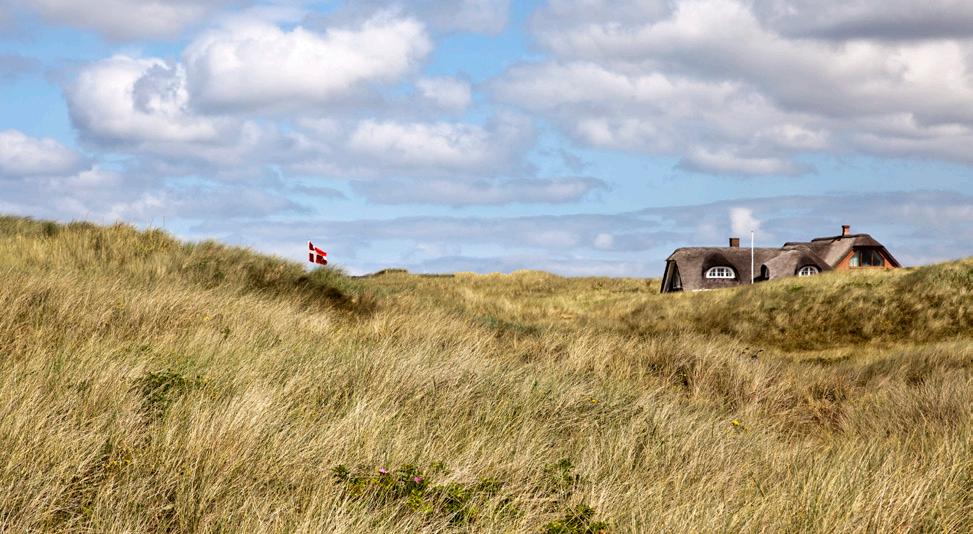
10 Annual report 2023
| Our foundation
Value of the social contract – from the local community’s perspective
As a company, we have a responsibility towards the environment and climate, to be socially responsible and to practise good governance, and we cannot do all this alone.
Based on our social contract, we therefore recognise the need to enter into strong strategic partnerships. Good partners are key to our success.
We are mutually dependent
By Søren Degn-Pedersen, Head of Secretariat and Sustainability, Randers Municipality
The Randers City Council has adopted a climate plan that strives towards climate neutrality by 2050. The municipality, of course, looks at our emissions as an organisation, but if we are to seriously reduce carbon emissions for the entire municipality we must involve all the players, and Verdo is a key one.
The sustainability committee identified three focus areas in 2023 – afforestation, energy and education – and without Verdo as a partner, we will not achieve our goals.
The afforestation element is about absorbing CO2 and protecting biodiversity. This is relevant because Verdo supplies Randers with drinking water, and afforestation is effective in protecting groundwater resources. If we are successful in this, we can kill several birds with one stone. So I hope we will see the first groundwater protection projects during 2024-25.
With its heating supply and energy production, Verdo plays a key role in the municipality’s strategic energy planning. How do we plan the major energy balances locally so that we get 100% green energy in Randers Municipality?
The municipality acts in the authority role, and Verdo is responsible for implementation. We are thus dependent on each other in order to achieve our goal of 100% green energy in 2050.
When the city council next updates our climate plan, we expect more focus on promoting green behaviour among citizens. Verdo’s direct contact with thousands of utility customers puts the company in a unique position. It will be great if Verdo can also see the possibilities and wants to work with us.
Common to all our partnerships – regardless of size, economic scope and strategic anchoring – is the potential to build long-term relationships that promote mutual growth. This demands that we are transparent and flexible in our collaboration, and also set the bar high regarding competitiveness, deliveries and working conditions. Only by being ambitious together on these parameters can we deliver solutions that make a real difference.
Our direct collaboration is one of the reasons we were able to make the comprehensive climate cooperation agreement between Verdo and Randers Municipality.”
It is clear that Verdo plays a positive role in the major tasks that lie ahead. The numerous households that have switched to district heating in recent years is a good example of the results that have already been achieved. Joint events for entrepreneurs are another good example.
Our direct collaboration is one of the reasons we were able to make the comprehensive climate cooperation agreement between Verdo and Randers Municipality. The agreement is a good joint foundation for achieving results, so I believe that we can achieve even greater results together in the coming years. Randers needs that.
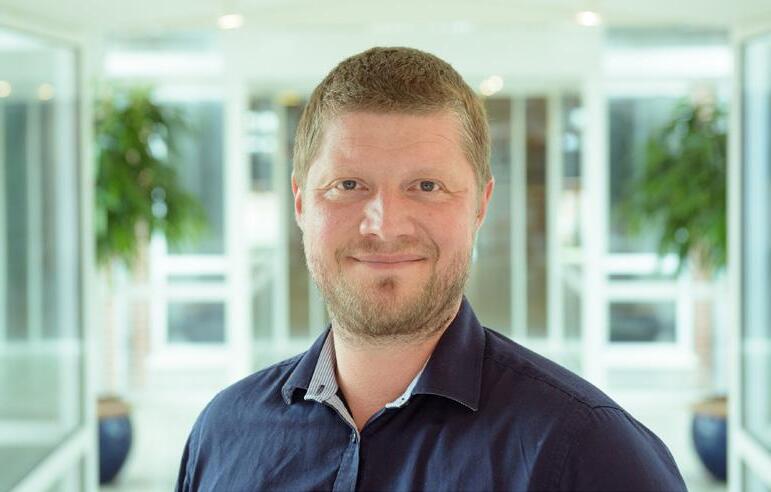
11 Annual report 2023
Value of the social contract |
Verdo can help make consumers aware of their contribution. What they can be a part of and how this helps achieve the national goals.”
Verdo’s local roots build bridges to the major changes taking place globally
By Thea Lyng Thomsen, CEO of Bæredygtig Herning.
As a partner in the work, it is great to see that Verdo has chosen to actively play a greater role in the Herning area.
It is clearly evident that Verdo as a company rests on a consumer-owned foundation – with the strengths and challenges that entails. This is reflected in Verdo’s proactive and positive approach to the transition of the energy and heating supply, by both taking the lead and involving others.
I see local anchorage as central in addressing our challenges with the transition to green energy. This is where

we find the answers to how we can make the transition in a fair way that local citizens can accept. However, this demands a willingness and interest in working continuously with openness in the local area.
As a consumer-owned company, Verdo has a unique role to play through its close connection to consumers. Verdo can help make consumers aware of their contribution. What they can be a part of and how this helps achieve the national goals. Verdo can thereby bridge the gap between major geopolitical movements in the world and the local level, where consumers ask themselves: “Can I get affordable energy? And what energy am I willing to pay for?”
Verdo’s role as a facilitator in the green transition is also important in relation to ensuring that we use our land efficiently. Meeting all the challenges we are currently facing will require more than four times the land we have available in Denmark. We must therefore be good at finding initiatives that will allow us to do several things in the same space.
I have no doubt that we will benefit from the efforts that are currently being set in motion as we begin to reap the results in the coming years.
12 Annual report 2023| Our foundation
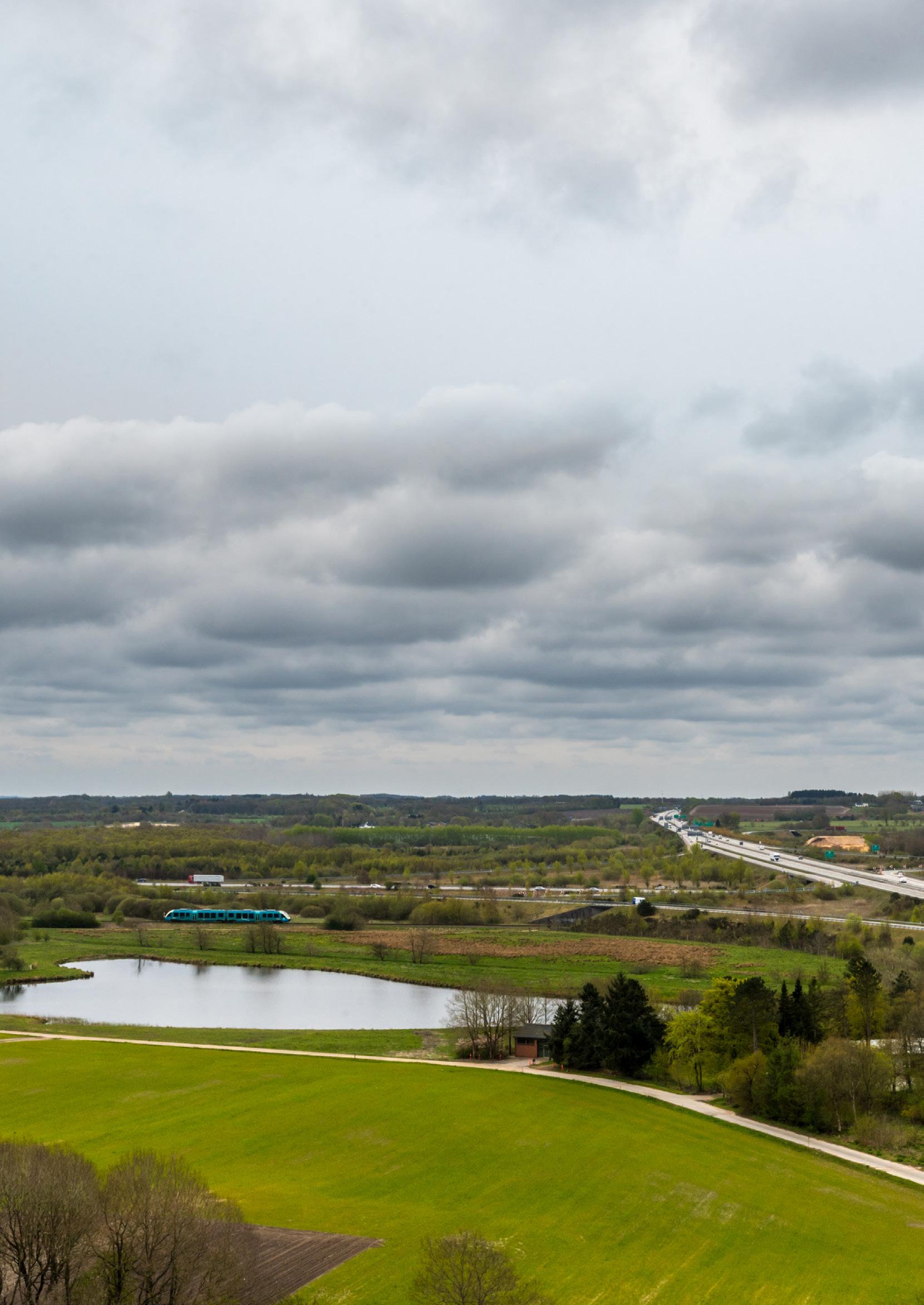
13 Annual report 2023
A democratic way of doing business
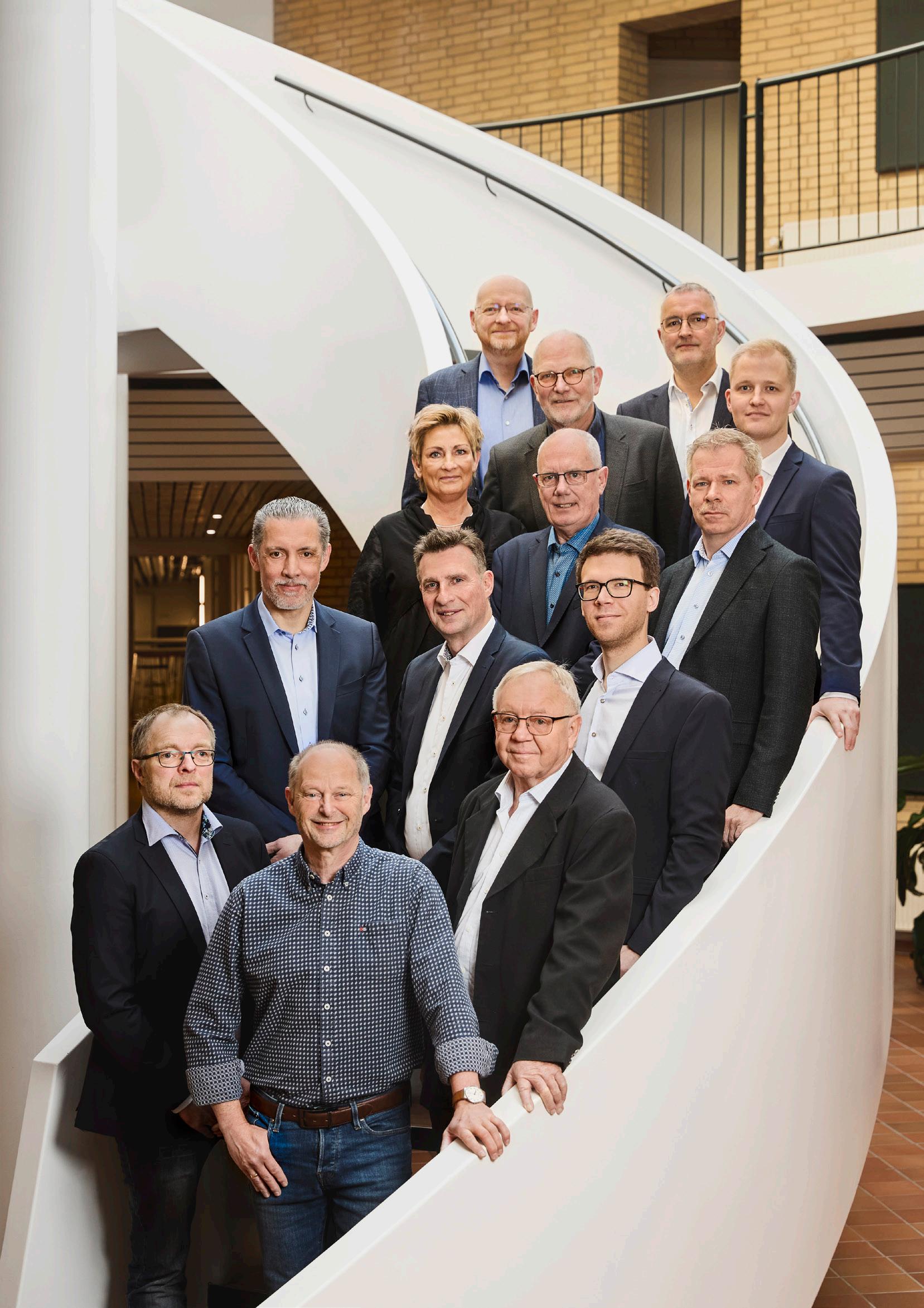
Not present above

 Peter Nowack, board member
Top, from left: Keld Christensen, board member, Peter Kjærsgaard, board member.
Second row: Niels Rasmussen, board member, Martin Rubæk, employee representative.
Third row: Pia Maach-Møller, board member, Finn Stengel Petersen, board member, Bo Svoldgaard, board member. Fourth row: Jakob Flyvbjerg Christensen, CEO of Verdo, Torben Høeg Bonde, Chairman, Dines Velling Johansen, employee representative. Bottom row: Lars van Hulst Pedersen, employee representative, Jan Guldmann, board member, Finn Skaarup Andersen, Deputy Chairman.
Jes Grønning Hansen, employee representative
Peter Nowack, board member
Top, from left: Keld Christensen, board member, Peter Kjærsgaard, board member.
Second row: Niels Rasmussen, board member, Martin Rubæk, employee representative.
Third row: Pia Maach-Møller, board member, Finn Stengel Petersen, board member, Bo Svoldgaard, board member. Fourth row: Jakob Flyvbjerg Christensen, CEO of Verdo, Torben Høeg Bonde, Chairman, Dines Velling Johansen, employee representative. Bottom row: Lars van Hulst Pedersen, employee representative, Jan Guldmann, board member, Finn Skaarup Andersen, Deputy Chairman.
Jes Grønning Hansen, employee representative
Verdo is owned by our cooperative members. This means that we can focus on our customers and on meeting the long-term goals defined by our cooperative members as Verdo’s purpose.
Our role is not to deliver short-term profits to external owners, but through long-term investments, to fulfil our social responsibility, help drive the green transition and deliver the best solutions to customers – who are also our co-owners.
As a cooperative-owned company, we have an obligation and an interest in involving the members of our Board of Representatives in developing the organisation. We
Verdo’s ownership
Verdo a.m.b.a. is owned by the cooperative owners. These are the Group’s heating consumers in Randers and Herning, water consumers in Randers and the consumers connected to the electricity grid in Kongerslev. As a cooperative, Verdo works to advance the cooperative owners’ common interests by purchasing heat, water and electricity. All cooperative members can exercise influence by voting in elections to the Board of Representatives, based on the ‘one meter – one vote’ principle. Elections to the Board of Representatives are held every four years.
do this in part through our two annual meetings of the Board of Representatives, supplemented by one to two annual dialogue meetings focusing on selected themes. Regular information is also provided about developments at Verdo, so that members are best equipped to fulfil their responsibilities on the Board of Representatives and to be good ambassadors for Verdo and for the green transition in the local community.
We asked two of our board members and two members of the Board of Representatives what it means to them to be part of a cooperative and thus have direct influence on Verdo’s role in and contribution to the green transition, now and in the future.
Board of Representatives Supervisory Board
The Board of Representatives is Verdo’s supreme governing authority. The maximum number of members of the Board of Representatives is 85 – elected in the three supply areas: Randers (56 members), Herning (28 members) and Kongerslev (one member). The number of seats per supply area is based on the proportion of meters. On 31 December 2023, the Board of Representatives had 69 members.
Verdo’s Supervisory Board is elected by and from among the Board of Representatives. The Supervisory Board is responsible for the general management of the company and approves the company and Group strategy. The Supervisory Board also approves the Group’s budgets and financial statements. The board has 10 members – three from the Herning voting area and seven from the Randers/Kongerslev voting area. In addition, there are four employee representatives.
Executive Board
Verdo’s Executive Board is responsible for daily operations and consists of one or more executive officers elected by the Supervisory Board. On 31 December 2023, Verdo’s Executive Board consisted of CEO Jakob Flyvbjerg Christensen and CFO Kenneth R. H. Jeppesen.
15 Annual report 2023 >
Board members in profile
As a representative of a cooperative, I am very conscious of our social obligations. It is vital that all citizens have equal access to essential resources such as water and heating.”
Dialogue with the Board of Representatives helps to effectively adapt strategies and initiatives
By Niels Rasmussen, consultant and former factory manager, and a member of Verdo’s Supervisory Board since 2010
Verdo’s strategy and actions are deeply rooted in a commitment to social responsibility. We have entered into a social contract, and with that in hand, we strive to be one step ahead in the green transition, not just internally but also in the communities where we are present and engaged. It also means that we try to raise awareness and improve knowledge of the green transition through partnerships and dialogue – in the local communities and on a more general level.
Our approach to the future is based in part on careful consideration of alternative energy sources that can benefit our company, our customers and society at large. Verdo will be making major investments in the development of the future infrastructure, and only by creating a high level of information and openness can we effectively reduce the local resistance that we may encounter to essential green projects such as wind and solar farms.
Our focus on advancing the movement towards more responsible solutions also involves an active effort to overcome the barriers – such as the price cap on excess heat – that impede the green transition. This process requires cooperation and understanding from all sectors, as well as from policy makers.
As a representative of a cooperative, I am very conscious of our social obligations. It is vital that all citizens have
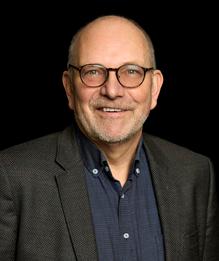
equal access to essential resources such as water and heating.” Through new digital services, we work hard every day to ensure that our customers can benefit from the most efficient solutions, while helping to minimise the environmental footprint and keep prices down for consumers.
As a board member, I believe that Verdo’s efforts to promote open and honest communication with the Board of Representatives are important. We have expanded our communication platforms to include regular dialogue meetings in addition to the two annual meetings of the Board of Representatives. The purpose of these meetings is to create a more informal space for dialogue and the exchange of knowledge and experiences. I believe that the dialogue meetings allow us to achieve a greater understanding between the Board of Directors and the Board of Representatives, and ensure that the views of the Board of Representatives can be taken into account in our strategy. They also help prepare the members of the Board of Representatives for their role as ambassadors for Verdo’s green transition agenda in their respective communities.
16 Annual report 2023 | Board members in profile
Verdo is a cooperative owned by consumers in Herning and Randers, and that is where our focus must be. But if we can contribute at national or even international level with profitable solutions, of course we should do that as a secondary aim.”
Verdo is all of us, and the better things go for Verdo, the more it can give back to us
By Peter Kjærsgaard, car dealer and member of Verdo’s Supervisory Board since 2020
As a board member, I would like to highlight Verdo’s significant contribution to the green transition over the years. Our biomass-fired CHP plant has significantly reduced carbon emissions since 2009. This has ensured green heating at competitive prices for district heating customers, and we have long been involved in sustainable projects such as purchasing and planting forests and replacing street lights with LEDs.
We are facing major challenges globally, but we are doing what we can at Verdo by expanding our district heating network and keeping prices at a reasonable level, while preparing to close the CHP plant in Randers in 2036. Our Energy of the Future project is exploring all possibilities and new technologies, to ensure we have robust and reliable energy solutions with a continued high security of supply.
The work of developing the decentralised plants of the future comes with many new opportunities, but also demands great flexibility – far greater than before. Not only from us at Verdo, but also from our energy consumers, both private and commercial. This development may create a greater need for investments in the homes of energy consumers, which not everyone may be able to do. We should make an effort at Verdo to ensure that consumers can meet these investment needs – for the benefit of consumers, Verdo and society.
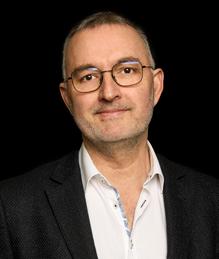
It is all very complex, but we are underway, and we are going to succeed.
Verdo is a cooperative owned by consumers in Herning, Randers and Kongerslev, and that is where our focus must be. But if we can contribute at national or even international level with profitable solutions, of course we should do that as a secondary aim. For example, we own Verdo Energy Systems – a commercial company which specialises in energy plants, heat pumps, boiler systems and boiler servicing. They are proof that Verdo’s competencies can be developed into a business area outside the local area.
Our Board of Representatives is one of our most important stakeholders, in that they are Verdo’s decision-making body. If we can encourage each representative to become engaged in the green transition in their network on behalf of Verdo and promote ideas and the flexibility that will be required of all of us, I believe that the Board of Representatives can make a difference. Our role on the Supervisory Board is to prepare everyone for this task and to listen to the input from the representatives. The starting point must be that we all want the best for Verdo.
17 Annual report 2023
Board members in profile |
From the Board of Representatives
Verdo can serve as a beacon for other companies and society by demonstrating how to integrate green principles into all aspects of its operations and business model.”
Verdo has a unique chance to be a key player in the green transition
By Nikolaj Rosenkilde Kølbæk, senior assistant and member of Verdo’s Board of Representatives since 2022
Verdo has a unique chance to be a key player in the green transition – as an active partner in society and as a company that gives centre stage to sustainability. As a local player, Verdo can play a vital role in accelerating the transition to renewable energy sources – by investing in and developing green infrastructure solutions and by informing and engaging the local community in sustainable initiatives.
Verdo can serve as a beacon for other companies and society by demonstrating how to integrate green principles into all aspects of its operations and business model.
Being a member of the Board of Representatives gives me a unique opportunity to directly influence and contribute to the green transition on a local level. As a consumer representative, I can participate in decision-making processes and contribute ideas and perspectives that advance Verdo’s sustainable initiatives and investments. It also gives me a platform to be a voice for our local community and ensure that its interests and needs are heard and met in Verdo’s strategies and projects.
Conversely, by being an integral part of the local community, Verdo can build trust and support for sustainable projects and ensure that local needs and priorities are taken into account. Verdo’s local presence can also help create job opportunities and economic growth through green investments and initiatives.

Verdo’s broadly-based Board of Representatives has the potential to play a vital role in the green transition by serving as a platform for dialogue, collaboration and knowledge sharing. By engaging and involving a diverse Board of Representatives, Verdo can strengthen its legitimacy and anchoring in the local community, and ensure that decisions and actions reflect different perspectives and needs. The active role of the Board of Representatives should possibly be increased through more regular dialogue meetings and topic-based working groups.
Verdo’s most important task in 2024 will be to continue to drive the green transition forward with determination. This means maintaining and increasing investments in renewable energy and energy efficiency, and intensifying efforts to engage and mobilise the local community in sustainable initiatives. Verdo should also focus on strengthening its partnerships and collaboration with other players in the energy sector, and work towards a more integrated and sustainable future for both the company and society as a whole.
18 Annual report 2023| From the Board of Representatives
In order to contribute effectively to developing the sustainable energy sources of the future, Verdo needs to constantly keep abreast of the many new technologies and opportunities that arise along the way.”
Verdo’s aim of being one green step ahead demands the courage to invest and innovate
By Birgit Meyer Balle, radiographer and member of Verdo’s Board of Representatives since 2022
Verdo’s aim of being one green step ahead demands the courage to invest and innovate, which will involve costs. Verdo’s Energy of the Future initiative marks an important step in this direction. It is vital that we communicate our efforts more clearly and more often, not only to the Board of Representatives, but also to the wider public, to ensure awareness and support for the project.
In order to contribute effectively to developing the sustainable energy sources of the future, Verdo needs to constantly keep abreast of the many new technologies and opportunities that arise along the way. While, of course, respecting the financial and resource framework. This includes active participation in relevant research projects that match Verdo’s core values.
Local anchorage is essential in order to promote the green transition at a local level. For example, by launching initiatives such as campaigns with tips for saving water, electricity and heating and thinking ‘greener’, Verdo could motivate individual action and responsibility – ideally with a humorous approach, to make the quite serious messages easier to digest.
Regarding Verdo’s Board of Representatives, our role should be expanded beyond the usual meetings. Active involvement through alternative channels such as
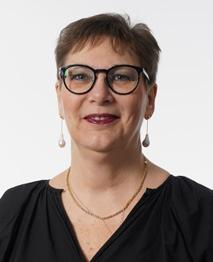
questionnaires can provide valuable insights and ideas, as the Board of Representatives consists of many different individuals, each with their own background and experience. This would not only enrich the work of the Supervisory Board, but also strengthen the link between Verdo and its stakeholders.
Verdo should continue to focus on the green agenda in 2024, while thinking even more creatively and ambitiously. One concrete way to do this would be to establish large public forests, rather than smaller tree-planting projects, as we do today. These would not only significantly improve our carbon footprint, but also serve as educational resources for the local community. The forests could be geographically widespread, so they are not only centred around Randers. Let’s think community and let’s think bigger.
19 Annual report 2023
From the Board of Representatives |
Verdo in numbers 2023

newly connected district heating customers –private and commercial 21 738 trainees and apprentices (9 trainees and 12 apprentices)
employees in total 590
in revenue
is the proportion of the underrepresented gender at Verdo’s executive level
1,388,440 tonnes DKK -17.9 million
(biomass and carbon products) handled in the Trading division in after-tax profit DKK 4 billion 76,000 21 %
private homes and businesses in Randers and Herning receive district heating from Verdo
10 %
is the proportion of the underrepresented gender on Verdo’s Supervisory Board

9
25 % employees in senior jobs
is the proportion of women on the Board of Representatives
400
18,005
trees planted by Verdo
546
district heating conversions in Randers and Herning days of training completed at Verdo Academy reports made to Verdo’s whistleblower scheme
members on Verdo’s Board of Representatives 69
0
net electricity generation from biomass 115,552,864 kWh
Energy for the future
The biggest challenge to the transition is the large number of interdependent processes that need to take place simultaneously. Three perspectives are presented below on the initiatives and changes that companies and consumers should expect in the coming years if the green transition is to succeed.
Increased electrification and close interaction with the electricity sector led Verdo to expand the scope in 2023 from Future Heating to Energy of the Future.”
We have moved from a focus on Future Heating to a broader focus on Energy of the Future
By Jesper Møller Larsen, Director of Energi & Forsyning at Verdo
Verdo’s largest climate contribution at present is to displace natural gas. This area has grown considerably in recent years, and we now have more than 10 employees engaged primarily in planning new expansions to the district heating network. The aim is to give as many households and businesses as possible the opportunity to move away from fossil fuels as quickly as possible. This work will continue until the last oil and gas boilers in Randers and Herning have been replaced.
Phasing out these small oil and gas boilers also helps improve the local environment by reducing pollution. District heating from Verdo is now based almost exclusively
Oil and gas conversions achieved by Verdo in Randers in 2023

on certified biomass which complies with the legislation in this area.
Verdo has the capacity to continue doing conversions from gas to district heating at the same fast pace as it is now. However, the pace could be affected by outside factors, including insufficient funds in the government’s district heating pool or shortages of essential components due to global supply chain problems.
Potential oil and gas conversions in Randers 2023-2025
Note: The figures for potential oil and gas conversions in Randers were extracted from the BBR register during the 2020-2023 period when
22 Annual report 2023
| Energy for the future
various
planning the
conversion projects.
Over Hornbæk Neder Hornbæk Romalt Stevnstrup Harridslev Assentoft Total Gas 647 376 220 739 387 1139 3508 Oil 38 59 14 36 30 99 276 Total 685 435 234 775 417 1238 3784
Randers Herning Households converted to district heating 366 34 Commercial floor space converted to district heating 66,000 m2 4,000 m2
Fremtidens Energi – Mulige teknologier
Heat sources
Varmekilder
Vind og sol

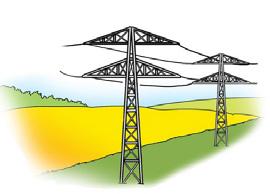
HPs and electric boilers
VP og elkedler

CHP plants?
KV-anlæg?

Biogas, syngas, brint, biomasse?
Biogas, syngas, hydrogen, biomass?
In parallel with the conversions, Verdo is engaged in a long-term strategic transition of the entire energy supply in Randers and Herning. The transition will contribute to a more energy-efficient, competitive and secure energy supply, based more extensively on local renewable energy sources such as solar and wind, and utilising surplus and waste heat.
Industri, Fjernkøling, PtX, Geotermi, Vand, Spildevand, Luft
Industry, district cooling, PtX, geothermal, water, wastewater, air
Increased electrification and close interaction with the electricity sector led Verdo to expand the scope in 2023 from Future Heating to Energy of the Future. The focus is on optimising the interplay between the production and consumption of electricity and heat. The work involves a wide range of elements such as agreements on establishing local energy sources, energy-efficient production, excess heat, improving utilising existing buildings, interaction with cooling, greater storage capacity, lower temperatures in district heating network and digitalisation.
The transition also involves reducing the use of biomass. The scope of this reduction will depend on the analyses Verdo is currently working on. Preliminary results suggest that biomass will continue to be needed to a minor extent as a tool for achieving the best interplay between the many different energy sources in the future energy system.
A decision was made in 2023 to take the first concrete step towards the future energy supply with the establishment of a heat storage facility on Bronzevej in south Randers.
Randers / Herning-Ikast-Sunds
Wind and solar Randers/Herning-Ikast-Sunds
Storage
Lager




Ab værk: 675 / 800 GWh
Spidslast: 200 / 230 MW
Reserve boilers
Reservekedler
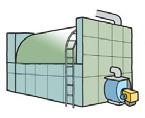

El, naturgas, biogas, syngas, brint, biomasse?
Electricity, natural gas, biogas, syngas, hydrogen, biomass?
Ikoner lånt fra gram-fjernvarme.dk
Throughout the process, it is crucial that Verdo has the necessary capacity to cover the current energy demand at all times. Due to rising numbers of district heating customers, capacity must be regularly increased. The transition must also be competitive and not lead to unacceptable price increases for individual consumers.
This is a process involving large investments and many stakeholders. The process has a time limit, as the CHP plant at the Port of Randers is to be phased out in 2036. The contract with the CHP plant in Herning also expires in 2034.
These will be major, visible changes in the local community. There is therefore a need for local anchoring, with acceptance and understanding of the positive effects of the changes among citizens.
The transition to the energy of the future will be a complex process. We therefore have a strong focus on attracting the competencies needed to manage the task.
There are large interdependencies between the various initiatives and thus a high risk that bottlenecks may arise along the way, for example in connection with processing by the regulatory authorities. Unstable global supply chains constitute another possible delay factor.
Inflation and rising prices could also, in the worst case, become a barrier to achieving the desired goals. Icons from gram-fjernvarme.dk
23 Annual report 2023 Fremtidens Varme 03-04-2024
Energy for the future |
The biggest challenge in the transition is that everything has to happen at the same time
By Henrik Lund, Professor of Energy Planning at the Department of Sustainability and Planning, Aalborg University
The utility sector is important for the green transition, as this is where much of the fossil fuel combustion takes place.
The biggest challenge in the transition is that everything has to happen at the same time. There is also a need for coordination with large numbers of stakeholders.
With consumers, who need to save energy and use more energy-efficient solutions, and with production, which needs to be made more energy-efficient. And also with distribution, which is being developed for low-temperature district heating to enable the use of energy-efficient production and consumption, and when it comes to integration with electricity.
Coordination is crucial to being able to phase out the use of fossil fuels in the energy sector.
In relation to biomass, we need to look at Denmark as a whole, to ensure resources are best utilised overall.”

In relation to biomass, we need to look at Denmark as a whole, to ensure resources are best utilised overall. We should not phase out biomass, but develop it, and in this respect biomass will be better used as carbon in other sectors.
District heating is a major strength in the Danish energy system. As an energy company, Verdo has good opportunities to contribute to the green transition, with long-term strategies that include dialogue with all parties involved.
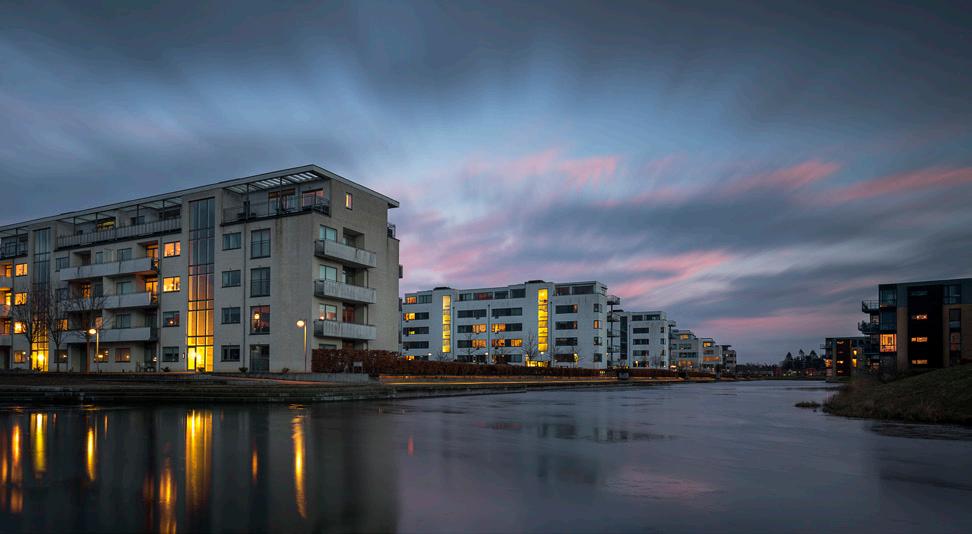
24 Annual report 2023| Energy for the future
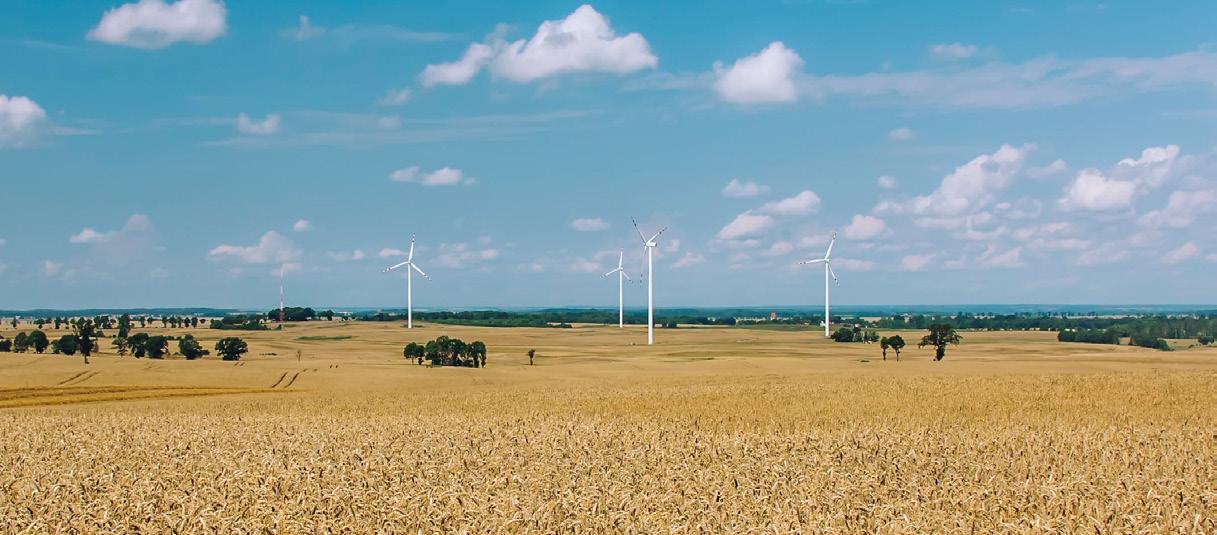
A historical focus on energy efficiency, a move to renewable energy and a transition with local acceptance at its centre have driven the Danish transition.”
Elusive sector coupling has to become a reality
By Torsten Hasforth, Chief Economist, CONCITO’s analysis team
The Danish utility sector has been at the forefront of the green transition for many years. There has been a significant transition in Danish electricity, heating and water supply. It has been the flag bearer when we have prided ourselves on our role as a pioneer country in the green transition.
A historical focus on energy efficiency, a move to renewable energy and a transition with local acceptance at its centre have driven the Danish transition. This is praiseworthy, and the result of a lot of hard work. But more hard work will be needed in the coming years if the utility sector is to continue to do well. A utility sector that must continue to advance the green transition in a way that makes it clear to consumers that the sector is part of the solution.
But the future solutions are not simple. Increasing decentralisation of the utility sector will require greater
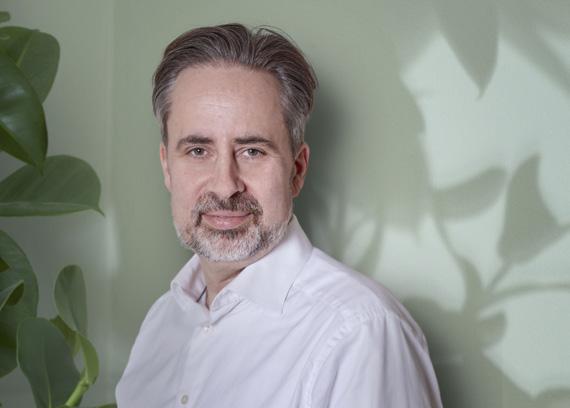
flexibility and resource awareness. Green investments are also far from complete in the sector. Biomass is only a stepping stone towards much more extensive electrification. Storage will also have to become much more widespread. The elusive sector coupling has to become a reality. Customers’ energy consumption must begin to actively interact with the system they are a part of. Their consumption must be responsive, whether consciously or unconsciously. Much work lies ahead for the Danish utility sector.
25 Annual report 2023 Energy for the future |
Strategic focus areas
Verdo’s must-win battles ensured focus and momentum in 2023
Verdo’s three new strategic focus areas – also called mustwin battles – were launched in 2022. Since then, they have been a focal point in the business and were the foundation for several key efforts in the Group in 2023.
HR Director Margrete Larsen, Sustainability Manager Line Risgaard Mortensen and IT Manager Lars Bødskov offer some perspectives from all three areas below.
Verdo’s three must-win battles:
• Must-win battle #1: Competencies and the future workplace
Must-win battle #2: Stronger sustainable development
Must-win battle #3: Digitalisation and data
Physical setting is a clear competition parameter
With must-win battle #1, ‘Competencies and the future workplace’, Verdo aims to ensure that we continue to attract, develop and retain the right competencies in an attractive working environment.
HR Director Margrete Larsen believes it is the combination of all our efforts – small and large – that make Verdo an
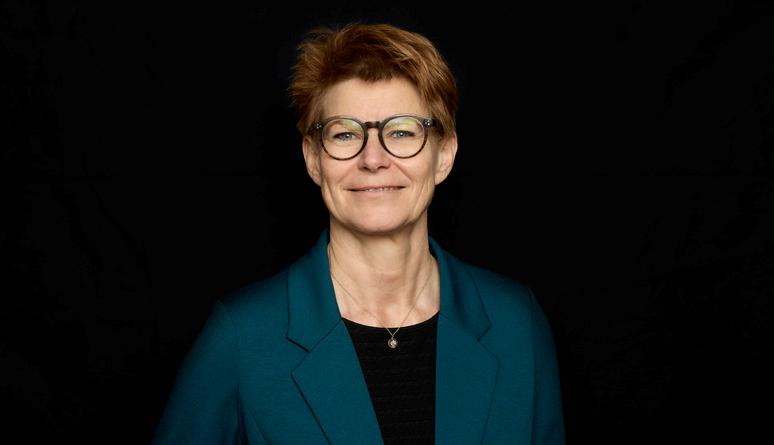
attractive and sought-after workplace. Many steps were taken in 2023, and Margrete Larsen particularly highlights the rethinking of our work setting.
“The physical setting is a clear competition parameter. We therefore put a lot of resources into reorganising the existing setting and upgrading the canteen at the head office in Randers, and into designing our future premises in Aalborg to match the way we work today and will work in the future," says Margrete Larsen.
She also notes the establishment of a trainee programme for traders, a new mentoring scheme, and mapping competencies for key employees as important initiatives last year.
Margrete Larsen reports that many more new initiatives will be launched in 2024, for example in relation to diversity and compliance with the new Danish act on registration of working hours, which comes into effect on 1 July. The HR director also predicts that there will be greater focus on strengthening existing initiatives.
“After seeing a large influx of new employees over the past several years, especially in Verdo Energy System and Verdo Varme, 2024 will be a year of consolidation, where we focus on creating a robust organisation.”
Materiality is material at Verdo
An accelerated green transition places even greater demands on companies – today and in the future. That is why we have made ‘Stronger sustainable development’ a strategic focus area at Verdo.
One of the elements in must-win battle #2 has been to define our materialities. This will help us to focus our efforts where they have the greatest effect. At the same time, Verdo has to comply with the requirements in the EU’s Corporate Sustainability Reporting Directive (CSRD) on double materiality reporting, which will enter into force for the 2025 financial year.
We therefore performed our first double materiality assessment in 2023. The purpose was to test the method and process, and create a data foundation that we can continue to
26 Annual report 2023
Margrete Larsen, HR Director at Verdo
| Strategic focus areas
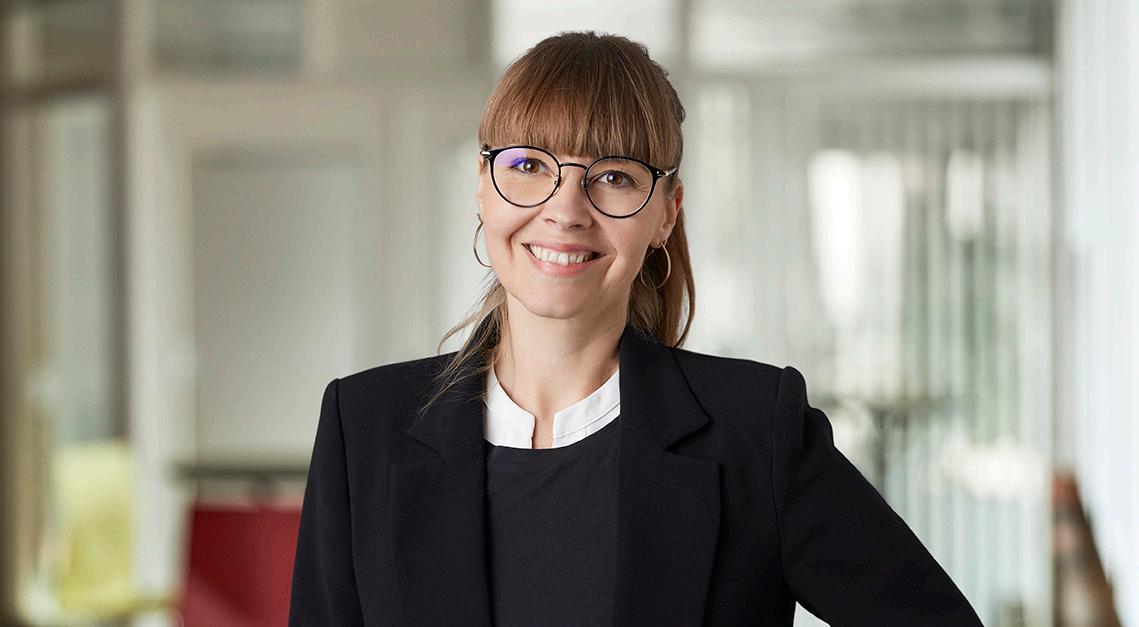
work with. Group Management’s three new selected metrics were ‘Waste generated from operations’, ‘Business travel’ and ‘Employee commuting in own vehicle’. The results of the analysis are presented in the ESG part of this report.
Sustainability Manager Line Risgaard Mortensen is pleased that Verdo has started on this work.
“The process has shown us how involved the work with double materiality is. Great complexity is associated with both identifying the relevant factors and obtaining data, which is very time and resource-intensive,” says Line Risgaard Mortensen. However, she is convinced that it is worth the effort.
“We have emerged stronger from the process and now take a more systematic approach to working with data and materiality. As a result, we are ready to include more metrics in 2024, thereby getting an even more complete picture of Verdo’s total environmental impact,” she says.
A solid digital foundation was built in 2023
‘Digitalisation and data’ is Verdo’s must-win battle #3, as strategically we want to accelerate Verdo’s digital transformation. This means that we must become a data-driven organisation by 2025 that creates more digital customer experiences.
However, this requires a digital foundation, and building this has been a strong focus of Verdo’s strategic IT priorities and initiatives in 2023. We have established a common data platform that we use to collect, organise, store and process our data. We have gone live with D365 in several of our
divisions, and we are working on a new billing system, which we expect to be ready in early 2025.
Verdo’s core business is critical infrastructure. IT security is therefore a cornerstone of our digital foundation. We had a targeted focus on improving IT security in 2023. We have added more competencies in this area and launched initiatives to ensure we are better equipped to withstand cyber threats and attacks.
“Verdo is covered by the NIS2 directive, which enters into force on 17 October 2024, and this has further accelerated our work with IT security. We are closely following Danish implementation of the directive and are already well on our way to meeting the requirements. We are thus on a completely different level than before,” says IT Manager Lars Bødskov.
In addition to our focus on IT security, Verdo has been working with AI. We have created our own Verdo GPT platform – a language model we control ourselves. This means that we can ask it both personal and businesssensitive questions, as the model is not trained on this data and therefore does not share it with the outside world. The next step is to build dedicated and specific AI models on top of our own Verdo GPT, so these can be used for specific purposes such as customer service, HR support, IT support, help with answering emails and help with bidding on tenders.

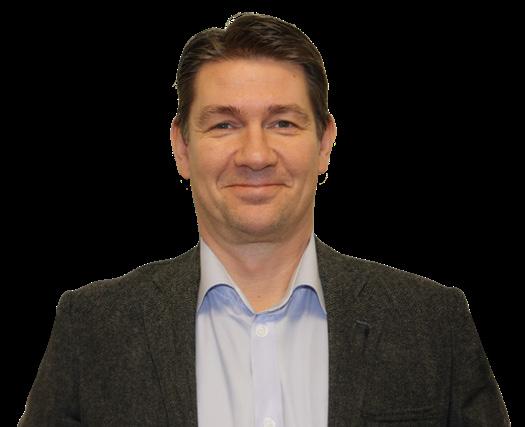
27 Annual report 2023
Lars Bødskov, IT Manager at Verdo
Line Risgaard Mortensen, Head of Sustainability at Verdo
Strategic focus areas |
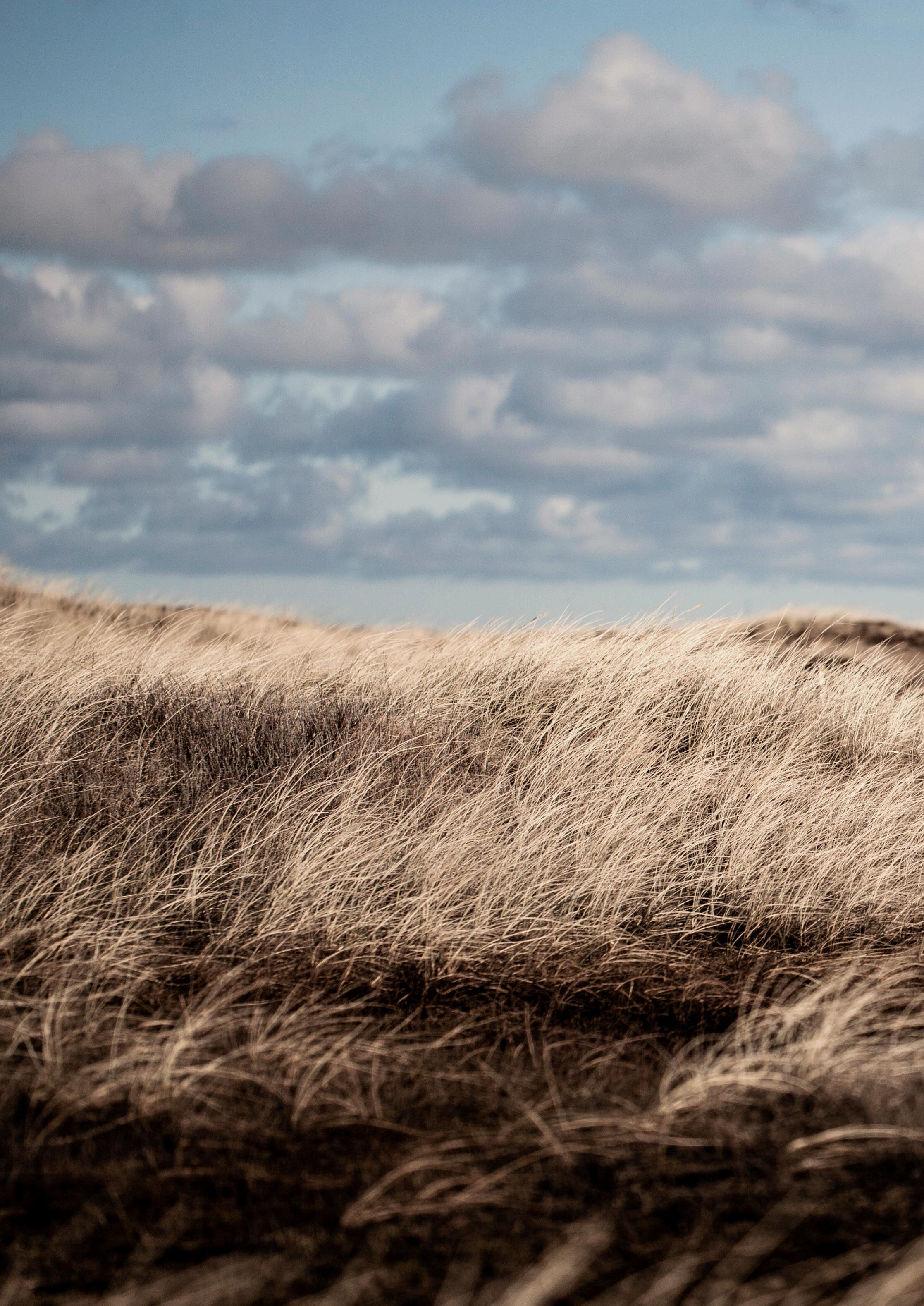
Verdo Group companies and structure

Verdo a.m.b.a.
Verdo Holding A/S
Energi & Forsyning
Verdo Varme A/S
Verdo Herning A/S
Verdo Varme Herning A/S
Verdo Produktion A/S
Verdo Vand A/S
EL-NET Kongerslev A/S
Verdo Forsyningsservice A/S
Verdo
A/S Carbon Partners AS
Energy Systems A/S
Verdo Energy Systems sp. z.o.o.
Verdo Teknik A/S
Go Green A/S Teknik
Note: Verdo Innovation A/S and Verdo Energy Systems GL ApS were liquidated in March 2024 and are therefore not shown in the overview.
Trading Carbon Partners Inc.
Energy
Trading
Verdo
Verdo
Elsalg
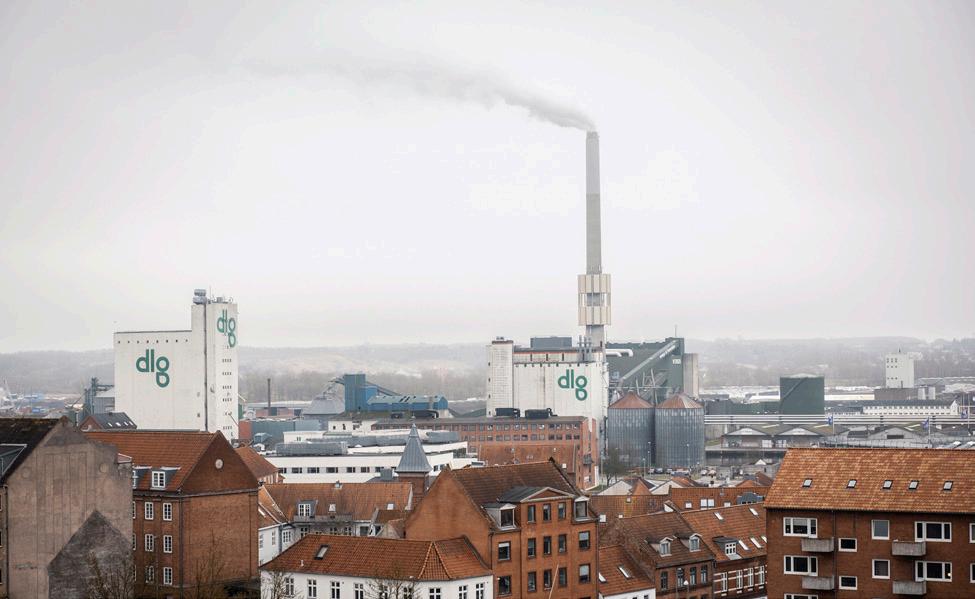
Update on historical cases
In its role as a utility company, Verdo receives a number of enquiries each year from the various authorities and regulators overseeing electricity, water and heating utilities. This is a natural part of daily operations for the Group’s supply activities and of the general oversight that all companies in the energy sector are subject to. At Verdo, we also see it as a way of ensuring that the Group’s prices for electricity, water and heating comply with the legislation and frameworks that utilities are subject to.
The historical cases concerning which Verdo was in dialogue with the Danish Utility Regulator for a number of years are cases that go beyond these general enquiries. There have been no new enquiries in 2023, but we remain engaged in constructive and open dialogue with the authorities concerning the ongoing cases, which we wish to see concluded as soon as possible*.
In 2023, Verdo continued to repay amounts that had previously been overcharged, and we expect to have completed repayments for resolved cases in 2025, ahead of the time frame set by the Danish Utility Regulator. We are still waiting for the Danish Utility Regulator to process a few outstanding historical cases*. However, most of the cases have been closed.
* Please see note 1 of the financial statements for further information on ongoing cases.
The following cases were decided during 2023:
Tax collected in price demonstration
In March 2023, the Danish Utility Regulator reported its decision in the cases concerning tax collected in the price demonstration. The case was an offshoot of the previous cases concerning unapproved return on investment in Verdo Varme A/S and Verdo Produktion A/S. They assess whether the tax on the approved return is a necessary cost and can thus be included in the price demonstration.
In its decision, the Danish Utility Regulator found that tax on the unapproved return is not a necessary cost, and that the tax included in the price demonstration in the 2012-2017 period for Verdo Varme A/S, and 2010-2017 for Verdo Produktion A/S, cannot be included in the price demonstration. It was thus decided that Verdo Varme A/S must repay DKK 56 million to consumers, while Verdo Produktion A/S must repay DKK 9 million to consumers. A provision for these repayments was recognised in the consolidated financial statements for 2022. They therefore did not affect earnings in 2023. We expect to complete these repayments in 2024.
30 Annual report 2023 | Update on historical cases
Equity Solvency ratio
31 Annual report 2023 408,803 907,293 235,120 130,123 901,791 29.6% -17,900 -23.8% -68.2% -0.6%
Revenue EBITDA
2.7 percentage points
year All amounts are stated in DKK ‘000 and before discontinuing operations. Financial highlights have been calculated after adjustment for special items. No special items are recognised in the Group’s financial statements for 2023. 3,971,435 2023 2023 2023 2023 2023 5,423,823 2022 2022 2022 2022 2022 5,488,854 Adjusted 473,834 300,151 Adjusted Adjusted 32.3%
Net profit/loss from continuing operations for the
Results for 2023 must be viewed against backdrop of 2022 to see both sides of the energy crisis
By Kenneth R. H. Jeppesen, CFO of Verdo
A review of the year just passed
While 2022 saw a series of extreme events that led to the energy crisis and increases in energy and raw material prices, 2023 was a very different year. While prices rose steadily up to Q4 2022, they have been falling ever since. And where inflation was soaring in 2022, it cooled off during 2023. But in many ways the two years should be viewed together, to see both sides of the energy crisis in play.
The fact that electricity prices continued to fall during 2023 has had a particularly large impact on Verdo. This had a negative impact on Verdo Go Green A/S and Verdo Produktion A/S – both revenue and profit. The falling prices for fuel and raw materials also impacted Verdo Trading A/S, which began 2023 with stocks of commodities that were bought at high prices in 2022, but had to be sold in 2023 after significant price drops. This impacted both revenue and profit.
Earnings
Verdo’s earnings are, of course, influenced by the world around us. Declining energy and raw material prices led to a significant decrease in revenue, to DKK 4 billion, while operating profit (EBITDA) was DKK 130 million. Both are significantly lower than the record year of 2022, and also significantly below budget.
Earnings after tax for the year were DKK -17.9 million. This result, which reflects the fact that virtually every division had a difficult year in 2023, is not satisfactory.
General drop in energy prices affected all divisions
Falling prices for fuels and other energy sources made their mark across the Group’s divisions last year. They were particularly felt in Verdo Go Green A/S, the Group’s electricity trading company, and in the Trading division. Despite positive earnings overall for the Trading division, these were significantly lower than expected due to weak demand and lower prices for wood pellets. The price drop hit Verdo Trading A/S hard, as stocks had been purchased to service the company’s many customers at a time when the price and demand for wood pellets were both high. Both fell again during 2023, and some products had to be sold at a loss.
When electricity prices dropped in early 2023, many Verdo Go Green A/S customers switched from products with fixed quarterly prices to ones with variable hourly rates. This meant that the company had to sell electricity at the lower variable price instead of at the much higher prices realised when the company hedged its electricity purchases. However, the situation stabilised from the start of Q2. Verdo Go Green A/S performed satisfactorily from then on.
Verdo Produktion A/S was not significantly impacted by the fall in electricity prices early in the year. Since Q1 usually has the largest volume of electricity generation, it is also the quarter with the greatest earnings. Despite lower-thanexpected earnings from electricity production in Q4, our CHP plant in Randers thus posted satisfactory results for the year.
With many orders in the pipeline, Verdo Energy Systems A/S was expected to see a high level of revenue in 2023. Revenue met expectations, at more than double the 2022 level. However, the company experienced challenges in first having to find qualified labour to fill positions, and then integrate the many new employees into the organisation. In addition, several projects were delayed. The company therefore only achieved a modest operating profit (EBITDA), but profitability is expected to improve in 2024 based on revenue expectedly on par with 2023.
Despite higher revenue in 2023 than in the previous year, Verdo Teknik A/S did not manage to achieve satisfactory earnings. The company has faced challenges in relation to order inflow and efficiency, in part because the municipalities still do not have much money for street lighting and traffic light projects.
The balance sheet total is down, largely due to a decrease in capital tied up in stocks and receivables, i.e. working capital. Given that equity is virtually unchanged, this means that the Group’s solvency ratio has risen to 32.3% and is now very close to our long-term goal of 35%.
32 Annual report 2023 | Results for 2023 must be viewed against the backdrop of 2022 to see both sides of the energy crisis
The fact that electricity prices continued to fall during 2023 has had a particularly large impact on Verdo.”
Commercial and regulated business
Operating profit (EBITDA) in Energi & Forsyning – i.e. in the Group’s regulated areas – came to DKK 217 million, while the commercial areas – Trading, Energy, Teknik and Elsalg –posted a loss of DKK -43 million overall. Verdo Holding A/S and parent company, Verdo a.m.b.a., ended the year with an operating loss of DKK -44 million.
The solvency ratio for the regulated companies is 29.81, while it is 52.53 for the commercial companies (which are subject to competition), when including Verdo Holding.
No new heating cases
There were no new cases or enquiries from the utility authorities in 2023, and no decision been made regarding return on investment before 2010 in Verdo Produktion A/S. However, discussions are still ongoing with the Danish Utility Regulator regarding the ‘output model’ for Verdo Produktion A/S.
We are pleased that the other authorities found no basis for proceeding with the accusations brought against the Verdo Group years ago by a number of citizens in Randers. This also brings an end to this matter, as the State Prosecutor’s decision is final and cannot be appealed.
Uncertainty regarding recognition
Return on invested capital in the 2000-2009 period
In 2021, while the Group’s production company was investigating similar matters relating to the 2000-2009 period, indications were found that Verdo Produktion A/S had recognised a return on invested capital of up to DKK 69 million during the period. It has not been possible to identify a direct legal basis for recognising this return, and discussions have been initiated with the Danish Utility Regulator concerning the matter.
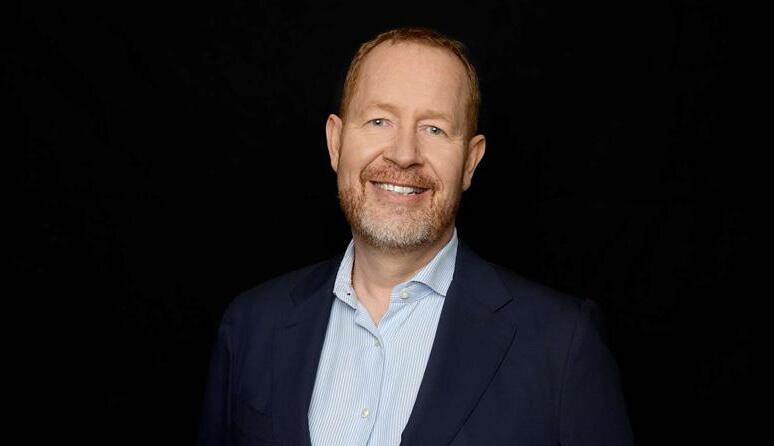
Discussions continued during 2023, but it is still not possible to know when they will be concluded. Verdo Produktion A/S is therefore still recognising a provision corresponding to the entire return identified.
Interest on loans with external mortgage credit institutions
The Group received questions from the Danish Utility Regulator in 2022 regarding the inclusion of interest in price demonstrations in the Group’s production company. The discussions concern interest on loans taken out by Verdo Produktion A/S with external credit institutions, as a result of a change in practice in the calculation of interest in the price demonstration in 2018.
The Verdo Group deems that the change in the practice of Verdo Produktion A/S is correct, and that the interest can be seen as a necessary cost and thus included on a pro rata basis according to the share of heat production. Our discussions with the Danish Utility Regulator in 2023 have not made it possible at this stage to assess the potential accounting implications, or when the discussions are expected to be concluded. The recognition has therefore still not been made.
Output model
The Danish Utility Regulator contacted Verdo Produktion A/S in 2021 about the sector’s usual method for allocating costs between electricity production and heat production –also called the ‘output model’.
Verdo Produktion A/S is in dialogue with the Danish Utility Regulator about the use of the model. The discussions in 2023 have not made it possible at this stage to assess the potential financial consequences of this enquiry.
33 Annual report 2023 Results for 2023 must be viewed against the backdrop of 2022 to see both sides of the energy crisis |
>
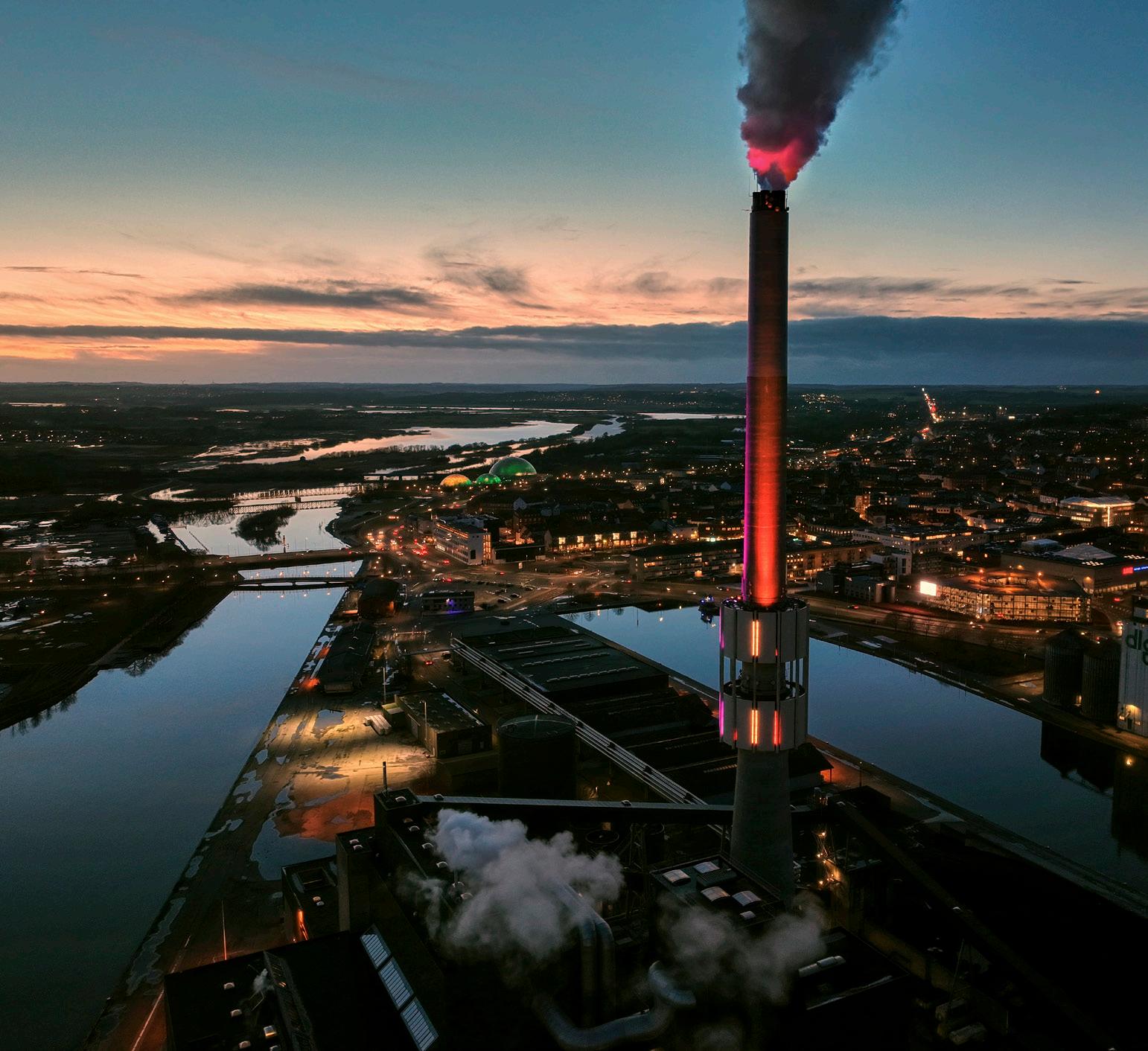
Expectations for 2024
Signs are that we will continue to see greater uncertainty in the coming years than we have been used to in the past. The energy crisis may be over, but we are seeing much greater volatility in energy markets than before. The same applies to interest rates, where it appears that the expected interest rate cuts will be postponed. We are also seeing greater volatility than before in the interest rate markets.
Despite this year’s financial results, Verdo is in a strong position to meet these challenges. Liquidity is strong based on a cash flow of DKK 79 million from the Group’s primary operations. Cash flow will increase in the coming years when the repayments to heating customers are expected to be completed. Financial gearing (earnings to interest-
bearing debt ratio) is 2.4, which is very satisfactory and well within our target of being below 5. As mentioned above, the solvency ratio is rising.
The energy markets have been relatively calm since the end of the financial year, although with a slight downward trend. As mentioned earlier, this has a negative impact on the Verdo Group. We expect earnings to be around zero in 2024, but this depends greatly on what happens to electricity prices.
Overall, the earnings for the year are not satisfactory, but our key figures remain strong, and with good cash flow generation, Verdo is well-positioned to continue the ‘StepTogether’ strategy in the coming years.
34 Annual report 2023
| Results for 2023 must be viewed against the backdrop of 2022 to see both sides of the energy crisis
Calculation of ratios Ratios have been calculated based on CFA Society Denmark’s recommendations, and definitions are stated in the accounting policies.
35 Annual report 2023 FINANCIAL
2023 DKK ‘000 2022 DKK ‘000 2021 DKK ‘000 2020 DKK ‘000 2019 DKK ‘000 EARNINGS Annual revenue 3,971,435 5,489,652 2,971,906 2,347,640 3,106,900 Revenue 3,971,435 5,424,621 2,909,931 2,437,610 2,615,643 EBITDA 130,122 408,803 151,309 83,254 98,643 Operating profit -12,551 271,977 19,873 -376,858 -270,799 Net financials -23,649 -21,557 -35,683 -27,724 -19,698 Profit/loss from continuing operations before tax -36,200 250,420 -15,810 -404,582 -290,497 Net profit/loss for the year -17,900 238,156 158,917 -407,565 -267,772 BALANCE SHEET Total assets 2,790,892 3,065,700 3,207,660 2,837,911 3,301,382 Investments in property, plant and equipment 157,505 153,671 142,991 193,431 144,931 Equity 901,791 907,293 822,171 571,941 970,432 LIQUIDITY Net cash flow from: Operations 44,583 308,322 -119,955 227,666 -85,486 Investments -166,056 196,554 -118,847 -196,252 217,869 Financing/repayments -32,083 -36,599 -48,277 -44,004 -32,467 Net change in cash and cash equivalents -153,556 468,277 -287,079 -12,590 99,916 RATIOS Gross margin 17.2% 16.2% 20.0% 20.6% 4.8% Gross margin, adjusted 17.2% 16.0% 19.6% 17.5% 4.8% EBITDA margin 3.3% 7.5% 5.2% 3.4% 3.8% EBITDA margin, adjusted 3.3% 8.6% 7.4% 1.7% 3.8% Financial gearing 2.4 0.5 4.6 5.0 4.5 Financial gearing, adjusted 2.4 0.4 3.2 - 4.5 Return on equity -2.0% 27.5% 22.8% -52.8% -23.8% Return on equity, adjusted -2.0% 34.7% 13.6% -16.7% -23.8% Solvency ratio 32.3% 29.6% 25.6% 20.2% 29.4%
HIGHLIGHTS
Financial highlights |

Business areas in the Verdo Group
36 Annual report 2023
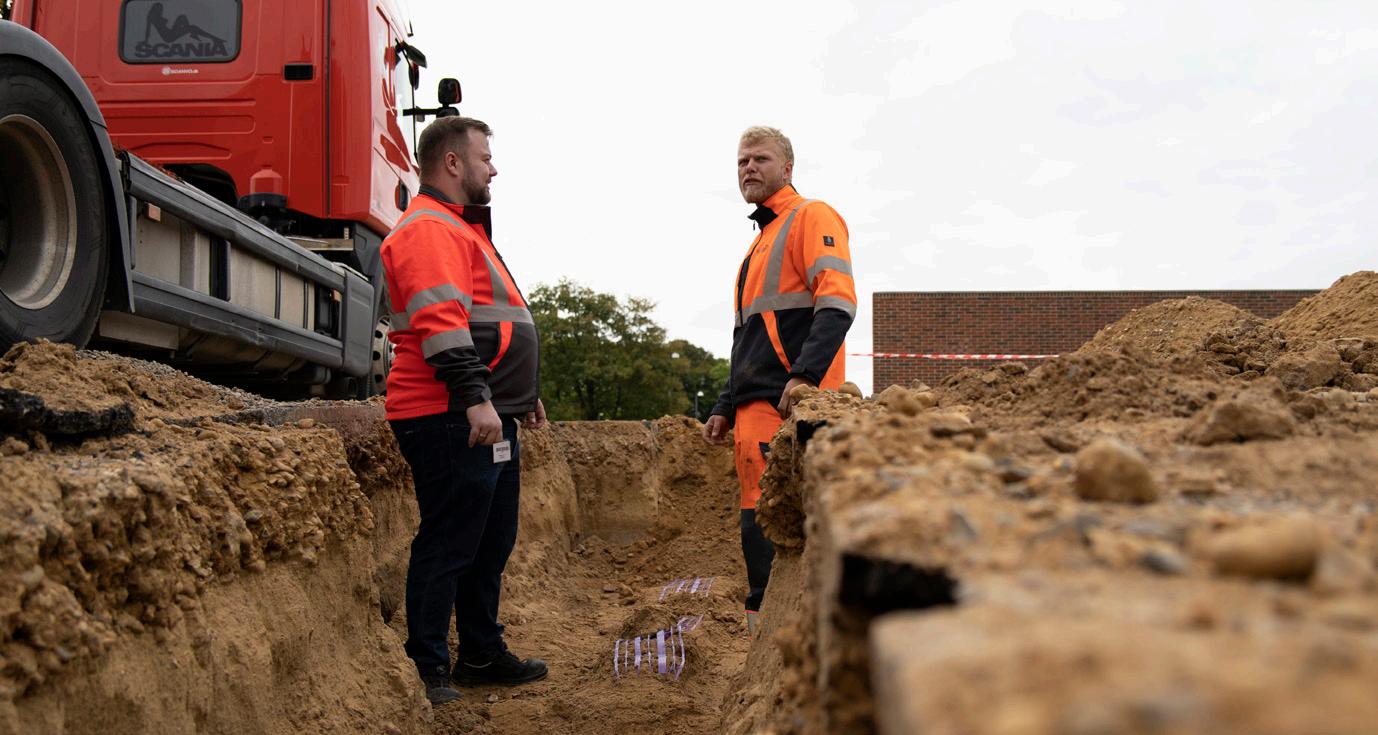
Energi & Forsyning
The Energi & Forsyning division is made up of Verdo Varme A/S, Verdo Varme Herning A/S, Verdo Produktion A/S, Verdo Vand A/S, Verdo Forsyningsservice A/S and EL-NET Kongerslev A/S.
Energi & Forsyning supplies clean drinking water to around 13,000 households in Randers, and district heating based on certified biomass to around 38,000 households in Herning and 38,000 households in Randers. The division also connects around 870 households in Kongerslev to the electricity grid.
2023 was generally characterised by high levels of activity in the division. But the aftermath of the 2022 energy crisis also clearly impacted the year in several ways. In relation to district heating, the effect was positive. We are still seeing many new connections and conversions from gas and oil-fired boilers, even though gas prices have been significantly lower than in the previous year. However, the energy crisis also led to major price increases that impacted a broad range of the division’s activities in 2023 – such as investments in cables and pipes, and welding and excavation contracts. Above all, the energy crisis has resulted in a generally lower price level for electricity. Despite this, Energi & Forsyning posted a profit of DKK 109,473 million.
Last year, we further accelerated our targeted efforts on planning Energy of the Future in Randers and Herning, as the existing power plants in both cities are expected to be
phased out between 2034 and 2036. Based on the many analyses that precede the concrete development work, we can now begin to form a picture of what needs to happen in Randers and Herning in order to ensure efficient, secure, affordable and green district heating supplies in the future.
Verdo’s Supervisory Board has made the first major investment decision towards this end, concerning a 10,000 m3 heat storage tank in Randers. We will be investing in more heat pumps and electric boilers, and we continue to view the possibilities for district cooling positively. We are also looking into the possibility of establishing renewable energy parks.
Verdo Varme A/S
In Randers, 2023 was another good year for the district heating roll-out and saw the connection of a further 498 households and 66,000 m2 of commercial floor space. Of the 498 households, 97 are new homes and 35 are commercial, while 366 are conversions (mainly from natural gas or oil).
• Almost all the surrounding towns have traditionally used natural gas for heating, and so most people are welcoming the opportunity to convert to district heating. The figures for 2023 show that up to 90% of homeowners in the areas that have been connected to district heating have chosen to replace their oil or
37 Annual report 2023 Business areas – Energi & Forsyning |
>
gas boiler with district heating. In Neder Hornbæk and Over Hornbæk in west Randers, 90% and 82% of all households, respectively, have waved goodbye to fossil fuels. In Romalt, south of Randers, 77% of all properties using oil and gas have so far been converted to district heating, and more are on the way.
We are hoping for a similarly high uptake in Stevnstrup and Harridslev. Advance registrations already stand at around 60% of households, and the number is likely to increase as the roll-out gets underway.*
• High security of supply and stable operations are always key goals for Verdo Varme A/S. We therefore rectified a record number of faults in the district heating system in both Randers and Herning in 2023, including alarm faults. This reflects our proactive approach to avoiding possible breakdowns. In addition to benefiting customers, it is also good for the green transition.
• The district heating price in Randers dropped slightly in 2023 compared to 2022. In mid-2023, we reduced the heating price for a ‘standard house’ – the Danish Energy Agency’s definition of a house, 130 m2 in size with annual consumption of 18,100 kWh – from DKK 14,083 to DKK 11,993 per year (incl. subscription, contribution and VAT), a drop of DKK 2,090. From 1 January 2024 we have again reduced the heating price in Randers – from DKK 11,993 to DKK 11,251 per year, a saving of DKK 742.
District heating connections in rolled-out areas – Randers
*The calculations show houses that have a water-based heating system.
We expect to see a large number of district heating connections in Randers in 2024. Verdo’s Board of Directors approved the takeover of a local district heating project from Assentoft Forsyning at the beginning of 2024, under which a total of 1,750 households in Assentoft have the opportunity to connect to district heating. This further reinforces the trend. We will begin to establish the district heating infrastructure in Assentoft in 2024, and expect to be able to connect the first residents in spring 2025.
• Between 2023 and 2025, Verdo will establish a new 10,000 m3 heat storage tank in Randers. Once completed, the tank will be able to store large quantities of heat for district heating, produced using renewable energy from our CHP plant and also from other renewable energy sources in the future. The tank will also enable us to increase our electricity revenue from the CHP plant. The heat storage tank will help reduce the use of oil and gas, so that a larger proportion of the electricity generation in Denmark is based on certified biomass. This is particularly important for security of supply during periods when electricity demand is high, when sunshine and wind are in short supply and electricity prices are high. The new heat storage tank will thus make a significant contribution to the green transition.
38 Annual report 2023
100.00% 90% 80% 70% 60% 50% 40% 30% 20% 10% 0% All From NG/Oil All From NG/Oil Neder Hornbæk Over Hornbæk
233 224 466 454 Connected to DH Not connected | Business areas – Energi & Forsyning
Verdo Varme Herning A/S
• Verdo connected a total of 240 new district heating customers in Herning in 2023. Of the 240 new customers, 196 are new homes, 10 are commercial (corresponding to 4,000 m2 of commercial floor space), and 34 are conversions (typically from natural gas or oil). The figures for Herning are much lower than for Randers because there is virtually no natural gas used for heating in Herning, so the potential is more limited.
Verdo lowered heating prices in Herning significantly last year, primarily due to falling oil and gas prices on the global energy market. However, between 1 January and 1 June 2023, the heating price for a ‘standard house’ –the Danish Energy Agency’s definition of a house with annual consumption of 18,100 kWh – was relatively high at DKK 17,959 per year. The relatively high price was due to a three-month overhaul of Herning CHP plant during summer 2023, during which Ørsted carried out planned maintenance. Verdo’s peak and reserve load stations therefore had to be put into operation to ensure enough heating supply for customers. The plant was shut down again for a further two weeks or so during autumn, when Herning CHP plant’s turbine was reconnected. We lowered the heating price on 1 June 2023 to DKK 13,900 per year due to a drop in oil and natural gas prices, and again on 1 January 2024 to DKK 13,315 per year for a standard house. The lower heating price in 2024 is due to the completion of the long overhaul of Herning CHP plant, which means that we have returned to normal operations.
RATIOS: Energi & Forsyning
The table covers:
Verdo Produktion A/S, Verdo Varme A/S, Verdo Herning A/S, Verdo Varme Herning A/S, Verdo Vand A/S, El-NET Kongerslev A/S and Verdo Forsyningsservice A/S.
• We ran a campaign in Herning during the summer offering homeowners in single-family houses and townhouses using heating sources other than district heating the chance to be connected to the district heating network at half price. The aim was to speed up the green transition in Herning Municipality. There were around 350 properties not heated by district heating within the supply area, and 13 of these were converted during the campaign. The relatively low number of conversions was mainly due to the fact that gas prices were low at the time, and the incentive to convert to district heating was not as strong as it had been when gas prices were at their peak.
• Verdo Varme Herning A/S completed the construction of a new heat exchange plant at the regional hospital in Gødstrup in 2023. When the new plant became operational, it was possible to decommission an oil-fired boiler which had previously heated the hospital hotel. The hotel is now heated using green district heating. The heating plant is also necessary in order for Verdo to supply the many upcoming developments south of the new regional hospital.
• In 2023 we also completed the remote meter reading project begun in 2022 in Herning, as a joint collaboration between Verdo and Herning Vand, whereby Verdo leases Herning Vand’s network to transport data from remotely read heating meters.
Around 8,500 district heating meters were replaced in connection with the remote meter reading project, and a further 8,000 were fitted with a new module that will allow data to be sent via Herning Vand’s network in the future. The rest of the district heating meters were already ready to communicate in this manner. Verdo established ten new antenna sites for data collection, and entered into an agreement with Herning Vand to use their existing network. It is now possible to remotely read all Verdo’s 21,700 district heating meters in Herning.
39 Annual report 2023
Business areas – Energi & Forsyning |
2023 2022 Revenue 1,187,602 1,104,021 EBITDA 217,325 294,621 Net profit/loss for the year 109,473 168,392 Investments 128,094 130,114 Equity 654,998 566,568
All figures in DKK ‘000
Vand and Digital Forsyning
Verdo Vand A/S worked throughout 2023 to ensure security of supply and water quality remain high in the Randers area, and a final investment decision was made regarding a new spring site and new waterworks.
• The ‘New waterworks’ project, which will replace the two existing waterworks in Bunkedal and Østrup Skov, required a lot of resources in 2023 and took longer than expected. This added to the cost of the project in terms of both capital investment and consultant fees. We have set ourselves the goal of reducing energy consumption at the waterworks and meeting the consumption that remains using renewable energy. Plans for afforestation near the waterworks have been included as part of efforts to improve groundwater protection.
• The ‘New spring site’ project has also been delayed, as no exploratory drilling has yet been permitted. This has created uncertainty about the time schedule and budget. The new spring site will be established northeast of Randers and will replace Oust Mølle. Afforestation is also planned here. The investments in the new waterworks and new spring site will total more than DKK 60 million. The waterworks is expected to be ready some time in 2026, while the plan is to expand the spring site over a number of years.
• We have intensified discussions with the waterworks that we work with and work for – Dronningborg and Strømmen. This collaboration provides great value for all parties.
Downtime for customers over the year
• After eight years of lower water bills in Randers, it was decided at the end of 2023 to raise water prices by DKK 50 per month from 1 January 2024. The unusually low water prices were mainly due to an old water tariff case, under which Verdo Vand A/S was ordered at the time to repay interest to customers that had been levied without a legal basis. This repayment has now been completed, and the price can return to the normal level.
• General uncertainties remain about the coming regulation of the water sector (drinking water and wastewater). However, the sector associations and legislators have now agreed to set up a joint committee of experts, to wipe the slate clean and start over on what will hopefully be simpler and more transparent regulation. It is expected to take a few years before new regulations are in place.
Revenue in Verdo Vand A/S was below budget in 2023, due to lower-than-expected water sales. However, capacity costs were also lower than budgeted, due to higher-than-expected construction activity.
We expect the planning foundation for the new waterworks to be finalised in 2024, and for the tender process for construction to be completed. Construction is not expected to begin until 2025. We also expect to carry out the first exploratory drilling at the spring site north/northeast of Randers, which will be replacing the Oust Mølle spring site over the next five years. Several initiatives are also being launched under the new groundwater protection strategy, including land
The figure shows the downtime for Verdo’s water customers over the year. It is Verdo’s aim that our water customers should experience as few and as brief interruptions to supply as possible. The goal is to have an average uptime per household of 99.9993%.
40 Annual report 2023
400,000 350,000 300,000 250,000 200,000 150,000 100,000 50,000 0 Jan-23 Feb-23 Mar-23 Apr-23 May-23 Jun-23 Jul-23 Aug-23 Sep-23 Oct-23 Nov-23 Dec-23 Planned 68,560 690,040 114,760 125,260 132,430 138,870 142,380 189,990 190,350 195,820 239,450 246,420 Unplanned 2,730 2,730 5,610 8,790 29,650 39,330 43,530 90,900 120,020 120,020 189,950 213,100 Goals – planned 31,684 63,367 95,051 126,734 158,418 190,102 221,785 253,469 285,152 316,836 348,520 380,203 Goals – unplanned 29,246 58,493 87,739 116,986 146,232 175,478 204,725 233,971 263,218 292,464 321,710 350,957
| Business areas – Energi & Forsyning Minutes
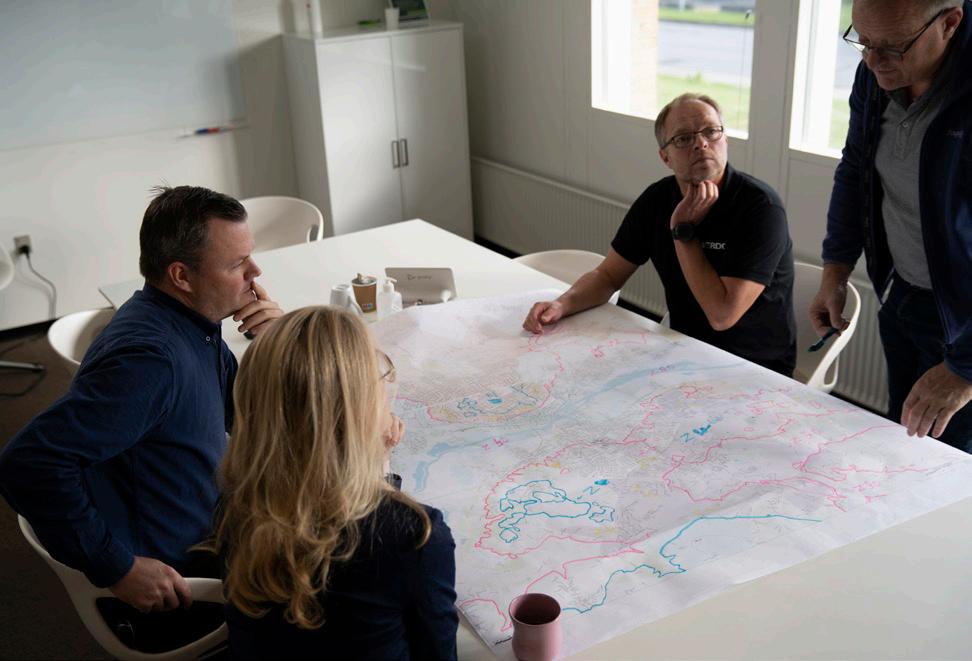
acquisition, agreements on changed cultivation practices with landowners, afforestation and groundwater parks.
Digital Forsyning (Verdo Forsyningsservice A/S) expanded its resource pool in 2023 and completed a lot of work on digitalisation, focusing particularly on streamlining and digitalising internal processes. We will accelerate the digitalisation of processes that directly benefit customers in 2024.
• We accelerated the establishment of a data platform last year that will serve as the strategic tool for digitalisation and better data utilisation in Energi & Forsyning and throughout Verdo.
• There is rising interest in data collaboration, and we have initiated joint collaboration on a common data platform for presenting consumption data with the other heating companies in the ‘six-town collaboration’. The project is headed by the Danish District Heating Association, and is expected to be finally scoped and perhaps even
Facts:
Verdo Water extracts approx. 2.5 million m3 of water annually and supplies around 50% of the water in Randers Municipality. Roughly 13,000 properties in Randers currently receive water from Verdo.
executed in 2024. The common data platform aims to provide easier access to data for third parties such as businesses and research institutions, so they can develop new solutions that benefit end-customers.
On the same note, we developed a new text messaging service in 2023 that alerts customers to water leaks. This is possible due to new digital water meters which can send an alert if a customer’s water installation begins to leak or is ruptured. Verdo registers up to 250 leaks and ruptures in customer installations each year, so the text message alert is an important step in our digital journey and an example of how digital solutions can benefit customers more and more. In this case by reducing water leaks and the associated costs.
We expect to roll out a digital roadmap in 2024 which will give Verdo a better overview of priorities and resources internally, ensuring faster execution and greater value.
41 Annual report 2023
Business areas – Energi & Forsyning |
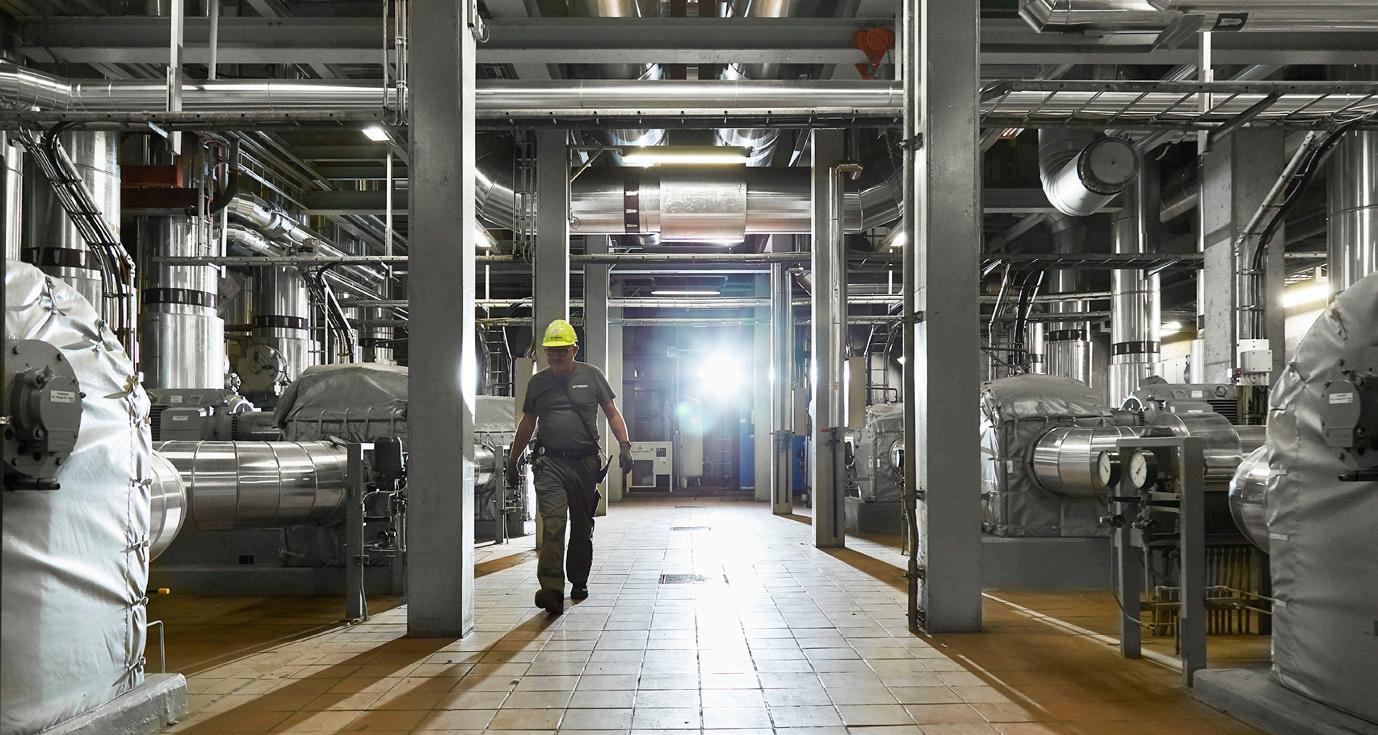
Production
Verdo Produktion A/S continued in 2023 to experience the after effects of the 2022 energy crisis, in the form of high prices for electricity and fuels early in the year. However, the market gradually began to normalise, leading to a general decline in prices. There has been increasing volatility in the electricity market, with many hours with high prices and many hours with correspondingly low prices. Prices have generally been very dependent on wind and solar power during the summer months.
• The volatility ofelectricity prices places high demands on production planning at the CHP plant, and adds significantly to the complexity of electricity and district heating production. The plant has to be utilised differently with production being ramped up and down much more often, sometimes at 30 and 60-minute intervals. We believe we have succeeded in striking a satisfactory balance, whereby the new electricity market not only presents challenges, but also many opportunities.
• We have not yet experienced the full impact of falling fuel prices, as we have been bound by long-term agreements made in a high-price market. Prices have remained at a high level in the freight market for biomass (shipping). This is due to a smaller fleet of ships and high demand for freight.
• Our woodchip storage capacity has been restricted for many years due to lack of space. We have therefore begun to lease the site next to our existing woodchip storage site from the Port of Randers, to ensure the greatest possible security of supply.
We experienced various challenges at the CHP plant in 2023, primarily due to the age of the plant. We had problems with one feedwater pump, and with our large fans for transporting air and flue gas. The latter resulted in less electricity production than budgeted. However, heating production was met using biomass during the period, without using other fuels.
• The biomass subsidy (DKK 150/MWh) will be discontinued in 2024. This will put our earnings under pressure as the marginal price for electricity production will fall. This will mean less electricity production and less earnings from electricity sales. The regulatory and statutory sustainability requirements for biomass are continuously being tightened, and this will put pressure on the biomass market. The focus on carbon emissions and carbon capture and storage (CCS) will also only increase. In 2024, we will therefore start to get an overview of technology and the market for CO2 with assistance from COWI.
42 Annual report 2023
| Business areas – Energi & Forsyning
Examples of fluctuations in the electricity market in 2023
DK1 – DKK/KWH
The graph showsthe high volatility in electricity prices seen on 11 September 2023, when the price fluctuated from DKK 0.83 to just under DKK 4 within a single day.
DK1 – DKK/KWH
The graphshows the reverse scenario one day in 2023 when there was an oversupply of electricity generation that could not be sold to consumers. The electricity price therefore went negative, which means that consumers received payment for their power consumption.
43 Annual report 2023 4.5 4 3.5 3 2.5 2 1.5 1 0.5 0 1 0.5 0 -0.5 -1 -1.5 -2 -2.5 -3 -3.5 11-09-2023 01:00 02:00 03:00 04:00 05:00 06:00 07:00 08:00 09:00 10:00 11:00 12:00 13:00 14:00 15:00 16:00 17:00 18:00 19:00 20:00 21:00 22:00 23:00 02-07-2023 01:00 02:00 03:00 04:00 05:00 06:00 07:00 08:00 09:00 10:00 11:00 12:00 13:00 14:00 15:00 16:00 17:00 18:00 19:00 20:00 21:00 22:00 23:00
DKK DKK Business areas – Energi & Forsyning |
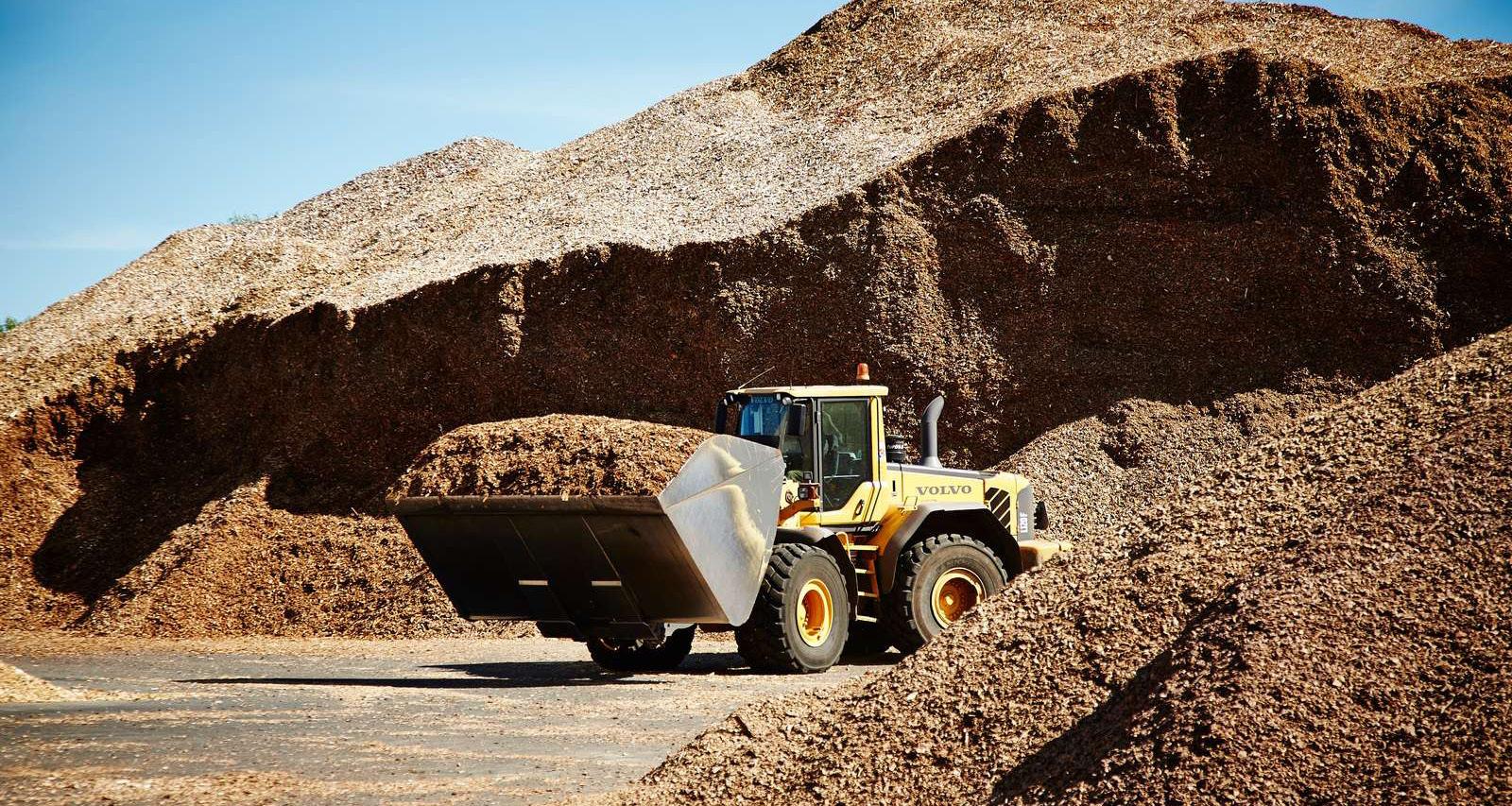
Trading
The Trading division is made up of the Verdo Trading A/S, Carbon Partners AS and Carbon Partners Inc companies. We trade in biomass and alternative fuels as well as in coal for energy production. We are also a market leader in special-purpose coal and coke (carbon products) for metal production and industry in the global market. Customers are primarily dealers and industry and energy sector players who work professionally with heating and energy production. We also have two brands in the wood pellet market – Heatlets and Tietze – which are predominantly sold to the private customer segment.
The Trading division generally experienced a hard landing in 2023 after an exceptionally good 2022 – in relation to coal, wood chips and wood pellets. Price has become the deciding factor in all three markets, and the importance of quality, service and support has been generally waning among customers.
The activity level and trading opportunities have been lower than expected throughout the year. There has been a general reluctance in the market to sign major deals, as customers have feared that the volatility seen in 2022 would continue. Overall, this meant that the Trading division ended 2023 with modest earnings of DKK 1.7 million. However, the market situation has been different for coal, wood chips and wood pellets.
Ꞷ The Trading division performed well in the coal market, despite it being an extremely difficult market during the year, where customers showed a lack of interest in buying and in building up inventories. A
total of only 1,091,491 tonnes of coal was handled in 2023, compared to 1,595,330 tonnes in 2022. Trading handles direct sales of carbon products as well as sales to traders. Direct sales account for around 60%, where we are able to report on what amounts are used for what purposes. We are pleased to note that a much larger proportion of these direct sales consists of special coal for industry. This category has risen from 71% of tonnage in 2022 to 96% in 2023. This means that a larger proportion of the carbon products handled by Trading are going to the production of metals, alloys and silicon, which are used in construction, technology and the green transition of society. We are very pleased about and support this trend in Trading.
Ꞷ We also achieved satisfactory results in wood chip trading, despite a difficult market, where sales to district heating plants in particular were below expectations.
Ꞷ In the wood pellet market, we saw a sharp decline in sales to dealers and business customers, particularly in early 2023, and there were also fewer deliveries than expected. We built up large stocks of wood pellets in 2022, which we purchased at high prices to ensure a secure supply situation. This meant that we had to sell our wood pellets at below cost well into 2023. We were only able to start making money from the sale of wood pellets to dealers and business customers again at the end of the year.
44 Annual report 2023
| Business areas – Trading
However, in term of wood pellet sales to private customers, we had the best sales ever in 2023.
• We continued to build up our stocks in Liepaja, Latvia, last year. We wrote in the 2022 annual report that we would build up stocks in both Liepaja and Riga, but we decided in 2023 to focus our efforts on one storage location in the Baltics, and make sure that it functioned. The next step is to grow sales to external customers based on the stocks in Liepaja, which is an important 2024 project.
We changed the organisation of the Trading division in 2022 to help ensure greater cohesion between Verdo Trading A/S and its subsidiaries, Carbon Partners AS and Carbon Partners Inc. We carried on this work throughout
RATIOS: Trading
All figures in DKK ‘000 2023 2022 Revenue 2,179,515 3,966,200
9,587 208,857
The table covers:
Verdo Trading A/S and Carbon Partners AS (incl. subsidiary Carbon Partners Inc.)
2023, and our efforts to create an even stronger international unit will continue in 2024.
• We came a long way with the roll-out of our Code of Conduct in 2023. The majority of our suppliers have now signed this. In 2024, we will be focusing our efforts on the few who have yet to commit. We are already looking to have a re-evaluated and updated version in 2025, so we continuously raise the ESG requirements placed on our suppliers.
• We expect to deliver much better earnings in 2024 than in 2023. This is because we have almost used up our stocks of wood pellets purchased at high prices, and the market is stabilising, despite what will probably continue to be a low level of activity.
45 Annual report 2023
Business areas – Trading | 80% 70% 60% 50% 40% 30% 20% 10% 0% Jan-23 Feb-23 Mar-23 Apr-23 May-23 Jun-23 Jul-23 Aug-23 Sep-23 Oct-23 Nov-23 Dec-23 Realised 0% 0% 0% 0% 0% 0% 0% 0% 0% 36% 58% 73% Goal 0% 0% 0% 5% 10% 15% 15% 20% 30% 40% 50% 60% Signed
Number of Codes of Conduct signed by raw material suppliers and partners in Verdo Trading A/S.
Code of Conduct for Verdo Trading A/S
EBITDA
Net profit/loss for the year 1,694 175,623 Investments 2,674 4,072 Equity
390,389 392,072
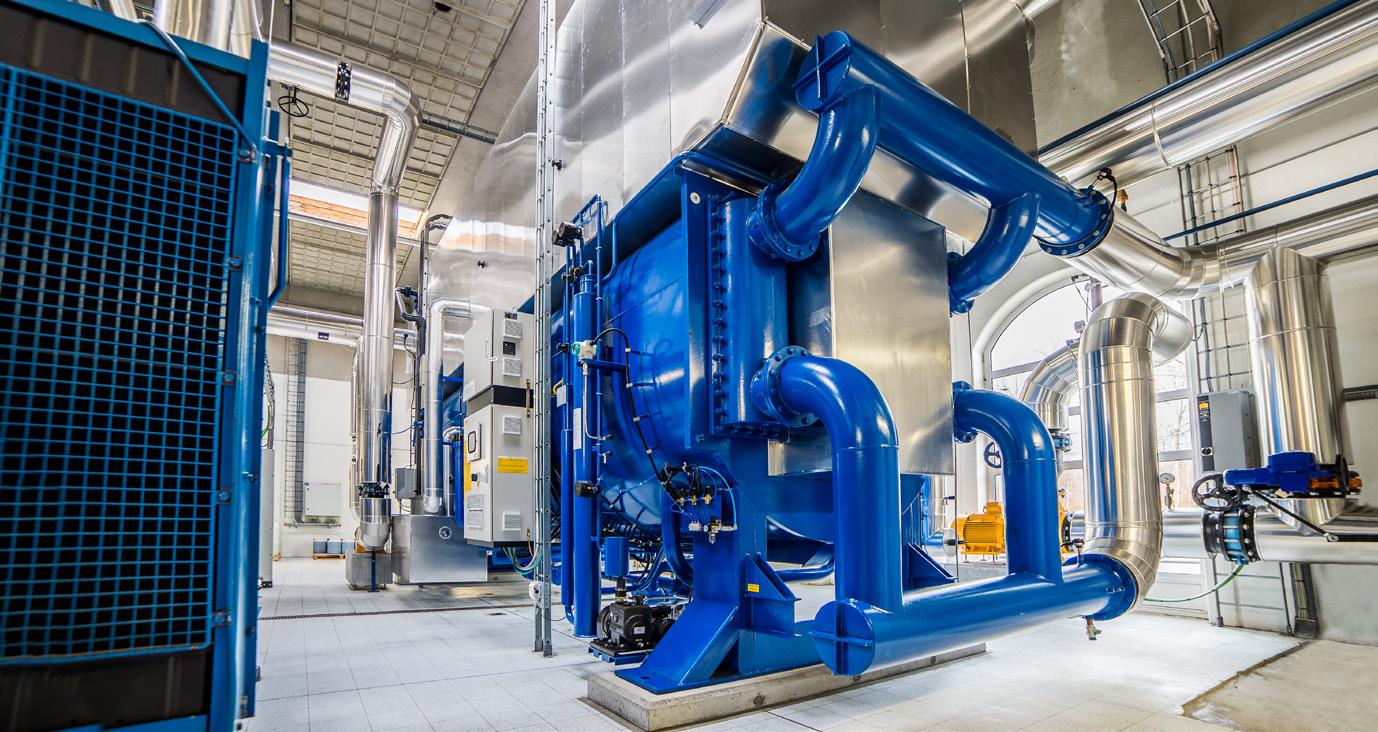
Energy
The Energy division establishes, operates and services all types of energy plants – such as boiler plants, heat pump plants, electric boilers, biomass plants, and pump and heat exchanger stations – that contribute to responsible energy production, with a focus on the industrial market and utilities throughout Europe.
Energy also offers various solutions for general monitoring, operations, control, alarm monitoring and data logging in energy plants.
Energy posted a modest loss of DKK -1.6 million after tax in 2023. Seen in isolation, this is not satisfactory, but compared to last year’s financial result, it is a significant improvement. Looking ahead to 2024, the picture is extremely positive, as we have won many new contracts and already have a full order book.
• Energy is undergoing rapid growth, and much effort was devoted in 2023 to building our future organisation. This demands extensive resources, as we have recruited many new employees within a short time. Our growth curve has been steep, but efficiency has not matched this. However, this was expected, as it takes time to build a new organisation, and we expect higher efficiency in the years ahead. At the same time, we found it difficult during the year to recruit specialists with the necessary experience, especially on the project side. This had a negative impact on the execution of several of our projects. Growth in the first half of the year centred on the Danish part of our project organisation, while our
Engineering department, based in Ostrowiec, Poland, increased its capacity significantly during the second half of the year. We also expanded our scope of delivery to include buildings, so we can now deliver complete, turnkey solutions.
• We performed well in our primary market in Denmark, where demand for biomass plants has been particularly high due to the war between Russia and Ukraine, and the uncertain gas supplies caused by this. We also performed better than expected in the heat pump segment, although we had hoped to do even better given the potential. In addition to orders in the Danish market, we received orders for two biomass plants in Bulgaria (for delivery in 2024). We have begun exporting, and while this is not yet at a satisfactory level, we are underway and proactively developing a focused export strategy. We have also developed our organisation in Poland, and with a new organisation in both Denmark and Poland, we have a solid foundation for the future.
Our service and industry business has exceeded expectations. We have built a robust business, and generated revenue above the budgeted level. We have established Verdo’s name in the service market as a skilled and reliable supplier of service and spare parts for medium-sized energy plants, primarily biomass-fired, and we now have a large number of service agreements on energy plants in the Nordic region.
46 Annual report 2023 | Business areas – Energy
• Throughout the year, we invested many resources in developing and optimising our processes, and achieved ISO 9001 certification in 2023 as part of this. The certification helps to underscore the clear definition of processes and values, and the continuous monitoring and evaluation of all deliverables in the Energy
RATIOS: Energy All figures in DKK ‘000 2023 2022
The table covers:
Verdo Energy Systems A/S, Verdo Energy Systems GL ApS (liquidated as of 6 March 2024) and Verdo Energy Systems Sp Z.o.o
On-the-job training at Verdo Energy Systems A/S
division, which is crucial in relation to the increasing documentation requirements. Given that Energy has seen a marked increase in orders from both Denmark and abroad in recent years, the certification is also expected to help maintain and improve competitiveness.
On-the-job training, duplication of key roles and training in products and systems are important goals that are part of Energy’s mentoring scheme. As the table shows, we exceeded our goals in 2023.
47 Annual report 2023 Business areas – Energy |
105% 100% 95% 90% 85% 80% 75% Jan-23 Feb-23 Mar-23 Apr-23 May-23 Jun-23 Jul-23 Aug-23 Sep-23 Oct-23 Nov-23 Dec-23 Assigned mentor (%) 84% 84% 91% 91% 91% 100% 100% 100% 96% 100% 100% 100% Goal 95% 95% 95% 95% 95% 95% 95% 95% 95% 95% 95% 95%
Revenue 437,610 145,384 EBITDA 86
Net profit/loss for the year -1,630 -22,067 Investments 2,734 4,933 Equity
-23,953
14,043 19,313
Teknik
Teknik operates, maintains and renovates street lighting and traffic lights in many Danish municipalities. This makes us one of Denmark’s largest operators in the field. Our work contributes to road safety, better traffic flow and energy-efficient solutions, for the benefit the climate and environment, and security for citizens when we ensure that roads and streets are properly lit.
We also offer radar speed signs, traffic message boards and car park systems. This is supplemented by our business area handling electrical contracts, effect lighting and technical property operation and service, with a focus on renovation projects of all sizes and smaller new construction.
• The trend from 2022 continued in the first half of 2023, where we struggled with rising prices and contracts that we were not able to adjust. In the majority of cases, we are bound by long-term contracts that typically run for 4-6 years, while guaranteeing customers a fixed price. In many cases, this has meant it has not been possible to demand a price adjustment for the services we provide, corresponding to the material price increases we have experienced. This primarily affects our road lighting business.
• 2023 was characterised by stagnation in the construction industry, caused by uncertainty and rising interest rates. Financing is a critical factor for our electricity contracting customers, and many projects were put on hold because they were no longer profitable. Projects already underway have mostly been completed, but sales and construction of new projects have largely come to a standstill.
• We won an increasing number of projects in all business areas of Verdo Teknik A/S during the second half of the year. However, this was not able to compensate for the challenges early in the year. We therefore ended 2023 with a loss of DKK -15.4 million, which is seen as unsatisfactory. But the last two months of 2023, in particular, were quite promising with profits being generated for both months, and we are working hard to carry on the positive trend.
• In the technical infrastructure segment, new projects won include replacing light fixtures and fuse inserts for the Danish Road Directorate in North and South Jutland

and on Funen, and traffic lights and street lighting in the City of Aarhus. Other projects include new plant and renovation of signalling systems in Herning Municipality and energy renovation in Norddjurs Municipality. We won tenders worth approx. DKK 60 million in the second half of 2023.
• In technical infrastructure, our primary focus is still on optimising, structuring and rationalising the cost structure of the department, with the aim of reducing expenses and ensuring a consistent project execution. This work will continue throughout 2024 and into 2025, especially in connection with the implementation of new product areas and digitalisation of work processes, in both the project and operations departments.
We are also working to expand our business areas, with a particular focus on strengthening our collaboration with CROSS, the leading Czech ITS (Intelligent Traffic Systems) company, on products relevant to the Danish market. This development will continue in the coming years, with activities targeting municipalities, consultants and other stakeholders. We are also exploring the Smart City concept – a term that covers the use of data and IT solutions that add value to a city and infrastructure, for the benefit of citizens and to improve the city’s efficiency and safety. We are experiencing international interest, even though this is
48 Annual report 2023
| Business areas – Teknik
not yet widespread in Denmark. This will be part of our strategic focus in the coming years.
• We have also won new projects in the electrical contracting segment, despite general problems in the sector – particularly energy renovations involving upgrading to LEDs and control of lighting. Verdo’s approx. 45 electricians and apprentices work with new installations in apartment buildings, and we are also involved in several major renovation projects for housing associations. We also install charging stations for
RATIOS: Teknik All figures in DKK ‘000 2023 2022 Revenue 200,446 193,936
-12,119 -13,843
4,624 4,817
customers in East Jutland. Lastly, we have successfully completed several industrial contracts, and we have high expectations of this segment in the future, which is a new market for Verdo Teknik A/S.
• Looking ahead to 2024, we expect negative earnings due the market still being challenging, but significantly better results than in 2023. The many initiatives and improvements continually being implemented at Verdo Teknik A/S are not expected to lead to positive earnings until 2025.
per month per
49 Annual report 2023
Business areas – Teknik | 2,500 2,000 1,500 1,000 500 0 Jan-23 Feb-23 Mar-23 Apr-23 May-23 Jun-23 Jul-23 Aug-23 Sep-23 Oct-23 Nov-23 Dec-23 Realised – month 2,163 2,083 2,352 1,571 1,726 1,519 1,267 1,638 1,827 1,945 2,053 1,615 Realised – avg. ytd 2,163 2,124 2,203 2,040 1,976 1,900 1,813 1,791 1,795 1,810 1,834 1,815 Goal 1,900 1,900 1,900 1,900 1,900 1,900 1,900 1,900 1,900 1,900 1,900 1,900
We have implemented a scalable system in Teknik that allows vehicle use to be measured at the individual level. The aim is to promote more conscious and responsible driving behaviour, leading in part to less time being spent in vehicles. The reduction in the number of kilometres driven will mean lower operating costs, longer vehicle life and a significant reduction in carbon emissions.
Km driven
hourly paid employee at Verdo Teknik A/S
EBITDA
Net
Investments
Equity
KM
profit/loss for the year -15,421 -13,675
159,787 175,208
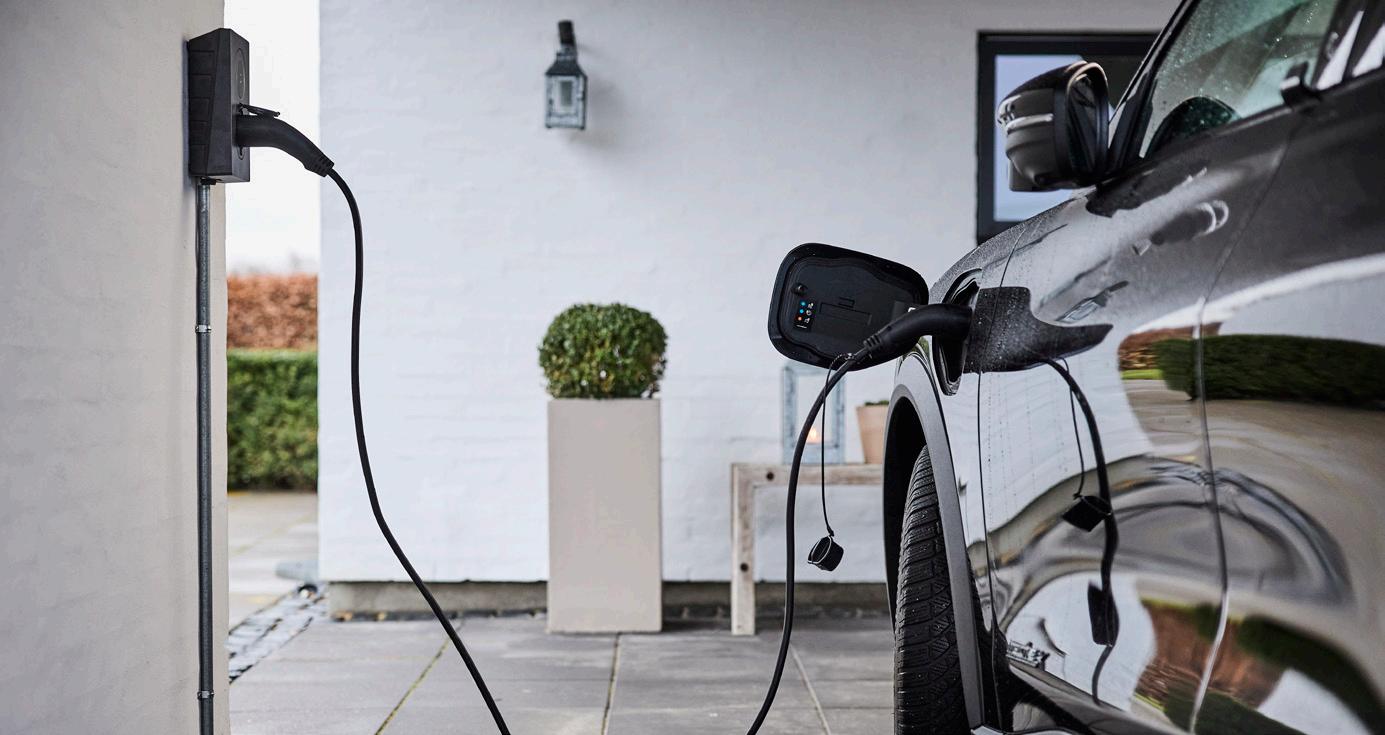
Elsalg
Elsalg (Verdo Go Green A/S) sells power to a large number of private and business customers, mostly in the form of green power from environmentally certified, renewable energy sources*. We also supply, install and maintain charging systems for both private customers and companies.
*All electricity sold to private customers is green.
• Elsalg ended 2023 with a loss of DKK -33.4 million, which is highly unsatisfactory. The results were impacted by two factors in particular:
Ꞷ Firstly, we have an ongoing arbitration case with a major wholesale customer. In both 2022 and 2023, the customer’s failure to purchase already ordered power resulted in significant losses. The case is expected to be resolved during 2025, and we do not expect it to negatively affect Verdo in either 2024 or beyond. We believe we have a strong case.
Ꞷ Secondly, many private customers who originally purchased electricity at a fixed quarterly price chose to move to a variable product due to the volatile prices in the market – which have also risen significantly due to the energy crisis. As prices fell in early 2023, the fact that customers had moved away from fixed-price products led to losses on the financial contracts used to hedge customers’ consumption.
• Earnings for the year were also affected by customers’ declining electricity consumption. Consumption per customer declined in 2022, and this trend continued into 2023, reducing total volumes sold.
2023 also saw a higher level of bad debts – significantly higher than expected. We have therefore significantly revised our arrears procedures in order to avoid similar situations in the future.
For business customers, higher prices for green certificates have led many companies to opt out of green power. However, more companies now seem to be choosing green power again.
• As a new initiative in our electricity sales business, we introduced a production settlement service in 2023. This means we can handle customers’ electricity generation from solar cells and wind turbines, such that we buy their electricity and sell it for them. This service is only available for business customers at present, but it will be expanded in 2024 to cover both sales to and purchases from private customers with solar cells or small wind turbines.
Verdo entered the market for charging systems a few years ago – a market that is seeing rapid growth. We relaunched our charging station product in a modernised version in 2023, which offers lease and buying options. However, the market for charging stations is highly
50 Annual report 2023 | Business areas – Elsalg
competitive, and this has negatively affected sales to private customers. However, we have gained more new business customers than expected – primarily due to our successful sales support activities. We see the sales trend as satisfactory overall.
Elsalg continued to plant trees last year in Danish public forests in collaboration with the Growing Trees Network Foundation each time a new private customer joined us. We have donated thousands of trees in this manner as part of local afforestation. The trees are expected to be planted in spring 2024.
RATIOS: Elsalg
All figures in DKK ‘000 2023 2022
The table covers: Verdo Go Green A/S
• Looking ahead to 2024, we expect positive earnings. We expect to sell a higher volume than in 2023 due to growth in the business during the year. We are also building new concepts for both private and business customers, which will have a positive impact on earnings.
51 Annual report 2023 Business areas – Elsalg |
693,094 1,047,220 EBITDA -40,489 -12,536 Net profit/loss for the year -33,389 -10,680 Investments 392 5,907 Equity 57,629 51,368
Revenue
2021 2022 2023 2024 Verdo 177,393 875,184 1,124,642 243,462
Number of logins to My Verdo
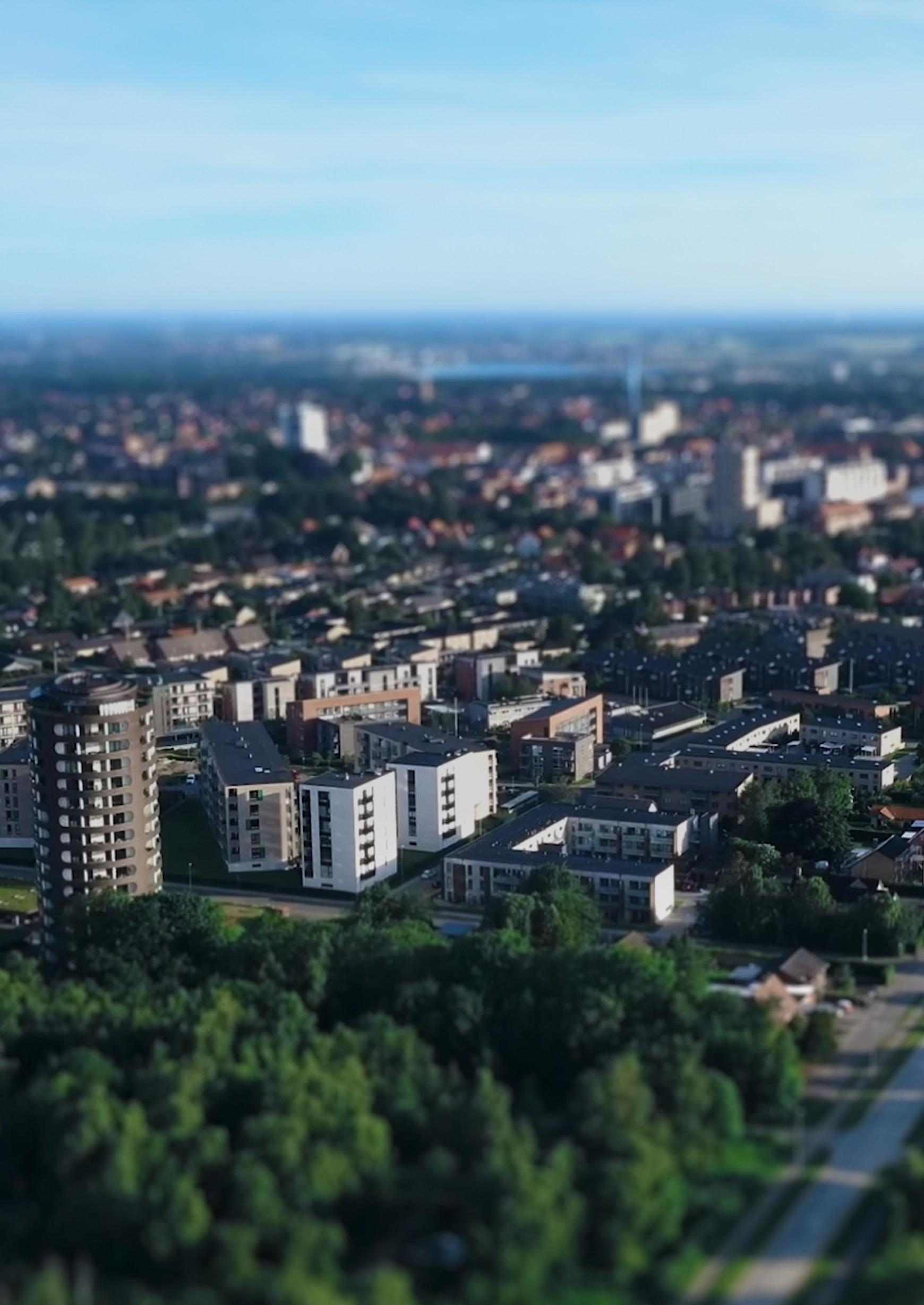
Verdo as a responsible social player
52 Annual report 2023
Business model
This section contains the statutory statement on social responsibility pursuant to section 99a of the Danish Financial Statements Act.
As described earlier, Verdo’s social contract provides the basis for how we work with the green transition and social sustainability as we operate and develop our business. This is also reflected in our business model, which focuses on transforming resources into value for our customers and society. We create a robust infrastructure that makes heating and water available to many citizens in Randers and Herning, and offer electricity on a national level. We are increasingly focusing on renewable energy and CO2 reduction. Many of our products and services
Activities
have an impact on the climate and environment. Our business model therefore reflects our goal of considering and balancing the impact we have on our surroundings –both positive and negative.
Values
Customer value
∂ Future-proof heating
∂ Clean drinking water
∂ Green power
Social value
∂ Products for the green transition
∂ Robust infrastructure
∂ Contributing to sustainable communities
∂ Danish and international jobs
∂ Tax payments in Denmark
53 Annual report 2023
Business model |
Resources People Raw materials Renewable energy Finances Development and installation ∂ Energy plants ∂ Street lighting ∂ Traffic systems ∂ Electricity installation Operations and maintenance ∂ District heating ∂ Drinking water ∂ Energy plants ∂ Street lighting Service ∂ Energy plants ∂ Electricity installation Trading ∂ Electricity sales ∂ Biomass ∂ District heating ∂ Technical carbon ∂ Coal
>
As the business model shows, Verdo has an interdependent relationship with the world around us. This is expressed through our many interfaces and business areas, resulting in an extensive and diverse network of suppliers. We also have a number of direct sales channels to customers, which primarily consist of private households, companies, municipalities and heating plants.
Our main business areas cover:
• Energy production (incl. development and production of energy solutions) – includes production from fossil fuels and renewable energy sources and production of energy plants.
• Transmission and distribution of electricity, water and heating through grids.
• Supply and consumption of energy for end-users.
Trade in energy sources (biomass, wood chips, coal and electricity).
Trade in industrial coal (carbon products for technology, and metal and alloy production).
Technical infrastructure solutions and services, including consultancy, installation, maintenance and optimisation, e.g. of street and traffic lighting and charging systems.
Within each area, there are potential business impacts, risks and opportunities that are affected by a greater focus on the green transition – among ourselves, our customers and the communities we are part of.
Energy policy and regulatory tightening in relation to the climate and environment and changes in customer behaviour represent significant external impacts on Verdo’s activities. These may lead to a need to invest in cleaner technology and phase out products. Price volatility for raw materials and the development of new technology can impact the demand for our existing products and create a need for further transition to circular and more responsible products. There are also business opportunities for Verdo in these areas, including better utilisation of excess heat, energy storage, energy distribution optimisation and recycling of materials, which can be supported by greater digitalisation and innovative technologies.
Read about concrete initiatives under ‘Verdo’s ESG results 2023’.
54 Annual report 2023
| Business model
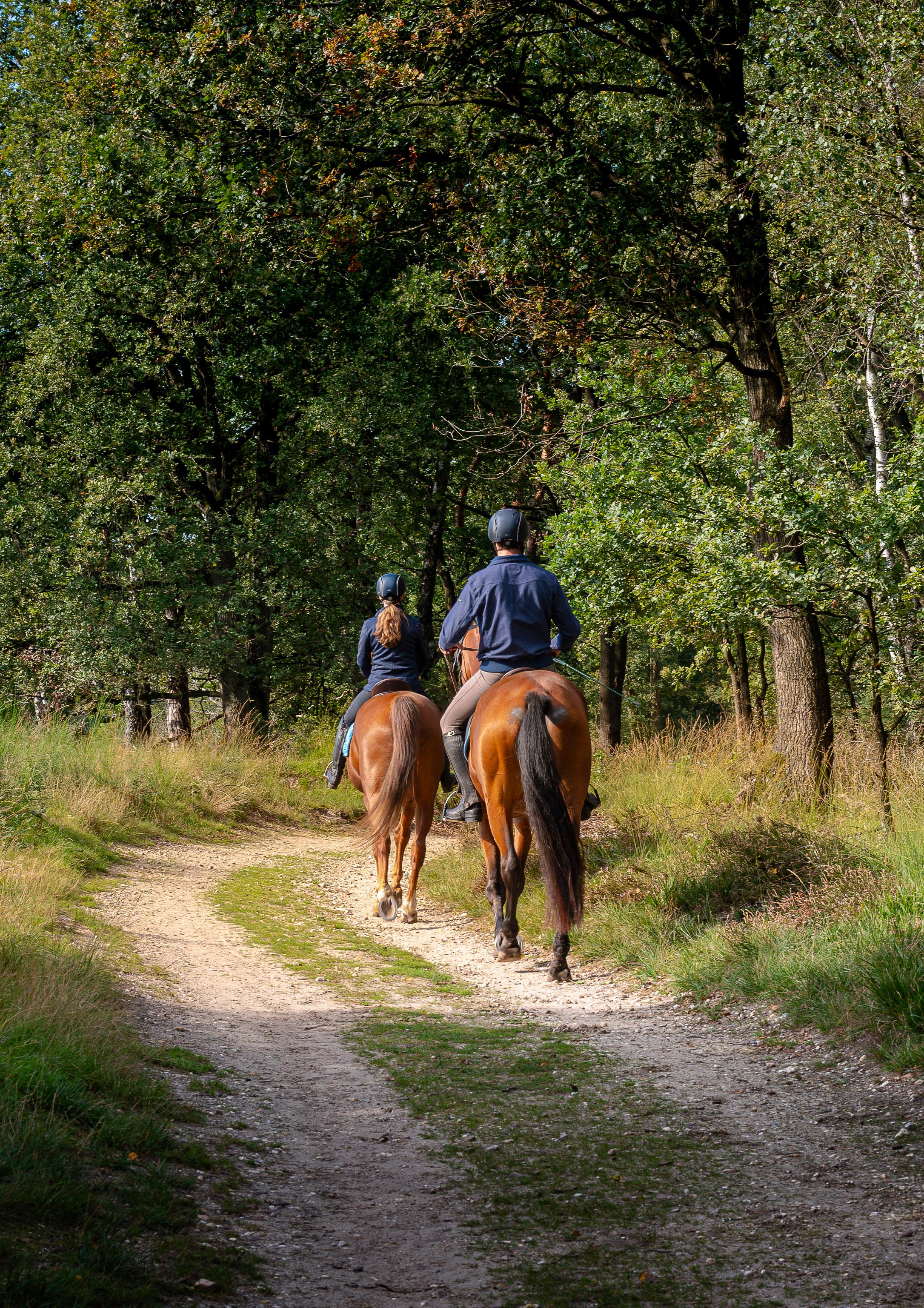
55 Annual report 2023
Verdo’s ESG results 2023
Preparing for CSRD in our annual reporting
The new EU Corporate Sustainability Reporting Directive (CSRD) comes into force from 2024. This requires companies to report on their environmental and social impacts. In light of this, the EU has introduced European Sustainability Reporting Standards (ESRS).
Verdo has now begun to study these standards more closely. Our goal for 2023 was to practise applying the standards and integrate parts of them into our annual reporting.
As our first step towards ESRS compliance, while working on the 2023 annual report we started developing ESG reporting as an integral part of this.
This new approach means that from now on we will present our reporting on corporate social responsibility and ESG metrics and initiatives directly in the annual report. It also means that our statutory report on corporate social responsibility is now part of the management commentary in the annual report.
Framework for working with ESG
Verdo’s work with corporate social responsibility has moved towards a more holistic approach in recent years, where environmental sustainability (E), social sustainability (S) and responsible governance (G) guide how we manage and develop our business. The strategic anchoring has been further cemented with the establishment of a sustainability office.
The UN Global Goals continue to guide our work as an energy company. We have a particular focus on SDG 6 on clean water, SDG 7 on sustainable energy, and SDG 13 on climate action.
This development is an indication of Verdo’s desire to meet our significant social responsibility as one of Denmark’s large companies – the 119th largest in 20231. It also
reflects new EU legislation, which will have an impact on how we plan our ESG efforts in the coming years.
The statement in this report on Verdo’s policies, initiatives and results constitutes our statement on social responsibility, gender distribution in management (see the section on the underrepresented gender) and data ethics (see the section on users and end-users) in accordance with section 99a, b and d of the Danish Financial Statements Act.
As part of our preparation for reporting under the EU Corporate Sustainability Reporting Directive (CSRD), we have completed a double materiality assessment and identified data points, with inspiration from the EU Commission’s adopted sustainability reporting standards (ESRS).
1 Source: ‘Børsen 1000’, 9 October 2023.

56 Annual report 2023
| Verdo’s ESG results 2023
Verdo’s
Civil rights
S2. Workers in the value
S2. Equal treatment S2. Other labour
Environment and social
E1. Adaptation
E1. Mitigation
E1. Energy mix
E2. Air
E2. Water
E3. Water extraction
E4. Biodiversity
E4. Ecosystems
E5. Resource inflows
E5. Resource outflows
E5. Waste
S1. Own workforce
Climate change adaptation
Climate change mitigation
Energy – Energy mix
Air pollution
Water pollution
Water extraction
Direct impact on loss of biodiversity
Impacts on the extent and condition of ecosystems
Resource inflows, including resource usage
Resource outflows related to products and services
Waste
Working conditions
Materiality assessment
– method
We performed our first double materiality assessment in 2023. Verdo is not yet required to provide such an assessment, but we wanted to test the method and process and create a data foundation that we can continue to work with in the coming years, in order to meet the requirements in CSRD and the associated standards (ESRS).
The materiality assessment was performed for Verdo’s key business areas as a joint collaboration between Verdo’s Head of Strategy, Head of Sustainability and Finance Business Partners, who are familiar with the social responsibility and financial factors for the business areas, as well as business plans and the Group strategy.
The materiality assessment was then reviewed together with Group Management, which in addition to the CEO and CFO consists of the Director of Verdo Energy Systems A/S and Verdo Teknik A/S, the Director of Energi & Forsyning, the Director of Trading and Carbon Partners and Verdo’s HR
S1. Equal treatment
S2. Workers in the value chain
S1. Equal treatment
S1. Other work-rel.
S3. Economics
S3. Civil rights
S3. Special rights
S4. Information
S4. Inclusion
G1. Culture
G1. Lobby
G1. Anti-corruption
Equal treatment and opportunities for all
Working conditions
Equal treatment and opportunities for all
Other work-related rights
Communities’ economic, social and cultural rights
Communities’ civil and political rights
Particular rights of indigenous communities
Information-related impacts
Social inclusion
Corporate culture
Political engagement and lobbying activities
Anti-corruption and anti-bribery
Director. Verdo’s Supervisory Board was also kept informed about the process.
Based on our double materiality assessment, management deems climate change mitigation and adaptation (ESRS E1) to be the most urgent issues for Verdo to address.
The process for performing an ESG double materiality assessment will be described and adopted as an internal procedure in the future.
We are aware that in the future it is likely we will assess several of these materialities to be high-risk. We will also add many more KPIs based on the assessed double materialities.
Read more about Verdo’s assessed materialities under each ESG area.
57 Annual report 2023
double materiality assessment
S1. Own workforce
G1. Lobby G1. Anti-corruption
E2. Water
E2. Air
E3. Water extraction
E4.
Ecosystems E5. Resource inflows
S4.
Information
S3.
S3.
E5.
S1. Equal treatment
S3. Economics
Special rights
Waste
G1.
S4. Inclusion E1. Climate adaptation
Culture
law E4.
E1.
change
E1.
mix 4.5 4 3.5 3 2.5 2 2 2.2 2.4 2.6 2.8 3 3.2 3.4 3.6 3.8 4 Verdo’s ESG results 2023 | Financial
chain
Biodiversity
Climate
mitigation
Energy
Brief excerpts from Verdo’s sustainable development policy
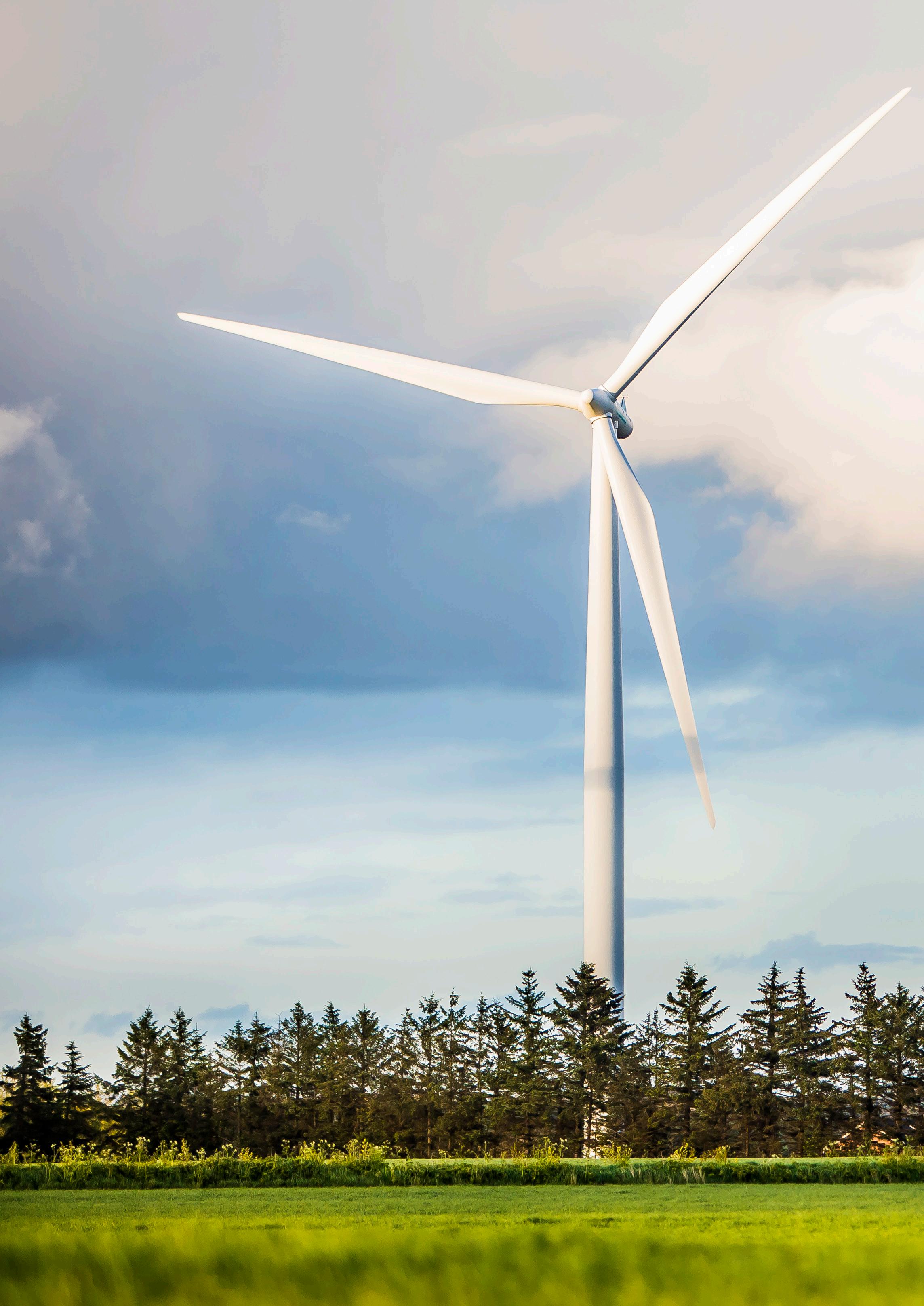
Green transition
We are an active player in the green transition. We are therefore committed to developing and sharing knowledge, both internally and externally.
Carbon emissions
We monitor and record our carbon emissions in order to continually lower them and reduce our climate impact.
Climate impact
We seek to reduce the company’s climate impact through effective ecomanagement and targeted efforts.
Apprentices and trainees
We educate for the future. We therefore strive to have a high proportion of apprentices and trainees that reflects Verdo’s needs and opportunities.
Attractive workplace
We strive to be a safe and healthy workplace, where current and future employees will thrive. Our OHS organisation works actively with concrete OHS initiatives.
Diversity
We strive to create an equal workplace, where male and female employees have the same opportunities for careers and management positions.
Equal opportunities
We strive to give all our employees the same career opportunities, irrespective of gender, age, ethnicity, religion, disability etc.
Seniors
We seek to meet the needs of our employees in different life stages and situations. We therefore strive to retain senior employees, in order to keep their experience and knowledge in the company for as long as possible.
Corporate responsibility
We support and respect the 10 principles of the UN Global Compact for corporate responsibility, which provide an ethical and practical framework for corporate responsibility based on international agreements and conventions.
Employment conditions
We offer employment and working conditions that comply with national legislation, and work to eliminate discrimination in the working and employment relationship. We also offer a fair wage that can provide a decent living.
Modern slavery
We do not tolerate human trafficking or modern slavery in any form. Employment relationships must be voluntary and based on mutual consent.
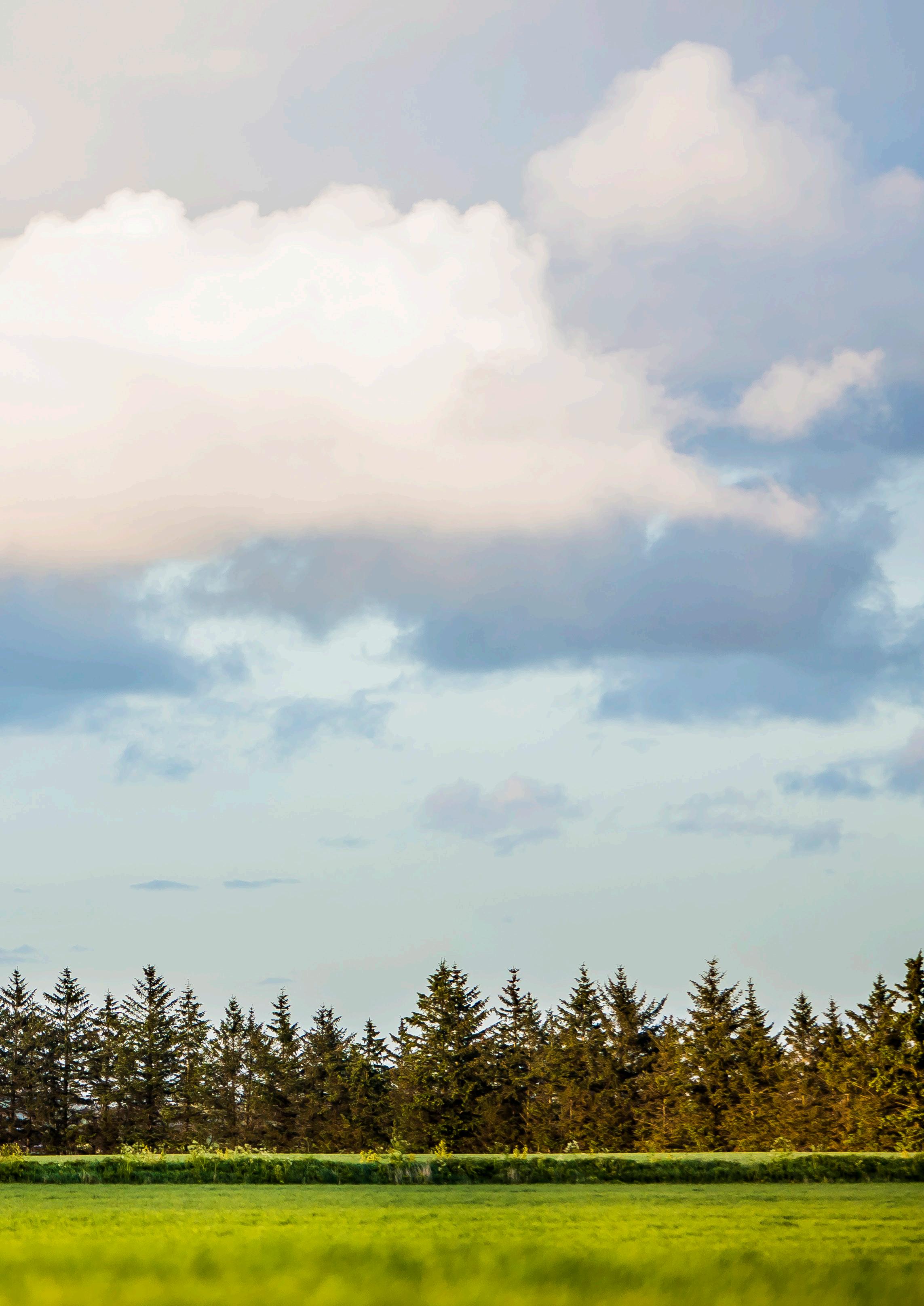
Human rights
We show respect for the universal human rights enshrined both in national legislation and international conventions. Including discrimination, forced labour, child labour, labour rights and several other factors.
Partners
We expect and demand that Verdo’s partners and suppliers meet the same standards as Verdo and other conventions.
Anti-corruption
We have a zero-tolerance policy towards corrupt or dishonest activities, and we refrain from any form of corruption or bribery – both direct and indirect.
Data protection
We respect and comply with applicable data protection legislation – including GDPR.
Local communities
We are involved in our local communities, and seek to contribute as much as possible. In particular, by creating an attractive foundation for a diverse and growing business community.
Climate and environment (E)
This section contains our statutory statement on social responsibility pursuant to section 99a of the Danish Financial Statements Act, in relation to environmental factors, including what Verdo is doing to reduce the climate impact of the company’s activities.
Climate change is getting hard to ignore. Changes in temperatures and more frequent storms and floods are making it evident – even in our region – that major changes are taking place which affect people, nature and society. It makes you take notice.
It is therefore important to be careful about all our emissions and everything we do that has an impact on the environment and climate. Energy consumption is a key factor in carbon emissions. But there are adjustments we can make. Overall, we need to implement energy-saving initiatives, phase out fossil fuels and have a sustained focus on transitioning to more responsible energy sources.
Excerpt from Verdo’s Climate and Environment Policy
As a responsible energy company, Verdo focuses on regularly launching new initiatives that can help reduce our impact on the climate and environment.
Energy is something we cannot do without in our society, but it is also one of the areas that has a major impact on greenhouse gas emissions. At Verdo, our goal is to implement projects that are economically viable and also reduce potential climate and environment impacts.
To ensure the best possible effect, we work within the framework of national and international objectives and guidelines in our climate and environmental policy. This applies, for example, to greenhouse gas reduction targets, international climate commitments and the UN’s 17 Global Goals, including Global Goal 6, 7 and 13 in particular.
In concrete terms, this means we have the following key aims in relation to the climate:
• (a) Competitive utility prices and high security of supply
• (b) CO2e and NOx reductions
(c) Clean drinking water
In our daily work, this involves:
Working to ensure that information and necessary resources are available to meet objectives and goals, with a focus on reducing the climate impact of Verdo’s own activities and through the products and services we develop and supply to our customers and the local community.
We do this in part by monitoring and registering our emissions at several places in the organisation and focusing on responsible products and solutions. We also encourage our employees to suggest ways of reducing our environmental impacts and negative climate effects.
In our Climate and Environment Policy, we commit to complying with applicable legislation and relevant regulatory requirements in relation to the climate and environment, and to developing and sharing knowledge concerning the green transition – internally and externally.
We began working with eco-management in 2023. For now, it is our CHP plant in Randers that is benefitting, but we expect to gradually introduce it in several places in the Group. The eco-management system is audited and complies with the requirements in the DS/EN ISO 14001:2015 standard. We have also introduced competency groups at the CHP plant. These promote greater coresponsibility and support knowledge sharing about the plant’s operation and maintenance.
Climate and environment mean…
Climate is definedas the basic conditions ecosystems are subject to, i.e. weather conditions in the form of precipitation, air pressure, humidity and temperature. Environment is the physical environment and conditions under which people, animals and plants live.
60 Annual report 2023
| Climate and environment (E)
Energy consumption and composition
Verdo faces a complex risk and opportunity picture in relation to energy consumption and composition. On the risk side, challenges relate to changing regulatory requirements, price volatility in energy markets and the need to ensure a stable and secure energy supply during an era of transition to more responsible energy sources. These risks can affect our operating costs and investment needs.
On the opportunity side, we can benefit from the growing demand for energy from renewable sources and more efficient energy solutions. As a supplier of responsible energy solutions, we have opportunities to invest in renewable energy sources such as wind, solar and biomass, and to develop innovative energy storage technologies. We can also exploit new technologies and data analysis to optimise energy production and distribution.
Starting in 2023, Verdo will calculate its energy intensity each year, to understand how our energy consumption changes in relation to revenue. This will help give us clarity in the future as to whether our energy consumption changes in proportion to our activities, when our revenue increases or decreases.

Note 1: Total energy consumption relative to revenue.
61 Annual report 2023
> Energy intensity 2023 Unit 2023 Energy intensity1 GJ/million DKK 234.66 Energy intensity1 MWh/million DKK 65.18
Climate and environment (E) |
Examples of activities in 2023
We implemented a number of initiatives in 2023 that can give insight into Verdo’s total energy consumption and what we are doing to improve energy efficiency.
Verdo buys only green power to meet our own needs. The same applies to all our residential customers and a large proportion of our business customers – they buy green power through our electricity sales department, Verdo Go Green A/S
All our sales of green power are labelled under the leaf labelling scheme by default. The labelling scheme was designed to make it easier for customers to choose green. This means that power is 100% based on renewable energy sources, as we purchase certificates corresponding to the customer’s electricity consumption. But our green aspirations in electricity sales do not stop there. As a new initiative in 2023, Verdo was approved to handle electricity production. This means that we can help our customers manage their excess production.
At Verdo Trading A/S we recognise the need to reduce our dependence on fossil fuels, including energy coal, while also acknowledging the ongoing need for energy coal in the current energy mix – where energy coal is still critical to ensuring that people around the world can heat their homes and power their industries. Verdo Trading A/S handles direct sales of carbon products as well as sales to traders. Direct sales account for around 60%, where we are able to report on what amounts are used for what purposes. Based on this, we know that the majority of these carbon products (96% in 2023) contribute to the manufacture of technical products, such as flat screens, mobile phones, solar cells,
Uptime for biomass plant (CHP plant in Randers)
steel and aluminium. We therefore see a continued strong need for carbon products.
We have no timetable for phasing out our trade in energy coal, but we are aware of the need to reduce coal consumption as more sustainable energy sources become available. We also want to ensure a responsible transition, where we support our customers through the change and work to find viable solutions. In the meantime, our priority is to ensure that our business practices are socially responsible – read more about this under the section on Governance (G).
Verdo Varme A/S and Verdo Produktion A/S are working to establish a new 10,000 m3 storage tank in Randers, between 2023 and 2025. Once the storage tank is completed, it will be able to store large amounts of heat produced using electricity from renewable energy sources such as biomass, and longer term, also from wind turbines and solar cells. The storage tank will also mean that a larger proportion of electricity production in Denmark is based on certifiedbiomass –especially during periods when significantly more power is needed and when electricity prices are high. The storage tank will also make it possible to reduce the use of oil and gas, allowing Verdo to use the stored heat from the tank during peak periods instead. When the tank begins operation, there will be a CO2 saving due to a reduction in the use of natural gas during outages and peak loads. The estimated CO2 reduction will be approximately 50-100 tonnes annually. There will also be higher utilisation of the electric boiler connected to the district heating network – an additional approx. 35,000 GJ annually. This will in result in a reduction in biomass consumption of approx. 3,300 tonnes per year.
Note: Operation using oil and natural gas during biomass boiler downtime minimised. Fossil fuel use is thus reduced to a minimum.
100.00% 99.90% 99.80% 99.70% 99.60% 99.50% 99.40% 99.30% 99.20% 99.10% 99.00% Jan-23 Feb-23 Mar-23 Apr-23 May-23 Jun-23 Jul-23 Aug-23 Sep-23 Oct-23 Nov-23 Dec-23 Realised – per month >99.99% 100.00% 100.00% 100.00% 100.00% 100.00% 100.00% 100.00% 100.00% 100.00% 99.39% 100.00% Realised – YTD >99.99% >99.99% >99.99% >99.99% >99.99% >99.99% >99.99% >99.99% >99.99% >99.99% >99.94% >99.95% Goal 99.70% 99.70% 99.70% 99.70% 99.70% 99.70% 99.70% 99.70% 99.70% 99.70% 99.70% 99.70% Percentage uptime
62 Annual report 2023 | Climate and environment (E)
Record number of conversions from oil and gas to district heating
As part of Denmark’s goal of reducing carbon emissions by 70% by 2030, all of the approx. 500,000 oil and gas boilers in Denmark have to be phased out. According to calculations by the Danish District Heating Association, the conversion from oil and gas to district heating will result in a total reduction of 1.9 million tonnes CO2.
The district heating roll-out in Denmark is happening at a fast pace, which also goes for our supply areas in Randers and Herning. Particularly in Randers, where we are seeing an uptake of 90% of households in some areas.
We converted a total of 419 oil and gas boilers to district heating in 2023 compared to 438 in 2022. We will be keeping up the pace in 2024. The goal is to convert 485 oil and gas boilers.
The high uptake is due in part to gas price volatility (and generally higher prices since the energy crisis), the appeal of a simple and more reliable heating supply and a desire to contribute to the green transition. Conversion to collective district heating leads to major
cost savings for individual households, but also large CO2 savings for our climate. The heating bill for a standard 130 m2 house with average heating consumption is reduced from more than DKK 19,000 for natural gas, to just over DKK 11,000 for district heating.
The average size of the converted private homes in Randers in 2023 was 155 m2, resulting in an annual saving of 3.1 tonnes CO2e1 per home. This figure was not calculated for Herning, as the number of conversions for private homes is very limited.
Due to the many conversions, far more people are now connected to the district heating network, and this can be seen in the production volume. A production record was set in Randers in January 2024 at 195 MW (the previous record was approx. 180 MW).
Note 1: All conversions are assumed to be from natural gas to district heating, although a small number will be from oil or other forms of heating to district heating. The CO2 savings include conversion of both homes and commercial properties. It is assumed that annual heating demand for a home is 98 kWh/m2 and 50 kWh/m2for a business. ‘Fjernvarmedeklaration Verdo Varme Randers 2023’ and standard values from ‘Videncenter for Energibesparelser i Bygninger’ have been used for the calculations. Note 2: Calculations based on both oil and gas conversions and also the stated heating requirement during the conversions. ‘Fjernvarmedeklaration Verdo Varme Herning 2023’ and standard values from ‘Videncenter for Energibesparelser i Bygninger’ have been used for the calculations.
63 Annual report 2023
CASE Natural gas conversions in Randers and Herning Unit 2023 Goal 2024 Randers Number 366 450 CO2 saving Tonnes 19,721Herning Number 34 35 CO2 saving Tonnes 1,612 -
Climate and environment (E) |
Greenhouse gas emissions
Verdo faces a complex mix of risks and opportunities related to our operations, particularly in terms of greenhouse gas emissions. This is reflected in our double materiality analysis. Significant emission risks are associated with the direct emissions from energy production in Randers and the indirect emissions associated with trading biomass and coal and material purchases for energy plants.
Trading coal also entails additional environment and market risks, in the context of the global move away from fossil fuels. We can seek to overcome these challenges, for example, by informing our customers about consumption optimisation, planning to phase-out energy sources and products such as biofuels and energy coal, and exploring more renewable energy solutions for heating and electricity production.
As part of our move towards a more comprehensive approach to emissions management, we introduced three new KPIs related to scope 3 emissions in 2023: Business travel, employee commuting and waste management.
While not deemed to be most critical to our total carbon emissions, these factors reflect management’s strategic decision to focus on the emissions that we can directly control and influence. This initiative underlines Verdo’s commitment to improving data collection and emissions management, laying the foundation for future actions to reduce more indirect emissions.
Note 1: Verdo follows national CO2e reduction targets. We have used the Greenhouse Gas protocol to calculate our climate accounts. No volatile emissions were included for 2022 and 2023.
Note 2: Verdo has purchased green power certificates under the leaf labelling scheme equal to our total electricity consumption. We have therefore used an emission factor for electricity of 0 g CO2e per kWh for our market-based emissions.
Note 3: We do not know our full scope 3 emissions, or what percentage the calculated amount represents. For 2023, we included emissions from employee commuting, business travel and waste from operations. See these key figures in the scope 3 emissions table. An automatic upstream calculation is also included in connection with the scope 1 and 2 calculations. These cover, for example, purchases of goods, services and freight.
Note 4: Biogenic carbon emissions from the combustion of biofuels (e.g. biomass, biogas, bioethanol and biodiesel) are calculated outside of scopes 1, 2 and 3. Under the GHG protocol, emissions from the combustion of biomass are considered to be net zero for scope 1 direct emissions, as the biomass absorbs CO2 during its growth phase equivalent to the amount released during combustion.
64 Annual report 2023
Climate accounts1 – scope 1-3 Unit 2022 2023 Direct emissions – scope 1 Tonnes CO2e 12,728.00 24,981.61 Direct emissions – scope 2 Location-based Tonnes CO2e 1,342.00 1,171.28 Indirect emissions – scope 2 Market-based2 Tonnes CO2e 72.00 110.11 Emissions – scope 33 Tonnes CO2e - 15,642.72 Emissions outside of scopes 1-3 Direct biogenic emissions4 Tonnes CO2e 280,084.00 248,885.41
| Climate and environment (E)
Starting in 2023, Verdo will calculate its GHG intensity each year, to understand how our greenhouse gas emissions change in relation to revenue. This will help give us clarity in the future as to whether our environmental impact changes when our revenue increases or decreases.
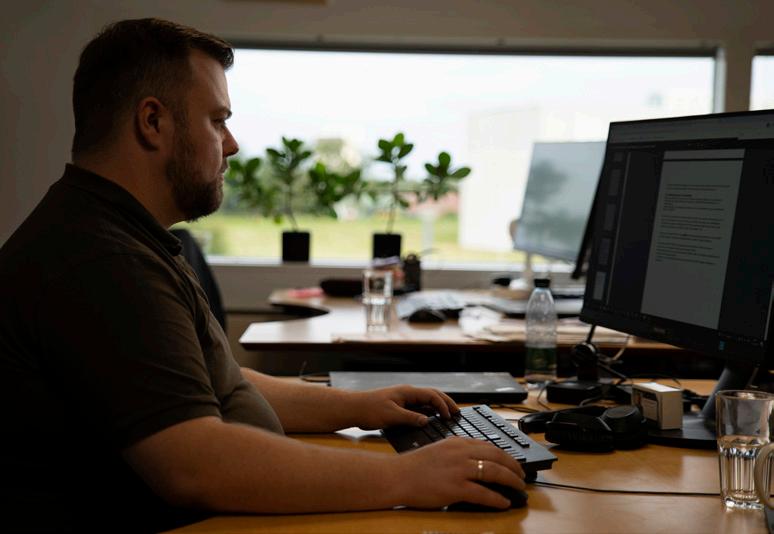
*Verdo has purchased green power certificates under the leaf labelling scheme equal to our total electricity consumption. We have therefore used an emission factor for electricity of 0 g CO2e per kWh for our market-based emissions.
Note 1: Total scope 3 GHG emissions.
Note 2: Total GHG intensity relative to revenue.
We see changes in our emissions, primarily in scope 1 and 3, and in outside of scopes CO2e emissions.
The increase in scope 1 emissions is primarily due to a three-month overhaul of Herning CHP plant, where planned maintenance was carried out. The plant was shut down for an additional period of about two weeks in connection with the reconnection of its turbine. During these periods, Verdo’s peak and reserve load stations had to be activated to secure the heating supply for customers. Several of these are fossil fuel-fired.
The change in scope 3 is primarily due to the automatic calculation of upstream emissions in connection with scope
1 and 2 calculations. These did not appear in last year’s calculation. Another reason for the change is the inclusion of the three new CO2e emissions calculations for employee commuting, business travel and waste from operations. In 2024, we will look into ways of reducing these emissions. We will also calculate more scope 3 emissions.
The reduction in emissions outside of scopes 1-3 comes despite a higher actual consumption of woodchips. This is due to new and lower emission factors in the calculation tool compared to last year.
65 Annual report 2023
Unit 2023 Total GHG emissions – Market1 Tonnes CO2e 40,734.44 Total GHG emissions – Location1 Tonnes CO2e 42,439.28 GHG intensity – Market2 Tonnes CO2e/million DKK 10.26 GHG intensity – Location2 Tonnes CO2e/million DKK 10.69
Green House Gas intensity*
> Climate and environment (E) |
Examples of activities in 2023
scopes 1 and 2
We implemented a number of initiatives in 2023 that contribute to reducing greenhouse gas emissions in scopes 1 and 2.
Verdo Produktion A/S used less coal at the CHP plant in Randers in 2023 than in 2022. However, we emitted more fossil CO2 due to higher gas oil/natural gas consumption at our peak-load stations. Including the heating plants, we emitted 1,861 tonnes of fossil CO2. In comparison, a home heated using natural gas emits approx. six tonnes of CO2 from natural gas consumption.
As the table shows, we reduced NOx emissions to 153,104 kg in 2023 compared to 181,176 kg in 2022 and 242,079 kg in 2021 – a reduction of 15%. It is worth noting that this reduction happened during a period with many new connections to the district heating network, as part of the drive to phase out gas and oil-fired boilers in our supply area. The reduced emissions are due in part to stricter EU requirements from 1 January 2023 for the limit value for NOx emissions. To meet these requirements, Verdo Produktion installed a DeNOx system at the CHP plant, which is activated when the NOx values from production are too high. We also installed a digital tool in the control
system. This notifies the operator team in good time if emissions are high, so they can ready the DeNOx system or adjust the boilers (and switch off/adjust them again when emissions drop below the set limit value).
In addition to the above initiatives, Verdo Produktion A/S focused on reducing its own consumption last year. The goal was a 1.5% reduction, corresponding to approx. 350 MWh. We came close to reaching our goal, achieving a reduction of 0.82% for the year. This corresponds to a reduction of approx. 200 MWh, or the annual electricity consumption of 40 single-family houses. We will continue to focus on our own consumption in the years ahead through measures such as:
• Stopping parts of the plant that are not in use
• Auto-stop on the wood chip conveyor when it is empty Stopping district heating return pumps when they are not needed
• Regular check for compressed air leaks (working air/ control air)
• Gathering and evaluating suggestions from operators on how to save power
• Turning off lights at times when they are not needed.
Note 1: Carbon emissions from the CHP plant in Randers and emergency load plant. These are calculated based on fuel consumption, calorific value and an emission factor, in line with monitoring plans approved by the Danish Energy Agency.
Note 2: NOx emissions from the CHP plant in Randers have been measured using an Automatic Measuring System (AMS).
Note 3: Consumption of wood chips, other biomass and coal is weighed using calibrated conveyor scales.
Note 4: Net electricity production from documented sustainable biomass is calculated based on the measured net electricity production, adjusted for the documented share of sustainable biomass.
Note 5: Unlike previous years, the figures for district heating production include four peak-load stations in Randers. District heating production is measured using calibrated meters.
Key figures for the Randers CHP plant over time Units 2020 2021 2022 2023 CO2 emissions1 Tonnes 2,606 3,002 1,649 1,861 NOx emissions2 kg 163,772 242,079 181,176 153,104 Consumption of wood chips2 Tonnes 155,435 179,187 177,720 199,867 Consumption of other biomass2 Tonnes 25,463 27,557 22,602 20,851 Consumption of coal2 Tonnes 444 739 496 402 Net electricity produced from green energy2 kWh 85,609,008 129,598,877 121,896,439 115,552,864 District heating production2 kWh 530,386 576,480 537,157 559,332 Customers/active heating installations Number 13,945 14,722 15,513 15,907
–
66 Annual report 2023 | Climate and environment (E)

At Verdo Vand A/S, we are conscious of our role and possibilities for contributing to responsible development in relation to society and resource usage. We have therefore committed to reducing our carbon footprint and have produced separate climate accounts for scopes 1 and 2 since 2022, as part of our regular environmental reporting. In addition to giving an overview of how big a difference we can specifically make in Verdo Vand, it contributes to the Verdo Group’s combined CO2 accounts.
Verdo Vand A/S monitors electricity consumption, production, and purchase and sale as part of daily operations. We generated 44,764 kWh of solar power in 2023, compared to 49,671 kWh in 2022. We had total electricity consumption of 1,014,929 kWh, where the figure for 2022 was 1,006,780 kWh.
At Verdo Trading A/S we use carbon-neutral diesel for our trucks. Neutrality is achieved by purchasing compensation. We compensated for 164,720 litres of diesel in 2023. Our compensation supported climate projects in Kenya, Indonesia, Peru, Guatemala and China through our supplier.
Verdo Teknik A/S recognises the need to reduce vehicle use in our daily activities. By implementing a scalable system that allows vehicle use to be measured at the individual level, we aim to promote more conscious and responsible driving behaviour. This will mean less time spent in vehicles, more economical operations and more time to focus on core tasks. The reduction in the number of kilometres driven will mean lower operating costs, longer vehicle life and a significant reduction in carbon emissions. To support this initiative, we will implement a new multi-purpose management system during 2024.
67 Annual report 2023 Climate and environment (E) | >
More electric vehicles in vehicle fleet
As part of Verdo’s aim of reducing the Group’s total carbon emissions, we have a goal of reducing our fleet’s carbon emissions by 70% by 2030, compared to 2020 levels. This is being achieved by gradually replacing company cars and work vehicles (vans/ truck-mounted platforms/pool cars) with electric vehicles as existing leases expire.
Our goal for 2023 was to reduce average WLTP CO2 emissions in Verdo’s car fleet to 181 g/km. Our end result was emissions of 162.7 g/km. This is a marked reduction, and even exceeds our target for fleet emissions in 2024 of 165.9 g/km.
At the end of 2023, Verdo’s vehicle fleet was made up of 180 diesel vehicles, 35 electric vehicles and 9 hybrid vehicles. As the table shows, the fleet included 14 electric vehicles in 2022, so the proportion of electric vehicles in the fleet rose significantly in 2023.
However, the transition from fuel to electricity for work vehicles is not happening at the desired pace. Electric work vehicles typically have a range of only 200 kilometres and less cargo space, which is not compatible with the daily driving needs and working day
of our technicians. The infrastructure in Denmark is also not sufficiently developed yet for easy charging, and this will be essential in order to maintain an efficient working day with a range of just 200 kilometres. Work vehicles with longer range and a larger cargo space are expected to come on the market in 2025, and charging infrastructure is continuously being expanded.
In addition to replacing work vehicles, most members of Verdo’s Group Management have an electric company car and a Verdo charging station at home backed by a green electricity agreement. All charging stations at Verdo’s locations are also covered by our electricity agreement, which includes green power.
As yet another step towards reducing the carbon emissions of the entire vehicle fleet, we will implement a new fleet management system in 2024 that provides a detailed overview of distances driven – and calculates carbon emissions per kilometre driven by comparing this to fuel consumption. The data from the system will also encourage responsible consumption by individuals, in order to reduce unnecessary emissions while driving.
Average CO2 g/km emissions in Verdo’s vehiclefleet over time
68 Annual report 2023
CASE The trend has been calculated using the WLTP of the fleet. Verdo has a goal reducing CO2 g//km by 70% by 2030. As the table shows, we reached our target for 2023. 2021 was not calculated. Unit 2020 2021 2022 2023 Electric vehicles Number 5 8 14 35 Plug-in hybrids Number 0 0 9 9 Petrol vehicles Number 2 2 2 0 Diesel vehicles Number 227 203 190 180 Estimated CO2e emissions from Verdo’s fleet Tonnes CO2e 1433 1625 1447 1249 250 200 150 100 50 0 2020 2021 2022 2023 2024 2025 2026 2027 2028 2029 2030 Realised 201.1 176.6 162.7 Goal 201.1 194.4 187.7 181.0 165.9 150.8 125.7 100.5 87.1 73.7 60.3
| Climate and environment (E)
Examples of activities in 2023 – scope 3
In 2023, we implemented a number of initiatives designed to reduce greenhouse gases emissions in scope 3.
Verdo Trading A/S has initiated dialogue about closer cooperation with selected carriers, whereby we can jointly invest in hybrid vehicles with solar cells, purely electric trucks or similar alternatives, to deliver our goods –primarily pallet transport. Ideally, the trucks will primarily do transport for Verdo Trading A/S, but will be topped up with goods for other companies where necessary to avoid underutilised vehicles.
Verdo Go Green A/S updated its charging station product in 2023 to better match the current market. Verdo provides charging facilities for plug-in hybrid and electric vehicles at home, for both private individuals and companies. We
CO2 reductions among Verdo Teknik A/S’ customers in 2023
are thereby contributing to the road transport agreement covering one million electric and plug-in hybrid vehicles, new types of fuels and a major reduction in carbon emissions, which is bringing Denmark a big step closer to its 2030 climate goal. This goal is dependent on the expansion of Denmark’s charging infrastructure. We added to the number of customers (both private and business) using our charging product in 2023. We will continue this work in 2024 and beyond.
Verdo Teknik A/S’ products are predominantly aimed at reducing our customers’ power consumption, and thus indirectly reducing CO2. This is done through activities like replacing road and street lighting with LEDs.
Note: Calculated based on an expected saving of 96 g CO2e per kWh, in line with Green Power Denmark’s standard values for average emissions. *Verdo’s suppliers provide data for CO2 savings by customers. However, the total savings in 2023 would be significantly higher than shown in the table, as we lack data from our largest suppliers.
Lights kW per light Tonnes CO2e Supplier 1 535 14.60 Supplier 2 937 18.86 Supplier 3 5,650 175.06 Supplier 4 1,935 37.06Supplier 5 * -Total 9,057 -Total savings - 245.58 130
> 69 Annual report 2023 Climate and environment (E) |
Verdo Energy Systems A/S continued to contribute to responsible energy production in 2023 by delivering hightech plants designed for maximum energy efficiency. Our business model has a focus on developing advanced waste and biomass plants that actively displace fossil fuels and support the energy transition. By focusing on innovation and technological development, Verdo Energy Systems A/S ensures that our plants not only meet but exceed current energy efficiency standards.
For example, in 2023 Verdo Energy Systems A/S installed a new heat pump plant for Laurbjerg CHP plant under a turnkey contract. The plant includes a satellite station
Scope 3 categories in tonnes CO2e1
1. Purchase of goods and services
7. Employee commuting4
8. Upstream leased assets
9. Downstream transport and distribution
10. Processing of products sold
11. Use of products sold
12. Handling products sold at the end of their service life
13. Downstream leased assets
and conversion of the existing plant for integration with the new CO2 heat pump. The project’s numbers speak for themselves – a COP of 2.83, an efficiency of 325% and a reduction in carbon emissions of almost 87%. This initiative is expected to meet 90% of Laurbjerg CHP plant’s annual heat consumption.
Verdo began measuring its scope 3 emissions in 2023. The table below presents the result of these new calculations, which cover waste from operations, business travel and employee commuting.
Note 1: We have not yet included the emissions reductions that we help our customers achieve in our climate accounts, as we are working on a structure for collecting data and documentation for the overall picture. This scope 3 overview shows the three new selected KPIs for 2023. In addition, fuel and energy-related activities are automatically calculated in the preparation of scope 1 and 2 of the climate accounts. These may derive from the purchase of goods, services and freight.
Note 2: Calculated based on the quantity in tonnes and fractional breakdown reported in invoices.
Note 3: Calculated based on travel company report, invoice information and mileage allowance. It is not possible to include monetary emissions for buses and cars in Climate Compass, and these were therefore not included.
Note 4: Calculated based on survey of transport behaviour among employees with no company car in Danish companies.
Note 5: The blank entries in the table are items we did not calculate in 2023.
Category Upstream Downstream
- -
- -
14,224.20 -
- -
2.23 -
2. Fixed assets
3. Fuel and energy-related activities
4. Upstream transport and distribution
5. Waste from operations2
652.95 -
6. Business travel3
763.34 -
0.00 -
- -
- -
- -
- -
-Total CO2e emissions – upstream and downstream (tonnes) 15,642.72 0.00 Total CO2e emissions (tonnes) 15,642.72 0.00
70 Annual report 2023 | Climate and environment (E)

71 Annual report 2023

Air, water and soil pollution
Verdo faces challenges such as air pollution from energy production and the risk of water pollution from waterworks and soil contamination from waste management. To overcome these challenges, we can invest in advanced water treatment, switch to renewable energy sources such as solar and wind, and improve energy efficiency. A responsible supply chain for biofuels and coal can further reduce the environmental impact. A responsible and strategic approach is needed in order to manage risks and exploit opportunities effectively.
NOx emissions at the CHP plant
Note: Including heating stations (including oil-fired). 15% less NOx was emitted in 2023 than in 2022 due to stricter requirements for emissions and use of DeNOx. Note that less NOx was emitted in 2023 than all previous years.
72 Annual report 2023
Units 2020 2021 2022 2023 CHP plant kg 163,772 242,079 181,176 153,758 | Climate and environment (E)
Lower NOx emissions CASE
We are continuously working to optimise our energy production at Verdo. We do so to ensure an efficient and cheap energy supply for our customers, and to minimise our climate footprint.
The CHP plant in Randers emits NOx in connection with the combustion of biomass and other fuels. The EU reduced the limit value for NOx emissions on 1 January 2023, imposing stricter requirements to be met by our production. We therefore installed a DeNOx system at the CHP plant, which is activated when the NOx values from production are too high.
We reduced our NOx emissions to 153,104 kg in 2023, compared to 181,176 kg in 2022 and 242,079 kg in 2021. Note that this reduction happened during a period with many new connections to the district heating network, as part of the drive to phase out gas and oil-fired boilers in our supply area. The DeNOx system contributed to the reduced emissions.
We also installed a digital tool in the control system. This notifies the operator team in good time if emissions are high, so they you can ready the DeNOx system or adjust the boilers (and switch off/adjust them again when emissions drop below the set limit value).
The realised NOx reduction was also largely due to our operator team, who optimise the way we combust the biomass to reduce emissions – not only for NOx but across several parameters.
73 Annual report 2023
Climate and environment (E) |
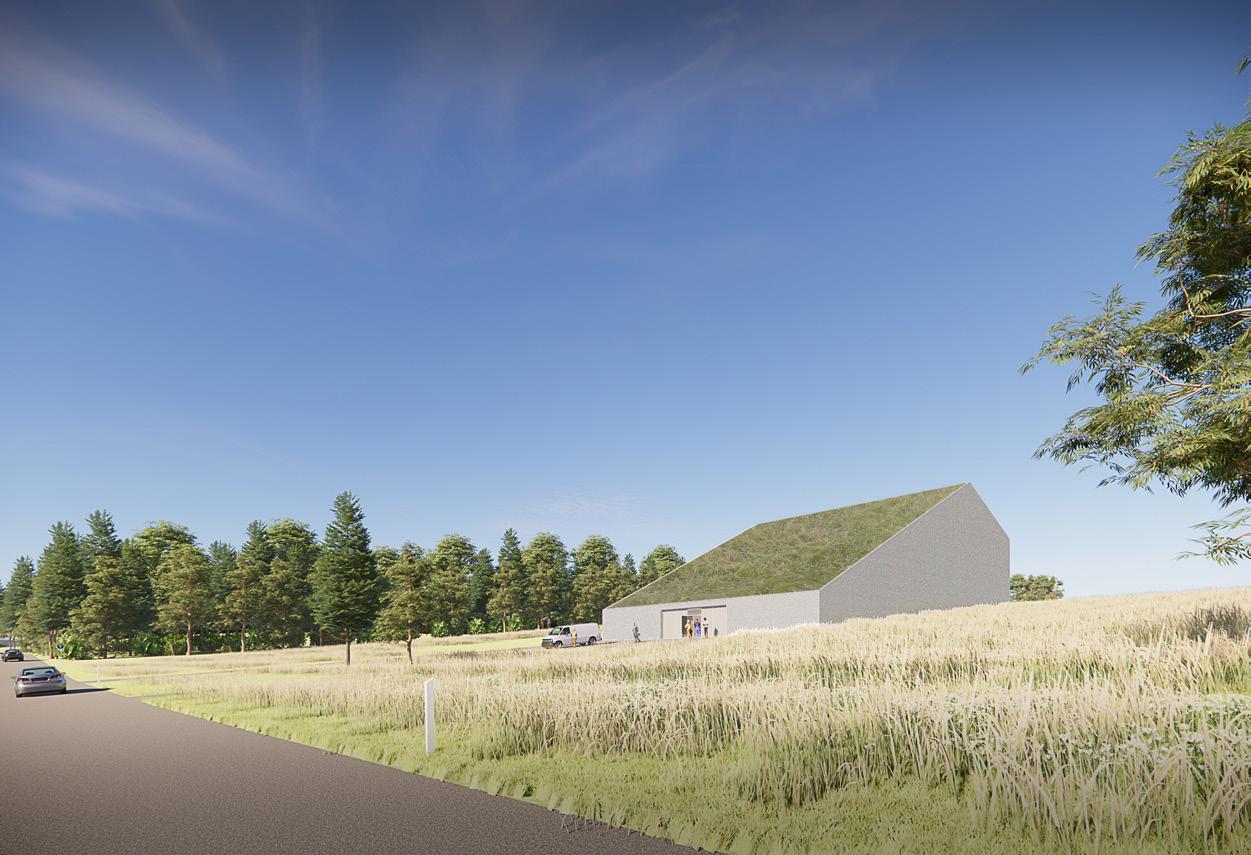
Internal water consumption in the
Group Units 2023
Verdo’s total water consumption1 m3 42,772
Note 1: Covers water consumption in Verdo companies in connection with operations, production and administration. The consumption by Verdo Vand A/S in its waterworks activities is calculated separately.
Water consumption
Verdo Vand A/S supplies clean drinking water to around 13,000 households in Randers and the surrounding area each day. This makes us one of the major water utilities in Randers Municipality. As with all water consumption for households and businesses, there is a risk of overusing water resources and pollution from wastewater. To address these risks, we can invest further in water-saving technologies and recycling systems, to reduce consumption and environmental impact.
Verdo Vand A/S is directly involved in protecting and managing water resources. This is reflected in our collaboration with the authorities and our internal operating policies.
We achieved a low leakage rate of 5.5% in 2023 (our target is below 10%). We thus avoided extra taxes and saved 133,852 m3 of water. In addition, 24,015
m3 of backwash water from filtration processes was responsibly discharged, demonstrating our commitment to minimising environmental impact. Verdo Vand’s total water consumption in 2023 was 2,441,058 m3, and we used the innovative Aqueduct Water Risk Atlas tool from WRI to ensure that water consumption in high-risk areas was responsibly managed.
Verdo Vand A/S is also busy preparing for the establishment of a new spring site and a new waterworks near Randers. The new spring site will replace Verdo’s oldest spring site at Oust Mølle, which has supplied Randers with drinking water for 150 years. The new waterworks will replace two old waterworks. It will differ from its predecessors in a number of ways. We aim to reduce energy consumption, and meet the energy consumption that remains using renewable energy. We also plan to plant forests at the waterworks as an element in better groundwater protection.
74 Annual report 2023
Verdo
| Climate and environment (E)
Illustration depicting Verdo’s upcoming waterworks.
Biodiversity – measures and resources
Verdo’s activities – especially the effects of biomass production on land use and emissions from energy production – can threaten biodiversity through habitat destruction and pollution. These factors can disrupt ecosystems and endangered species, leading to regulatory sanctions and harm to Verdo’s reputation.
Conversely, we have the opportunity to promote biodiversity by ensuring that our partners have integrated sustainable practices into their operations. By investing in biodiversity projects, we can not only compensate for our environmental impact but also enhance Verdo’s reputation and contribute to balance in local ecosystems.
Examples of activities in 2023
We implemented a number of initiatives in 2023 that contribute to improving biodiversity.
Verdo Go Green A/S donated thousands of trees to Biodiversitetsskoven in Viborg Municipality, which is expected to be planted in spring 2024. Verdo Go Green A/S and Verdo Trading A/S also planted trees in Danish public forests in collaboration with the Growing Trees Network Foundation. Planting trees helps protect groundwater, reduce carbon emissions and preserve vital biodiversity in nature. Verdo Vand A/S implemented specific biodiversity measures, such as allowing wild plants to grow freely in
selected areas around Vilstrup Waterworks and grazing cattle and sheep at the Oust Mølle spring site to combat invasive hogweed.
Verdo Trading A/S only buys certified biomass when it is wood-based. Certification ensures and documents that forests are being managed responsibly. Through certification, forest owners and companies help to maintain healthy forests, to the benefit of the current and future generations.
Number of trees planted for Verdo Go Green A/S and Verdo Trading A/S 2021 2022 2023 Planted trees 5,214 17,406 18,005
75 Annual report 2023 Climate and environment (E) |
Resource use and circular economy
Verdo faces potential resource inflow challenges, such as the risk of supply instability and price volatility for biomass and coal, which are crucial to our energy production and our earnings. Waste generation from operations and production represents an additional risk of environmental consequences and regulatory compliance costs.
Verdo can counter these challenges by optimising security of supply and by implementing recycling technologies to reduce waste from operations and production. By improving waste management, Verdo can minimise environmental impact and ensure compliance with strict environmental regulations.
Examples of activities in 2023
We implemented a number of initiatives in 2023 that contribute to responsible resource usage.
At Verdo Teknik A/S, we are working increasingly with our suppliers to find solutions in product development that will ensure maintenance and repairs are carried out efficiently. This will reduce the need for repeated visits by technicians and thus contribute to a more responsible use of resources, for example by reducing the kilometres driven. We will also strive in future to repair damage to components that no longer function instead of replacing the entire product (refurbishment).
Verdo Trading A/S, has tested recycled foil from several suppliers of foil for bagging wood pellets. We have tested products with 30% and 70% recycling, and hope to end up somewhere in between. This is primarily in relation to our clear foils. We consumed approx. 1,800,000 metres of such foil in 2023, equivalent to around 81 tonnes. If we use at least 30% recycling in our clear foils, this corresponds to a CO2 saving of approximately 40 tonnes.
Verdo Produktion A/S has a goal of continually improving the efficiency of the CHP plant. Efficiency was 2% better in 2023 than in 2022, resulting in a reduction in biomass consumption and better use of resources.
We are continuing to work on reducing food waste in Verdo’s canteen in Randers. As part of the waste sorting practice introduced by Verdo in 2022, we sort all food waste separately, for collection by Daka. In cooperation with
Daka ReFood, Verdo’s food waste is handled responsibly by recycling it instead of incinerating it. Daka reports that the food waste can be converted into biogas, fertiliser and second-generation biodiesel. Verdo’s canteen remains focused on reducing meat consumption and increasing the quantity of organic ingredients in Verdo’s canteen.
Our focus on waste management at Verdo means that we are careful to sort our waste. We thereby contribute to a higher recycling rate as a company. More recycling means less incineration and reduced consumption of natural resources.
Note: Calculated based on the quantity in kg and fractional breakdown reported in invoices.
76 Annual report 2023
Waste in kg per waste fraction Unit 2023 Hazardous waste kg 669,431 Electronic waste kg 1,872 Plastic kg 3,506 Steel and iron kg 31,640 Glass kg 1,162 Concrete kg 13,380 Household-type waste kg 32,217 Cardboard and paper kg 14,528 Food kg 7,114 Wood kg 13,400 Small items for incineration kg 1,180
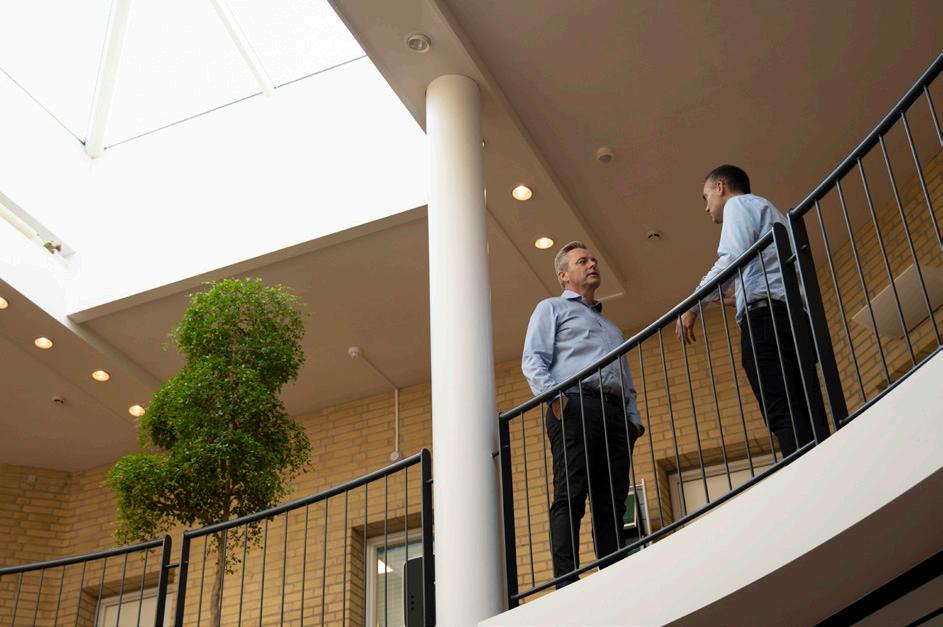
Social sustainability (S)
This section contains the statutory statement on social responsibility pursuant to section 99a of the Danish Financial Statements Act, in relation to social and staff factors.
Social responsibility is an essential element of corporate social responsibility. This covers factors such as how effectively a company is recruiting diversely, creating an inclusive atmosphere, ensuring competency development for employees and improving equality and security in pay and working conditions.
These can be important elements in attracting qualified labour and ensuring a diverse labour market. But social responsibility also covers the responsibility the company takes for its local community, i.e. social initiatives and initiatives that support a society with access to education, work and social security.
Verdo has identified risks in relation to compliance with human and labour rights. Regarding our own workforce, these risks must generally be seen in a Danish context. We actively integrate the principles of the ‘Danish model’ into our operations as a matter of course. The Danish model is a unique approach to labour market relations, where the parties (employers and trade unions) play a central role in determining pay and working conditions through collective
agreements. This system is built on a strong tradition of dialogue, cooperation and consensus between employers and employees.
We follow these principles at Verdo and are committed to open and constructive dialogue with employee representatives and trade unions. This ensures that working conditions – including pay, working hours and health and safety factors – are decided in a way that respects the rights of our employees and contributes to a positive working environment. We have internal policies and procedures at Verdo that support this for all our employees.
In relation to employees in Verdo’s value chains, we use our Code of Conduct to communicate our principles and guidelines for how to comply with international principles, laws and conventions for labour and human rights as a partner or supplier to Verdo. We have also set up a whistleblower scheme.
Read more about this in the section on Governance (G)
77 Annual report 2023
Social sustainability (S) |
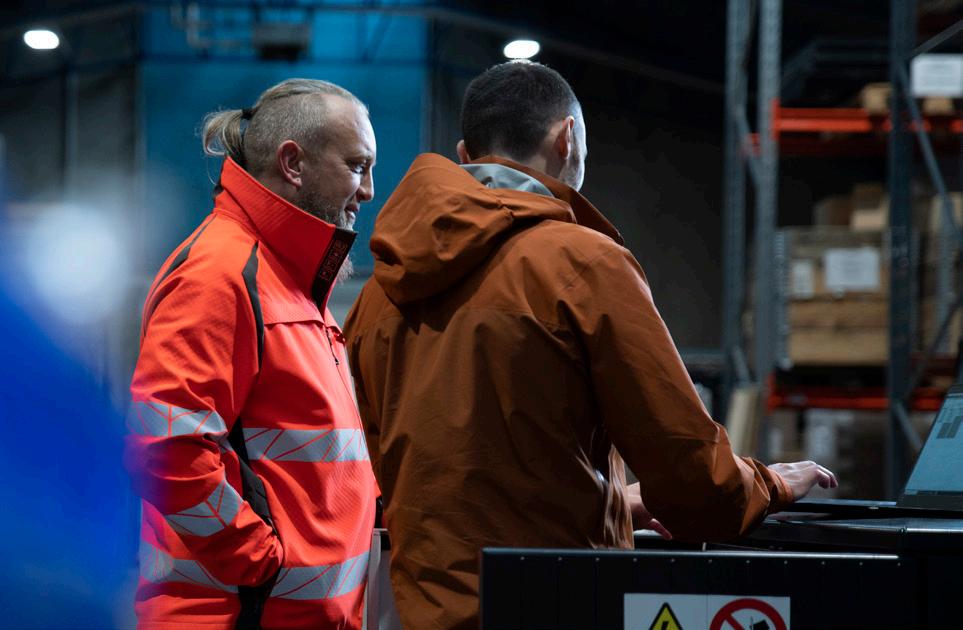
Own workforce
Verdo faces the risk of inadequate focus on health and safety, which could lead to employee accidents and negative impacts on productivity. Inequality and failure to pay attention to work-related rights can also lead to legal challenges and reduced employee satisfaction.
Selected Verdo policies
Health and safety policy
Policy for abusive behaviour such as bullying and harassment
• Senior policy
• Pension policy
Retention policy
Life stage policy
Apprenticeship and trainee policy
• Wage policy
On the positive side, Verdo has the opportunity to create a healthy and safe working environment and promote equality, diversity and inclusion. By integrating these principles into the company’s culture, values and policies, Verdo can improve employee commitment, attract talent and build a strong and motivated team dedicated to the company’s success and responsibility.
Policy for MUS (employee development talks)
Policy on the under-represented gender
• Recruitment guidelines
• Alcohol and drugs
Smoking guidelines
Working hours and time off
Working from home
• Sustainability policy
• GDPR – duty of disclosure, employees
78 Annual report 2023
| Social sustainability (S)
Employee gender composition
Verdo is committed to having a diverse workforce. This is reflected in the larger proportion of the underrepresented gender (women) in the younger age ranges. We focus on having an inclusive recruitment approach that embraces diversity in gender, age, ethnicity and other parameters, and adapt this approach specifically to each appointment. Although we do not measure ethnicity directly, an increase in the number of employees with non-Danish names during 2023 reflects a broader ethnic diversity.
Senior jobs are gaining popularity among employees and management, and are another important part of Verdo’s corporate social responsibility. These arrangements not only help to retain and transfer valuable knowledge at Verdo, they also support a more harmonious transition for employees moving towards retirement, which can reduce the risk of mental health challenges such as depression associated with this transition. Our approach to employee composition demonstrates our commitment to fostering a balanced, inclusive and supportive work culture.
Note: Calculated based on the number of employees as of 31 December 2023.
79 Annual report 2023
Employee gender
Unit 2021 2022 2023 Women Number - 102 119 Men Number - 428 471 Women Percentage 18.2 19.2 20.2 Men Percentage 81.8 80.8 79.8 Average age Women Age - 44 43 Men Age - 46 46 Youngest Women Age - 18 15 Men Age - 18 18 Oldest Women Age - 64 68 Men Age - 71 73 > Social sustainability (S) |
composition
Employee turnover
Verdo’s employee turnover in 2023 was 16.5% overall, covering employees who resigned, were terminated or held fixed-term positions that expired.
We recruited 197 employees during 2023, 159 of whom were still employed as of 31 December 2023. Seventy of these are specialists. There were also specialists among the 38 who ceased employment before 31 December 2023.
Of the staff who were employed as of 1 January 2023, 87 resigned during the year, while 439 were still employed at the end of 2023.
We have devoted many extra resources to recruitment in 2023 in order to find the necessary specialists in a labour market where there is high demand for this type of employee.
Note 1: Monthly calculation: (voluntary resignations + forced terminations (in FTEs) during the given month / FTEs employed on the 1st of the same month) * 100.
Note 2: We do not calculate employee turnover in FTEs, but based on the number of employees. Apprentices and trainees and employees appointed for agreed fixed terms are also counted, but as terminated by Verdo.
The underrepresented gender
This section contains the statutory statement on the gender composition of management pursuant to section 99b of the Danish Financial Statements Act.
Women are the underrepresented gender at Verdo. As of 31 December 2023, women made up 20.2% of all employees.
In order to achieve our 2025 targets, we will ensure, as far as possible, that there are female candidates in the final pool when appointing employees or managers. We will also increase our focus on nominating female candidates when there are elections to the Board of Representatives and the Supervisory Board. The aim of this approach is to help break down gender-based bias in our recruitment processes.
We have chosen to set targets for the proportion of the underrepresented gender in the supreme management body of the Verdo Group (Verdo a.m.b.a.), even though we are not obliged to do so under section 99b of the Danish Financial Statements Act, as the parent company, Verdo Holding A/S, has actually achieved an equal gender distribution for both the supreme management body and the other management levels.
Excerpt of policy on the under-represented gender
We believe that diversity creates value and is a strength for our employees and business that we can translate into results. Verdo seeks to focus on diversity and ensure equal representation in terms of gender, age and general composition in Verdo’s management bodies, as greater diversity in the management team makes us better able to handle and assess the considerations that allow Verdo to fulfil our values and the expectations of the outside world. We therefore strive to ensure that female employees feel that they have the same opportunities for careers and management positions as male employees.
Around 80% of Verdo Group employees are men, and the proportion of women decreases the higher we move up the management hierarchy. We are not alone with this demographic in the energy sector, but it is an area we want to focus on, in order to increase the representation of women. The Verdo Group therefore sets targets in order to increase the proportion of the underrepresented gender in our management bodies.
80 Annual report 2023
Unit 2021 2022 2023 Goal 2024 Total employee turnover % 22.8 18.4 16.5 15.0
Employee turnover
| Social sustainability (S)
When compiling information on gender in top management, we define top management as all employees with personnel responsibilities at three levels: At Group level (Group Management), at executive level (the Manager Forum) and at management level (Leader at Verdo).
We work with the underrepresented gender at Verdo at Group level, based on the three organisational levels defined in thetable ‘Gender and age in the top management level’.
We work in the same way with the underrepresented gender in the Verdo Group’s Board of Representatives and Supervisory Board, as defined in the table ‘The underrepresented gender in Verdo a.m.b.a.’s Board of Representatives and Supervisory Board’.
The Verdo Group aims to increase the proportion of the underrepresented gender in all management groups during the 2021-2025 strategy period.
With reference to section 99b of the Danish Financial Statements Act, the supreme governing body is the Supervisory Board of Verdo Holding A/S. This board consists of three members, one of whom is a woman, thus making up 33.3%. For the other management levels, the ‘executive’ organisational level consists of the Group’s CEO and the two staff directors of Verdo Holding A/S. The proportion of the underrepresented gender within this group of three people is 33.3%. For the management level that reports to the staff directors (managers in Verdo Holding A/S), the proportion of the underrepresented gender (women) is 3 out of a total of 7, or 42.9%. For the two groups combined, the proportion is 40% (see the table ‘Gender composition of the management of Verdo Holding A/S (the parent company) with reference to section 99b of the Danish Financial Statements Act’).
team (level 2)
Note: Women are the underrepresented gender at Verdo.
81 Annual report 2023
Employees Women Men %* Goal 2025 Group Management (level 1) 6 1 5 16.70% 33% Management team (level 2) 23 5 18 21.70% 25% Leader (Level 3) 48 4 44 8.30% 20% Total at top management levels 77 10 67 13.00%Age in
Management
Under 30 0 0 0 0.00%30-50 years 1 0 1 0.00%Over 50 years 5 1 4 20.00%Age
management
Under 30 0 0 0 0.00%30-50 years 11 3 8 27.30%Over 50 years 12 2 10 16.70%Age in other management (level
Under 30 2 0 2 0.00%30-50 years 24 2 22 8.30%Over 50 years 22 2 20 9.10%Age of all management Under 30 2 0 2 0.00%30-50 years 36 5 31 13.90%Over 50 years 39 5 34 12.80% -
Gender and age in the top management level at Verdo a.m.b.a.
Group
(level 1)
in the
3)
Social sustainability (S) |
The underrepresented gender in management and on the Board of Representatives and Supervisory Board
* Percentage of women on the Supervisory Board is exclusive of employee representatives.
** No Board of Representatives election.
Note 1: The Supervisory Board had 12 members in 2021, including 1 woman.
Note 2: The Supervisory Board had 10 members in 2022 and 2023, including 1 woman.
Note 3: A midterm election for the Supervisory Board will be held in spring 2024. Four board member positions are up for election. This opens the door for an increase in the proportion of female board members. No specific actions were taken in 2023.
Note 4: There will be an ordinary election for the Board of Representatives in spring 2026. This opens the door for an increase in the proportion of female members on the Board of Representatives.
Gender composition of the management of Verdo Holding A/S (the parent company) with reference to section 99b of the Danish Financial Statements Act*
Other management levels
*Management in the parent company (Verdo Holding A/S). The supreme governing body is the full number of members elected by the general meeting who make up the Supervisory Board of Verdo Holding A/S. Other management levels counted as the first management level – the Executive Board and directors who are at the same management level organisationally – together with the second management level, consisting of managers with personnel responsibility that report directly to the first management level.
We have noted that Verdo Holding A/S had achieved gender balance in the supreme management body on the balance sheet date. We are therefore exempt from the obligation to set a target figure for this.
We have also noted that Verdo Holding A/S has achieved an equal gender distribution at the other management levels. We are therefore exempt from the obligation to set a target figure and formulate a policy for the other management levels.
82 Annual report 2023
Unit 2021 2022 2023 Goal 2024 Goal 2025 Board of Representatives % 20 25 29 ** 304 Supervisory Board* % 81 102 102 203 25 Women on boards – foreign companies % - 33 25 25 25
Unit 2023 Total number of members Number 3 Percentage of the underrepresented gender % 33.3
Total number of members Number 7 Percentage of the underrepresented gender % 40
| Social sustainability (S)
An inclusive workplace
As part of our efforts to be an inclusive workplace, Verdo gave focus to diversity and inclusion several times throughout 2023. The benefits of working with these issues are many and well-documented, for example as regards innovation, customer insights, productivity, recruitment and employee retention. For example, by adopting a few simple but effective linguistic and visual measures we can contribute to greater inclusion in our general communication, thereby drawing in a broader field of suitable candidates for our vacant positions and improving the retention rate among current employees, while also assuming greater social responsibility.
New parental leave rules were introduced in Denmark in 2022 with the aim of ensuring full equality in connection with childbirth or adoption. Verdo supports the new model for parental leave, and an increasing number of our male employees are taking advantage of the opportunities for parental leave. We can thus affirm that the new model for parental leave is working as intended.
We also want to offer a high degree of flexibility to those employees who, for one reason or another, are no longer able or willing to carry on working full-time. Opportunities for reduced working hours, such as part-time employment, flex jobs, senior jobs etc., could come to play an important role in our workplace in the future.
We work with flex jobs in several ways. We have a special focus on retaining employees who are unable to work full-time due to health issues. This can be due to physical or psychological factors. We also have tasks suited to people working a few hours a day or a week. If these tasks have not naturally already
been assigned to existing employees, we look into whether they can be handled through our partnership with the local FlexVirk social enterprise, which seeks to help citizens on the fringe of the labour market find jobs.
Six people were employed in flex jobs at Verdo at the end of 2023. A further five employees are eligible for sickness benefits under section 56 of the Danish Sickness Benefit Act. If an employee has excessive absence from work due to long-term or chronic illness, a section-56 agreement may be entered into, whereby the company is entitled to receive sickness benefits from the first day of absence due to the given illness.
Section-56 employees and employees in flex jobs
We do not register disabilities among our employees at Verdo and therefore cannot report this figure.
However, we have a general aim of optimising working conditions for people with physical disabilities. We were previously only able to offer people with physical disabilities access to our head office in Randers via a ramp at the main entrance, and elevators inside the building, but in 2023 we also installed an automatic door in the building. We will provide disabled parking at the main entrance in 2024.
83 Annual report 2023
Total
Section-56 employees 5 0 5 Employees in flex jobs 6 0 6 > Social sustainability (S) |
Women Men

Inclusion and diversity on the agenda CASE
A two-day seminar was held for Verdo’s management team in September 2023. The focus was on diversity and inclusion and how these topics influence our efforts to create and develop the future workplace.
During the process, we became increasingly aware that we are all to some extent biased. One of the areas where this is particularly evident is in our use of language. We tend to be stereotyped in our use of language, repeatedly using the same words and phrases without thinking about the signals we are unconsciously sending. The management team therefore received training in how we can say the same things using different words and phrases, in order to become more inclusive and reach a broader audience with our messages. A simple step with a measurable effect!
We are continuing to focus on inclusion and diversity in 2024. For example, the staff departments responsible for Verdo’s employer branding and internal and external communications have received training.
84 Annual report 2023
| Social sustainability (S)
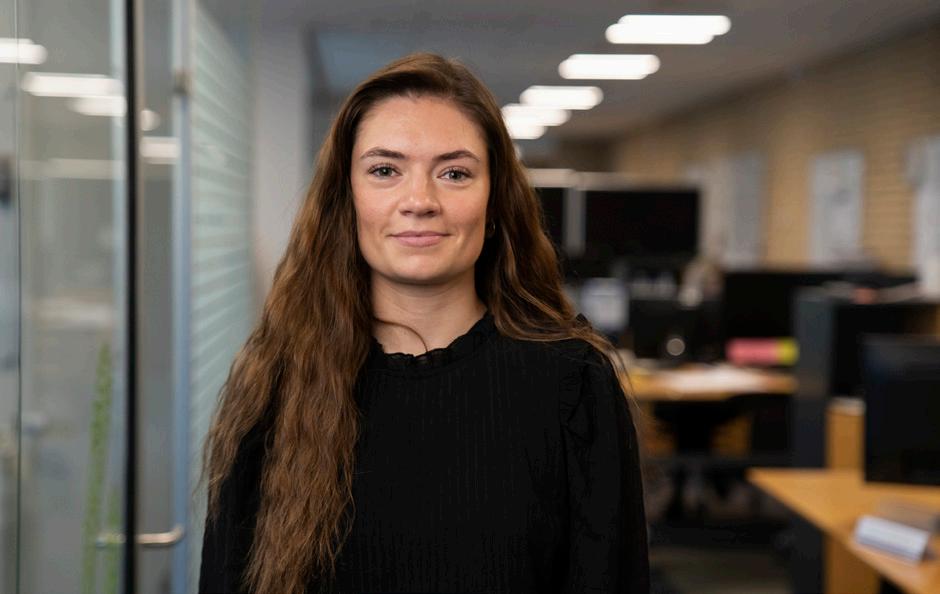
Employee training
The framework for our daily work has been changing in recent years. Verdo has also found that the battle for technical competencies, in particular, has intensified of late due to fierce competition for employees.
We are therefore working proactively to make the company an even more attractive workplace, and are giving high priority to training and development as part of these efforts. We strive to ensure that we attract, develop and retain the right competencies in an attractive working environment. Verdo Academy is a key element in this, where we have gathered all courses and training for both employees and managers.
We increased the number of days of training completed at Verdo Academy by 14% in 2023 compared to 2022. We will continue to offer online courses in collaboration with GoLearn throughout 2024, and also expect to offer a broader range at the academy.
MUS (employee development) talks completed
Excerpt from Policy for MUS
MUS (employee development) talks are held each year between managers and employees. These aim to ensure expectations are clearly aligned with each employee and support the connection between Verdo’s strategy and values, the department’s marketing plan and the employee’s daily work. The MUS talks also seek to ensure competent and motivated employees are retained and developed.
Note 1: Some of these 380 employees were appointed in 2024, and their MUS talk will not be held until 2024.
85 Annual report 2023
Number Women Men Employees eligible for MUS 380 74 306 Number of MUS talks completed 260 58 202 Percentage of MUS talks completed 69% 78% 66%
Social sustainability (S) |
Education at Verdo Academy
Note 1: Verdo Academy offers a range of internal courses with internal or external instructors, as well as some external courses with open classes (which include participants from other companies).
Note 2: A large number of professional courses are also held in the departments, which are not included in Verdo Academy, as well as supplier training courses and AMU courses. We do not have statistics on how many employees have participated in these.
Note: When we look at the proportion of trainees and apprentices in relevant companies, Verdo is close to meeting its target of 10% of the workforce being either trainees or apprentices. These are minimum targets. We changed our counting method in 2023 to state the percentage of apprentices and trainees in relation to all hourly and salaried employees, and not only in the companies where they are employed. Since several companies have neither trainees nor apprentices, this means that the reported percentage declined. A target has therefore only been set for apprentices in relevant companies.
Examples of activities in 2023
We implemented a number of initiatives related to employee training in 2023. For example, Verdo Teknik
A/S had a special focus on digitalisation and conducted a training programme for hourly paid employees in collaboration with external educational institutions, with the aim of upgrading their skills. We thereby equip employees
to take advantage of the new technologies and working methods that come with digitalisation. This includes everything from programming to advanced problem solving, making life easier and more productive for employees –both at work and at home – and for Verdo.
86 Annual report 2023
Apprentices and trainees Unit 2020 2021 2022 2023 2024 target Trainees as % of all salaried employees % 4 3 15 3Apprentices as % of all hourly paid employees % 16 10 10 7Trainees as % of salaried employees in relevant companies % - - - 10Apprentices as % of hourly paid employees in relevant companies % - - - 10 10
People Courses Time in hours Total hours Anti-corruption 339 - 1 339 IT awareness 673 - 2 1,346 Microsoft 365 - 238 1 238 Digital classroom (October, November and December 2023) - 76 2 152 Basic management training 9 - 44.4 400 Applied economics 12 - 22.2 266 Sales psychology 16 - 44.4 710 NLP training 1 - 59.2 59 Masterclass in Digital Transformation 12 - 44.4 533 Total number of hours 4,043 Total number of working days 546
New trainee programme will make Verdo more resilient
We intensified our focus on talent development in 2023, launching our own trainee programme at Verdo Trading last autumn. We will begin training the next generation of traders ourselves. Resilience is key, as we want to ensure that we have the right resources to continue growing the business, while also ensuring that we have skilled alternatives if key employees leave.
We have put together a two-year course where we offer a combination of education, courses and on-the-job training with our own traders and logistics/shipping people.
Nadja Iversen really enjoys the flexible programme
Verdo Trading has taken on three new trainees. Nadja Iversen, based at the head office in Randers, is one of them.
“The trainee programme lets me fulfil my desire to go abroad while also having the opportunity to work in two interesting areas –shipping and the energy sector,” says Nadja. She adds that she also finds it exciting to get to know all aspects of the business and culture. “It gives me a good understanding of the company and allows me to look at things from various angles, which I see as a clear strength.”
Nadja Iversen also highlights the flexibility of the programme, as she can help shape the academic content.
“I get great support from management for my thoughts and ideas. They encourage me to question the existing way of doing things. Not only in the trainee programme, but also the way the business is organised,” says Nadja. She also makes no secret of the fact that having got off to such a good start, she can already envisage a future career at Verdo.
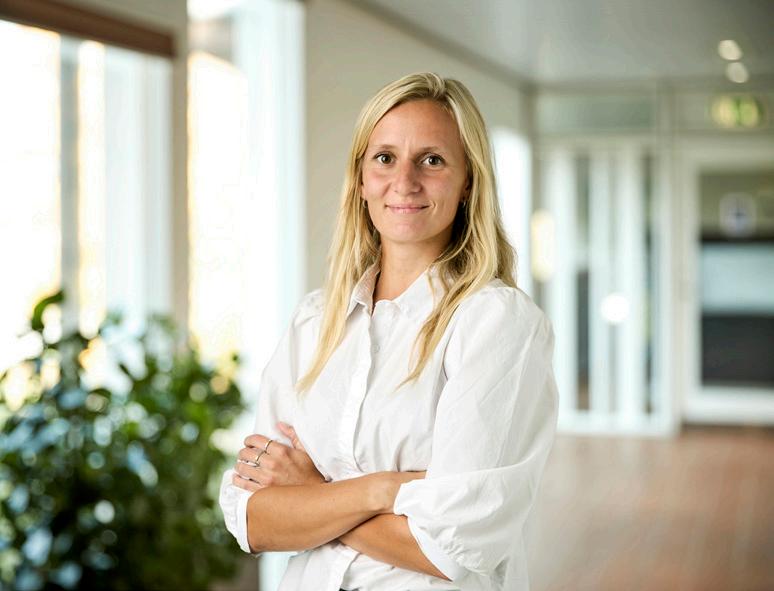
87 Annual report 2023
CASE Social sustainability (S) |
Health and safety
Verdo has a strategic goal of being an attractive workplace. We therefore take good care of our employees and have a strong focus on their health and safety. The Verdo Group has the goal of always complying with all laws, requirements and agreements in relation to a good working environment and a high level of safety for all Group employees. We strive to ensure that we qualify for a ‘green smiley’ at all times – the Danish Working Environment Authority’s symbol recognising a good and safe working environment.
It is our goal to maintain and develop a working environment that protects the Group’s employees from health and safety impacts which could lead to accidents, long-term strain or higher absence rates. We also seek to maintain a good psychological working environment, where all employees thrive and have the opportunity to develop professionally and personally. This goal is reflected in part in a number of videos on Verdo’s intranet which focus on how to hold physically active meetings, how to vary working positions, and how to prevent stress.
We have performed regular workplace assessments (WPAs) in recent years, including in 2023. This has resulted in updated WPA action plans setting out the initiatives to be implemented to improve OHS. The space challenges at our head office in Randers and at our location in Storvorde have also been given high priority. In Randers, we worked to identify how we can best address this challenge within the current framework, based in part on an analysis conducted by a firm of architects in 2022. In relation to Storvorde, we decided to build new premises in Aalborg with better space and facilities. The new premises should be complete by the end of 2024.
We will continue to focus in 2024 on how the head office can be changed/renovated to meet employee needs and accommodate current and future working patterns.
Near-miss incidents
A total of 167 near-miss incidents were registered in the Danish part of the Verdo Group in 2023.
We are carrying on the efforts made in previous years to get managers and employees to register all nearmisses. Registrations contribute important knowledge about current behaviour and thus what efforts we need to focus on. There is a greater focus on completing a risk assessment before starting tasks. This ensures the necessary focus on any risks associated with execution of a task already at the planning stage.
Our goal is always zero accidents, and while we have not yet achieved this, it is our clear view that even one accident is one too many.
Accidents at work with absence
Abusive behaviour and bullying
Verdo has had a whistleblower scheme in place for several years, allowing employees to report various matters, including abusive behaviour. No reports of abusive behaviour or harassment were registered through this scheme in 2023. However, we had two reports of bullying in our latest WPA. These have been addressed by Verdo’s HR department and the OHS organisation.
Note: Our method for calculating absence due to illness is still under development. Unlike in previous years, we did not distinguish between long-term and short-term illness in 2023. On a monthly basis, absence due to illness for salaried employees fluctuated between 2-4%. For hourly
was
4.9%. Target figures are maximum levels.
88 Annual report 2023
Unit 2021 2022 2023 Goal 2024 Number 7 4 7 0 Absence due to illness 2021 2022 2023 Goal 2024 Salaried employees avg. 1.23% 2.54% 3.80% 2% Hourly paid employees avg. 4.84% 4.91% 3.40% 3%
figure
| Social sustainability (S)
paid employees, the corresponding
between 1.2-
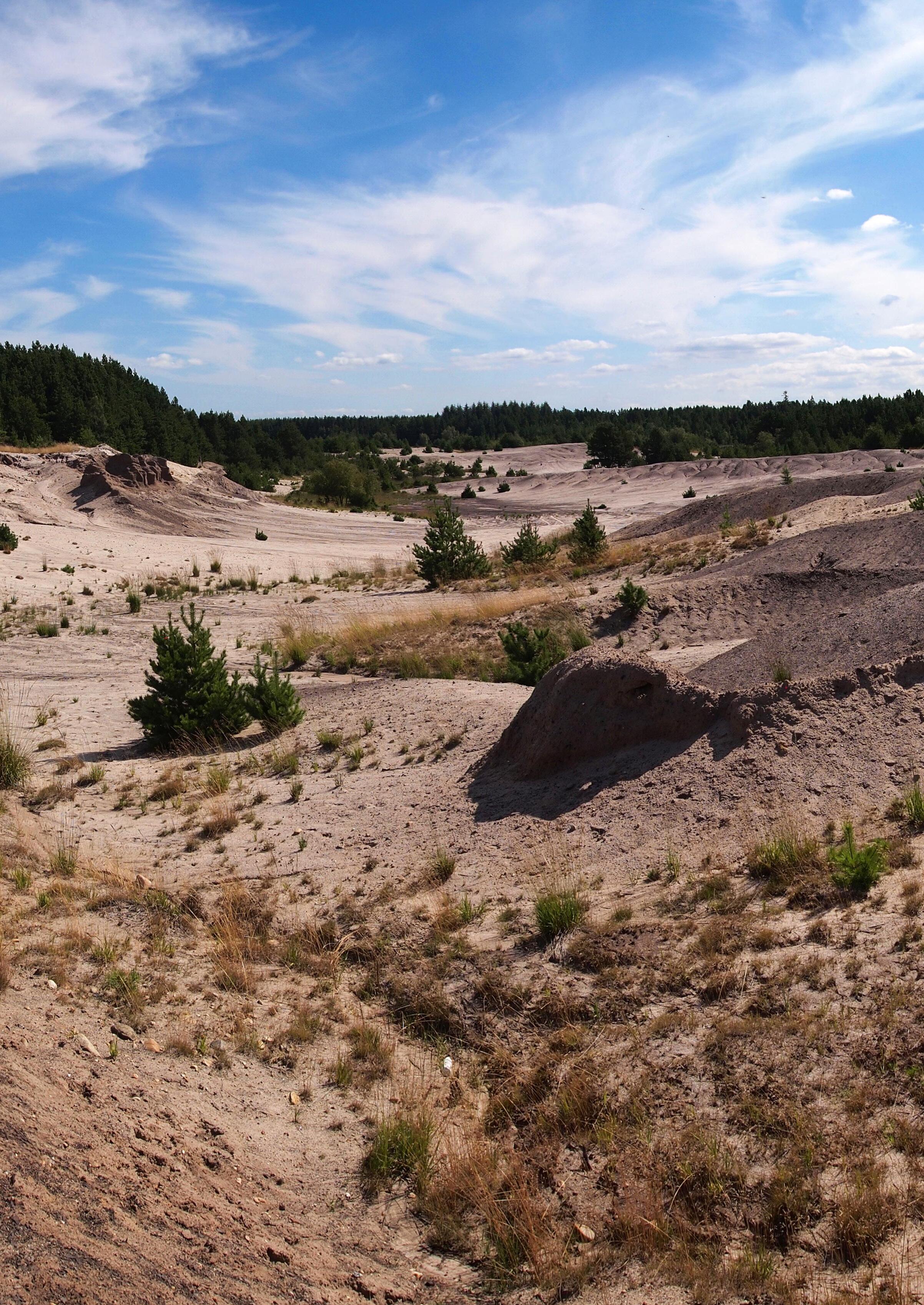
89 Annual report 2023
Work-life balance
Excerpt from Verdo’s Life Stage Policy
Verdo has a focus on the varying needs of employees at different stages of life and in different life situations. We seek to foster an inclusive workplace that focuses on opportunities to support employees in all phases of life – whether young, elderly, parents with young children or those struggling with illness – while also respecting the interests of the given workplace.
The aim of this policy is to ensure a good work-life balance, for the benefit of both employees and the workplace. We will do this by creating an attractive workplace, where there is room to consider the needs of the individual in order to attract, motivate, develop and retain employees, and to cater to diversity in the workforce.
The policy must also ensure that knowledge is transferred from senior employees to the next generation in a flexible way that is good for everyone.
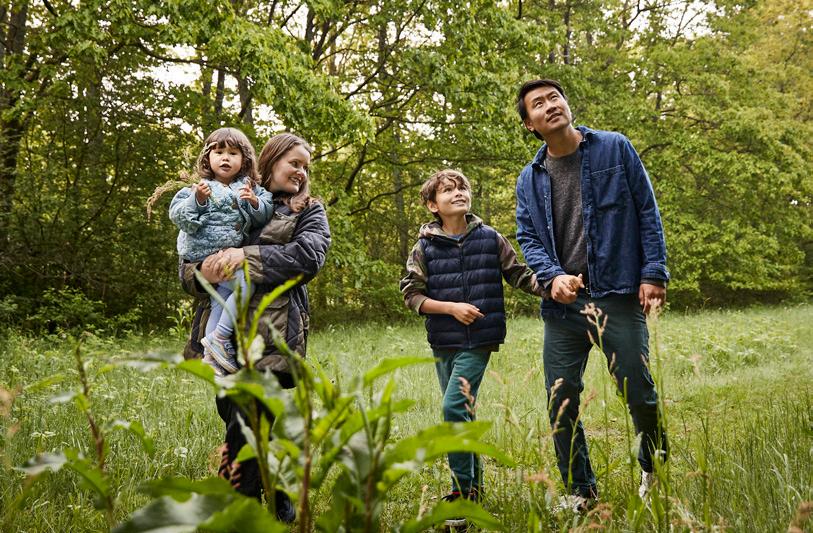
Pay gap
There is a pay gap between men and women of 10% in favour of men at Verdo. This is a decrease compared to the figure of 11.25% in 2022. The proportion of women with specialised or managerial jobs increased by 3% in 2023. The average salary for this group has also risen from DKK 56,150 to DKK 58,700.
pay gap (all employees)
Note: Gross salary including pension for all permanent employees, including Group Management. Excludes trainees and student assistants. Part-time jobs have been converted to full-time equivalents.
90 Annual report 2023
Number of seniors
2022 2023 Employees in senior jobs 4 9 Men 3 8 Women 1 1
2022 2023 Women (average salary in DKK) 44,674 46,163 Men (average salary in DKK) 49,700 51,294 Percentage difference 11.25 10.00
60+
Gender
| Social sustainability (S)
Affected communities – local communities
As a utility company, Verdo is aware of the risk that local resistance may arise if supply disruptions, price changes or the like negatively impact the local community. Political decisions and changes in legislation can also create both challenges and opportunities.
We have the opportunity to be a key player in community development by providing reliable and responsible utility services. By focusing on green initiatives and maintaining transparent communication, Verdo can not only promote
sustainability in the community, but also ensure that our activities reflect its needs and expectations. This strengthens long-term relationships and creates a platform for constructive dialogue and cooperation with local stakeholders, including political players and civil organisations. This helps to ensure that Verdo respects human rights in the local community, for example through access to infrastructure and energy supply and the possibility of participation via Verdo’s Board of Representatives.
Examples of activities in 2023
We established and carried on a number of initiatives in 2023 that contribute to the development of our local community in various ways.
Verdo entered into a comprehensive climate partnership with Randers Municipality in November 2022, and we further developed this in 2023. One of the goals of the agreement is to supply water and heat from fossil-free production throughout the municipality by 2030. The municipality will also strive to support Verdo’s work in achieving this ambitious goal. Under the climate partnership, electricity, heat pumps and similar renewable energy technologies will be some of the primary energy sources in Randers. Verdo will also work towards utilising waste heat from local companies, establishing PtX plants and phasing out biomass for heat production. We aim to promote afforestation, with a focus on protecting drinking water and developing recreational areas.
Another major project is the development of Energy of the Future in Randers and Herning. Towards 2025, we will draw
up a comprehensive plan in close cooperation with local players that aims for a future fossil-free heating supply for residents of the two municipalities. There are many options in play – such as solar heating, solar cells, wind, geothermal, electric boilers, heat pumps, excess heat from industry, biomass and waste incineration – and the mix of energy sources and the coupling between them is crucial for the development of a secure, green and economically attractive heating supply.
Verdo also supports the local communities we are part of with a wide range of sponsorships. We thereby seek to engage in active partnerships, from which both Verdo and the sponsorship recipients – as well as local citizens –get value. Each organisation we have chosen to sponsor is actively contributing to building the community. Our sponsorships therefore include a large number of sports clubs and cultural institutions. We also regularly support charitable causes.
91 Annual report 2023
Consumers and end-users – customers
This section contains the statutory statement on our policy for data ethics pursuant to section 99a of the Danish Financial Statements Act.
Verdo faces the risk of information-related consequences, where inadequate handling of customer data could lead to breaches of data ethics and mistrust among customers. As a utility company with access to extensive data on consumption and consumption patterns, we are under a strict obligation to ensure data security and privacy. This wealth of data also holds opportunities for Verdo to drive digitalisation, innovation and behavioural change. By using data ethically and responsibly, we can offer tailored solutions, improve efficiency and support customers in making more responsible choices. This can strengthen our customer relationships and position Verdo as a reliable, innovative partner in our customers’ daily lives.
Data Ethics Policy
Based on the above, Verdo has recognised the need for a Data Ethics Policy, which was therefore formulated in 2023. Since the policy is completely new, we have no practical experience with its implementation as yet. We also have no concrete examples of how we handle data ethics issues in our organisation. We will be gaining experience with this moving forward.
We expect to use the tools from the Danish Data Ethics Council as a foundation. These are designed to make data ethics concrete and manageable and provide insight into potential advantages and disadvantages of data use. Our goal is to ensure that key data ethics decisions are based on solid and well-informed insight.
The first activity will be to implement data ethics in our IT project model, so that we identify and analyse how data usage is handled every time we start a new project or change existing systems. We can then weigh and balance the various data ethics considerations based on this. Once this is implemented, we will assess what the next activity should be based on our initial experiences.
Excerpt from Data Ethics Policy:
The purpose of this policy is to establish common principles and guidelines for the ethical, responsible and transparent collection, processing and use of data at Verdo, now and in the future.
Our data ethics policy aims to clarify how we work with data ethics and data usage, and create a framework for data ethics behaviour. The policy must support and supplement our CSR and data protection policy.
Verdo processes many types of data, and it is important to us that our employees, customers, partners and other stakeholders can trust our ethical handling of data.
The policy covers the entire Group and binds all employees who process data at Verdo.
92 Annual report 2023
| Social sustainability (S)
Secure, simple and easy – are the keywords for Verdo’s utility services customers
As an energy and utility company – and especially in the wake of an energy crisis and high energy prices – one of our key tasks is to instil a sense of security and make life easier for utility customers. We have a strong focus on this at Verdo.
We therefore launched a number of activities in 2023 that will help customers feel more secure and make it easy for them to be our customers. We present a selection of these activities below.
My Verdo version 2.0
All Verdo’s utility customers have access to our app, My Verdo, where they can view bills and monitor the hourly electricity price and their own consumption. Sector surveys from EPSI, which measure customer satisfaction with electricity suppliers in Denmark, clearly reveal that there is scope for improving our app. We therefore markedly improved the app’s uptime in 2023 and introduced several new features, such as the option to change payment method and electricity agreement directly in the app.
Customer’s choice
In the past, utility services have been of low interest to most Danes, but the energy crisis dramatically changed this, making people aware of electricity prices and electricity agreements in particular. Heightened interest and demand from our customers resulted in us becoming one of the first electricity companies in Denmark to offer the option of paying monthly in arrears for actual electricity consumption in 2023. We also retained the option of quarterly settlement with partial payment on account, so customers can choose which agreement they want.
AI joins the workforce
Our customer service team introduced AI into the workflow to reduce the response time for
emails to customers. The tool is currently at the testing stage with selected employees. The plan is for all employees in the customer service team to actively start using AI in their daily work in 2024. If AI can help the Customer Centre answer 11 emails instead of 10 in an hour, it will make a big difference to the total picture. The plan in 2024 is also to assess whether – and how – AI can help with other parameters in the Customer Centre for the benefit of our customers.
Text messags alerts for ruptures, leaks and frost
As another step in making life easier for our customers, we have launched a text message service for our water customers. The digital water meters that have been installed at customers’ premises have not only made it easier for customers to monitor their water consumption, they are also feeding valuable data to the utility companies. Digital water meter readings can reveal ruptures and leaks in the water installation. They can also detect freezing temperatures at the water meter, which can lead to burst pipes. The text message service thus helps customers avoid excessive water consumption or expensive repairs in connection with ruptures, leaks and frost.
Customer satisfaction in focus
Verdo’s Customer Centre has seen a marked and positive increase in customer satisfaction over the past few years, and the goal is, of course, to continue this trend. The customer satisfaction survey is conducted in collaboration with Capturi, based on the AFINN model. It measures the proportion of conversations with the company’s customers that are weighted as positive, medium or negative, on a scale from 0 to 100.
93 Annual report 2023
CASE
Social sustainability (S) |
Governance (G)
The demands to run a responsible company that contributes positively to the local community are increasing, and there is strong awareness of whether companies act responsibly and ethically. In order to run a responsible company, it is necessary to have the right structures and frameworks in place for how the company is managed, to ensure responsible behaviour at all levels of the organisation.
The trustworthiness of companies is closely linked to their ability to demonstrate high ethical standards and integrity in all their activities. The governance structure helps to ensure transparency and trust, and a foundation for contributing to responsibility and a positive impact on the economy and society as a whole.
Governance and a responsible corporate culture represent both risks and opportunities at Verdo. The risks are associated with meeting the high international standards for responsible corporate governance and our own Code of Conduct, especially in relation to consistent enforcement and adapting to changing expectations in society and among stakeholders. Failure to comply with these standards could lead to a loss of trust among customers, suppliers and business partners, as well as potential legal and financial consequences.
On the opportunities side, Verdo’s commitment to responsible practices, as defined in our Code of Conduct, offers an opportunity to enhance our reputation and build strong, long-term relationships with stakeholders. This paves the way for greater customer loyalty, attracting talent and potential partnerships with like-minded organisations –all contributing to our growth and success.
We are conscious of the risks associated with corruption and bribery in our value chains. We operate in complex international markets where the risk of corruption exists – particularly in connection with natural resources such as coal and biomass. Risks could include illegal payments to secure contracts or favourable business conditions through bribery. There could also be a risk of regulatory manipulation, or subcontractors or partners engaging in corrupt practices.
To address, identify and mitigate these potential risks, it is crucial that we conduct due diligence in relation to business partners and subcontractors. Verdo has anti-corruption
policies in place, and training is organised for employees and management. Moreover, we have established a secure and anonymous whistleblower system allowing employees and external parties to report any suspicions of corruption without fear of retaliation. Verdo also has a Code of Conduct that addresses this issue. We share this with our partners and will require our strategic suppliers to sign it in the future – especially where there is deemed to be high risk.
Excerpt from Verdo’s Code of Conduct
Verdo’s Code of Conduct defines our requirements and expectations of everyone we work with. However, our demands do not only apply externally, but also to our employees. It is just as crucial that our suppliers, partners and other external stakeholders trust us, as it is that we trust them. Our requirements and expectations of all stakeholders – internal and external – must reflect the sustainable development Verdo is undergoing, and the direction society is moving in. We therefore continually adapt the code.
Our Code of Conduct is based on the UN Global Compact’s 10 principles for responsible business conduct and internationally recognised conventions and guidelines related to responsible business conduct in the areas of human rights, labour rights, protection of the environment and anti-corruption. Our Code of Conduct is also based on the OECD guidelines for responsible business conduct, the UN Guiding Principles and the International Bill of Human Rights, including the ILO Declaration on Fundamental Labour Rights.
Verdo continued to work on implementing the Code of Conduct in 2023. The greatest risks were identified in Verdo Trading A/S and Carbon Partners AS. Getting suppliers and partners to sign the Code of Conduct has therefore been one of the bonus targets in these companies. An initial focus on suppliers in the Trading division means that there will only be full focus on the Code of Conduct for other suppliers, handled in the purchasing department, at the start of 2024. At the time of writing, Purchasing is experiencing success with this.
94 Annual report 2023
| Governance (G)
Implementing the Code of Conduct in Trading: A commitment to responsibility and transparency
In the Trading division, we recognise the necessity of having a strong and clear Code of Conduct as the foundation for our business practices. The Code of Conduct serves as a clear manifestation of our commitment to responsibility, due diligence and ethical conduct. With a special focus on our biomass and carbon product segments, it has become clear that while our biomass products can easily comply with the requirements of the Code of Conduct, we face greater challenges in the carbon segment.
Our Code of Conduct not only constitutes an internal standard, but also represents our commitment to international norms and legislation. This commitment is particularly relevant in geographical areas such as South America, where implementation of the Code of Conduct presents difficulties. In a world where consumers and business partners demand transparency and ethical responsibility, the Code of Conduct serves as a tool to enhance our reputation, ensure long-term trust and create a healthy corporate culture.
Our Code of Conduct serves multiple goals. In the short term, we are focusing on getting our suppliers to sign the Code of Conduct. There is also a focus is on internal implementation and ensuring full compliance among all employees. Longer term, our aim is to integrate ethical considerations into all business decisions and processes. Continual assessment and evaluation
of business partners is also a key part of our strategy for ensuring that our business practices are responsible and in line with best practices in the sector.
In our due diligence processes, we obviously have different risk profiles across geographies and products. But we have a consistent approach to responsibility and ethics across all our operations, regardless of geographical location. We have a clear plan for achieving these goals. Supplier compliance with the requirements of the Code of Conduct is crucial, and we have introduced a process where suppliers must indicate which parts of the Code of Conduct they can fulfil.
Together with our plan to revise and heighten the requirements in the Code of Conduct every two years (next time in 2025), these constitute our concrete initiatives to ensure that our Code of Conduct is not just a document, but a living and essential part of our corporate culture, where we understand our business partners and have the opportunity to contribute to changes and solutions.
At Verdo, we understand that success should not only be measured in economic terms, but also in how we interact with our planet, society and the people we work with. Our Code of Conduct is the cornerstone of this mindset, and is essential to our ongoing efforts to build a company where ethics, integrity and responsibility are not just words, but actions.
95 Annual report 2023
CASE
> Governance (G) |
Signed Code of Conduct for Verdo Trading A/S
Signed Code of Conduct for Carbon Partners AS
96 Annual report 2023 CASE –continued 70% 60% 50% 40% 30% 20% 10% 0% Jan-23 Feb-23 Mar-23 Apr-23 May-23 Jun-23 Jul-23 Aug-23 Sep-23 Oct-23 Nov-23 Dec-23 Realised 0% 0% 0% 0% 0% 0% 0% 0% 15% 54% 54% 62% Goal 0% 0% 0% 5% 10% 15% 15% 20% 30% 40% 50% 60%
80% 70% 60% 50% 40% 30% 20% 10% 0% Jan-23 Feb-23 Mar-23 Apr-23 May-23 Jun-23 Jul-23 Aug-23 Sep-23 Oct-23 Nov-23 Dec-23 Realised 0% 0% 0% 0% 0% 0% 0% 0% 0% 36% 58% 73% Goal 0% 0% 0% 5% 10% 15% 15% 20% 30% 40% 50% 60%
| Governance (G)
Excerpt from Verdo’s whistleblower scheme
Verdo is an organisation with an open company culture, and we strive to uphold good business ethics. However, we recognise that unethical behaviour occurs in most organisations, and that having an open company culture is not always enough to eliminate this.
To combat unethical behaviour more effectively, we therefore decided to implement a whistleblower scheme, as employees and external affiliated parties are often the first to notice unethical behaviour. The whistleblower scheme is hosted by an external provider and allows breaches of Verdo’s Code of Conduct or violations of the law to be reported via Verdo’s website and intranet. These include issues related to bribery and corruption, competition law, fraud, financial crime, harassment and discrimination, international trade control, protection of personal data, rights and protection of individuals, serious damage to the environment and conflicts of interest.
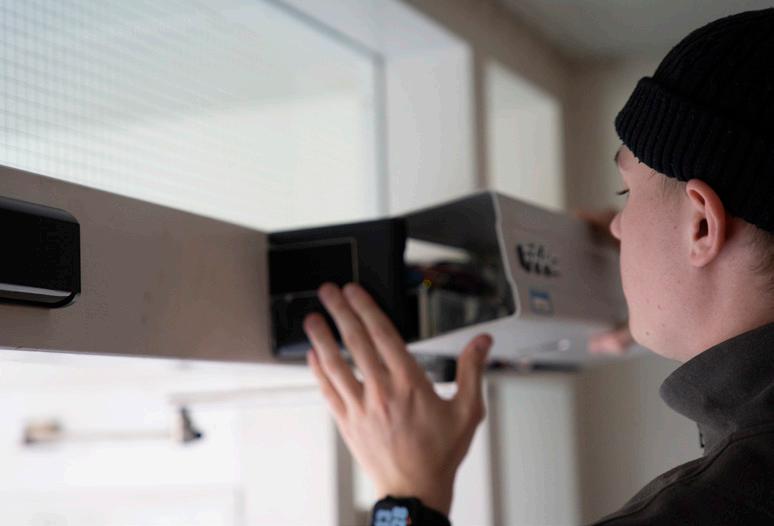
Reports registered through the whistleblower scheme
Note: Calculated as number of reports. *The WB scheme was established in 2021, but Verdo received an anonymous report by letter in 2020.
Anti-corruption and anti-bribery
Verdo has a zero-tolerance policy towards activities of a corrupt or dishonest nature. We undertake to refrain from all forms of corruption and bribery, be it direct or indirect, including extortion, fraud, facility payment or money laundering. We also take a stand against all types of abuse of entrusted power for the purpose of private gain, such as embezzlement, fraud and abuse of office. We have a constant focus on this area, and we are aware that we operate in countries where there is a greater risk of bribery and corruption than in Denmark.
Course in anti-corruption
In relation to corruption, situations can arise where it can be difficult for the individual to know where to draw the line. There are many grey areas, for example, in relation to receiving gifts and doing favours in the business world. All Verdo’s salaried employees, both in Denmark and abroad,
therefore completed an e-learning course in anti-corruption in 2023. The aim was to ensure that employees have the knowledge and tools needed to identify, handle and prevent corruption.
Training in anti-corruption for employees, management and Supervisory Board
97 Annual report 2023
2020 2021 2022 2023 Internal 0 0 0 0 External 1* 0 0 0
People Time in hours Hours Anti-corruption 339 1 339
Governance (G) |
scope 1
emissions – scope 2 Location-based
tions6
outside of scopes 1-3 Direct biogenic emissions7
Market8
Location8
98 Annual report 2023
Unit 2020 2021 2022 2023 2024 target Goal
Direct emissions –
Tonnes CO2e - - 12,728.00 24,981.61* Indirect
Tonnes CO2e - - 1,342.00 1,171.28*
Tonnes CO2e - - 72.00 110.11 -Emissions – scope 33 Tonnes CO2e - - - 15,642.72 -Employee commuting4 Tonnes CO2e - - - 763.34 -Business travel5 Tonnes CO2e - - - 652.95 -Waste from opera-
Tonnes CO2e - - - 2.23 -Emissions
Tonnes CO2e - - 280,084.00 248,885.41 -Total GHG emissions –
Tonnes CO2e - - - 40,734.44 -Total GHG emissions –
Tonnes CO2e - - - 42,439.28 -Energy intensity9 GJ/million DKK - - - 234.66 -Energy intensity MWh/million DKK - - - 65.18 -GHG intensity –Market10 Tonnes CO2e/million DKK - - - 10.26 - -
| ESG table
Environment
Climate accounts1
Indirect emissions –scope 2 Market-based
ESG table
GHG intensity –Market10 Tonnes CO2e/million DKK
Verdo’s total water consumption11
1 We have used the GHG protocol to calculate our climate accounts. No volatile emissions were included for 2022 and 2023.
*Verdo follows national CO2e reduction targets.
2 Verdo has purchased green power certificates under the leaf labelling scheme equal to our total electricity consumption. We have therefore used an emission factor for electricity of 0 g CO2e per kWh for our market-based emissions.
3 We do not know our full scope 3 emissions, or what percentage the calculated amount represents. For 2023, we included emissions from employee commuting, business travel and waste from operations. See these key figures in the table below.
4 Calculated based on survey of transport behaviour among employees with no company car.
5 Calculated based on travel company report and invoice information.
6 Calculated based on the quantity in tonnes and fractional breakdown reported in invoices.
7 Biogenic carbon emissions from the combustion of biofuels (e.g. biomass, biogas, bioethanol and biodiesel) are calculated outside of scopes 1, 2 and
3. Under the GHG protocol, emissions from the combustion of biomass are considered to be net zero for scope 1 direct emissions, as the biomass absorbs CO2 during its growth phase equivalent to the amount released during combustion.
8 Total scope 3 GHG emissions.
9 Total energy consumption compared to revenue.
10 Calculated as total GHG emissions (t CO2eq)/revenue in DKK.
11 Covers water consumption in Verdo companies in connection with operations, production and administration, except for a few locations where consumption is not specified on bills. Consumption by Verdo Vand A/S for waterworks activities is calculated separately.
12 Calculated as quantity in tonnes according to invoice.
13 Calculated as emissions for CHP plants including oil-fired heating plants.
99 Annual report 2023 Unit 2020 2021 2022 2023 2024 target Goal
- - - 10.69-
m3 - - - 42,940.00 -Total waste 12 kg - - - 121,186.00 -Hazardous waste kg - - - 1,187.00 -Other waste kg - - - 119,999.00 -NOx emissions13 Kg 163,772 242,079 181,176 153,758 - -
ESG table |
Social
Employee gender composition14
on 31 December15
The under-represented gender in the Verdo Group17
Employee
100 Annual report 2023
Unit 2020 2021 2022 2023 2024 target Goal
Number of employees
number - 494* 530 590 -Women employed number - 89 102 119 -Women employed % - 18 19 20 -Men employed number - 405 428 471 -Men employed % - 82 81 80 -Employee turnover16 % - 23 18 17 15 -
gender composition at top management levelsAt group management level (1)18Women19 % - 17 20 17 -Men % - 83 80 83 -At executive level (2)20 number - - - - -Women % - 16 22 21 - 25 Men % - 84 78 79 - 75 At management level (3)21 - - - - -Women % - 13 13 11 - 20 Men % - 87 87 90 - 80 Total at top management levels Women % - - - 13 -Men % - - - 87 -Women under 3022 number - - - 0 -Men under 30 number - - - 2 -Women aged 30-50 number - - - 5 -Men aged 30-50 number - - - 31 -| ESG table
by age group in the Verdo Group23
101 Annual report 2023 Unit 2020 2021 2022 2023 2024 target Goal Women over 50 number - - - 5 -Men over 50 number - - - 34 -Employees
Under 30: - - - - - -Women % - - - 23 -Men % - - - 77 -Aged 30-50: - - - - - -Women % - - - 23 -Men % - - - 77 -Over 50: - - - - - -Women % - - - 17 -Men % - - - 84 -Gender composition on the Board of Representatives (Verdo a.m.b.a.)24 Women % - 20 25 25 * 30 Men % - 80 75 75 -Gender composition on the Supervisory Board (Verdo a.m.b.a.)25 Women % - 8 10 10 20* 25 Men % - 92 90 90 -Gender composition on boards – foreign companies (Verdo a.m.b.a.)26 Women % - - 33 25 25 25 Men % - - 67 75 80Gender composition of management in the parent company (Verdo Holding A/S)27Supreme governing body Total number of members number - - - 3 -Percentage of the underrepresented gender % - - - 33 -ESG table |
102 Annual report 2023 Unit 2020 2021 2022 2023 2024 target Goal Other management
Total number of members number - - - 7 -Percentage of the underrepresented gender % - - - 40 -Flex jobs28 Number 2 9 7 6 -Section-5629 - - - 5Training and development MUS (employee development) talks Employees eligible for MUS30 Number - - - 380 -Percentage of completed MUS talks31 % - - - 69 -Employee development/Verdo Academy32 Number of days - - - 546 -Trainees/apprentices33 Trainees as % of all salaried employees % 4 3 15 3 -Apprentices as % of all hourly paid employees % 16 10 10 7 -Trainees as % of salaried employees in relevant companies % - - - 10 -Apprentices as % of hourly paid employees in relevant companies % - - - 10 -Interns on 31
Number - - - 3 -Interns throughout 202335 Number - - - 9 -Women % 22 -Men % - - - 78 -Illness36 Salaried employees, average for 2023 % - 1.23 2.54 3.80 2Hourly paid employees, average for 2023 % - 4.84 4.91 3.40 3| ESG table
levels
December 202334
14 Gender figures are based on gender indicated in CPR numbers. We do not have CPR numbers or gender registrations for foreign employees, so this was assessed based on name and picture.
15 Calculated based on the number of employees as of 31 December.
*Average for 2021.
16 Annual calculation: (voluntary resignations + forced terminations (in FTEs) during the year / FTEs employed on 1 January of the year) * 100.
17 Women are the underrepresented gender at Verdo.
18 Level 1 (division and staff directors) is Verdo’s top management level.
19 The number of female directors at level 1 was unchanged in 2023 compared to 2022. The percentage drop is due to a change in the total number of directors.
20 Level 2 is executive-level leaders who report to level 1.
21 Level 3 is managers and team leaders to whom employees report directly.
22 Age figures compiled based on CPR number. We do not have dates of birth for foreign employees. They have therefore not been counted towards the average figures.
23 Age figures compiled based on CPR number. We do not have CPR numbers or gender registration for foreign employees. They have therefore not been counted. We do not calculate employee turnover based on FTEs, but based on the number of employees. Apprentices and trainees and employees appointed for agreed fixed terms are also counted, but as terminated by Verdo.
24 Calculated as a percentage of the entire Board of Representatives.
*No Board of Representatives election
25 Calculated as a percentage of all board members. Percentage of women on the Supervisory Board is exclusive of employee representatives.
*Midterm election for the Supervisory Board.
26 Calculated as a percentage of all board members.
27 Management in the parent company (Verdo Holding A/S). The supreme governing body is the full number of members elected by the general meeting who make up the Supervisory Board of Verdo Holding A/S. Other management
levels counted as the first management level – the Executive Board and directors who are at the same management level organisationally – together with the second management level, consisting of managers with personnel responsibility that report directly to the first management level.
28 Calculated as the number of employees employed in flex jobs during 2023.
29 Calculated as the number of employees with a section-56 arrangement during 2023.
30 Some of the employees eligible for MUS were appointed in the second half of 2023, and their MUS talk will therefore not be held until 2024.
31 Calculated as the number of employees eligible for MUS who have completed a MUS talk.
32 Days of training in the form of internal training.
33 We changed our counting method in 2023 to state the percentage of apprentices and trainees in relation to all hourly and salaried employees, and not only in the companies where they are employed. Since several companies have neither trainees nor apprentices, this means that the reported percentage declined.
34 Calculated as number of interns as of 31 December 2023.
35 Calculated as the number of interns during 2023.
36 Illness: We did not distinguish between long-term and short-term absence due to illness in our KPIs in 2023. Our method for calculating absence due to illness is still under development. On a monthly basis, absence due to illness for salaried employees fluctuated between 2-4% and between 1.2-4.9% for hourly paid employees.
37 Number as of 31 December 2023.
38 Calculated as the number of employees with a senior job during 2023.
39 Not measured in 2023.
103 Annual report 2023 Unit 2020 2021 2022 2023 2024 target Goal Workplace accidents37 Number 10 7 4 7 -Near-miss incidents37 Number - - - 167 -Senior jobs38 Number - - 4 9 -Men Number - - 3 8 -Women Number - - 1 1 -Employee commitment/satisfaction39 eNPS - 10 22 - - -
ESG table |
Governance
Code of Conduct
Supplier signed Code of Conduct – Group42
to
of Conduct – Group43
Supplier signed Code of Conduct – Verdo Trading A/S42
of Conduct – Trading division43
internal – reports44
scheme external – reports44
Cases of corruption and bribery45
ruption and bribery in hours46
104 Annual report 2023
Unit 2020 2021 2022 2023 2024 target Goal Pay gapGender pay gap40Women – average salary DKK - - 44,674 46,163 -Men – average salary DKK - - 49,700 51,294 -Percentage difference % - - 11 10 -CEO/employee41 % - - 86 86 - -
% - - - 0 -Employee intro
% - - - 100 - -
Code
% - - - 73 -Employee intro to Code
% - - - 100 -Whistleblower
Whistleblower
number 0 0 0 0 -Whistleblower
number 1* 0 0 0 - -
scheme
scheme
Anti-corruption and anti-bribery
number 1* 0 0 0 - -
number - - - 339 -| ESG table
Training in anti-cor-
40 Gross salary including pension for all permanent employees, including Group Management. Excludes trainees and student assistants. Part-time jobs have been converted to full-time equivalents.
41 Calculated based on CEO remuneration, excluding company car/median employee salary.
42 Calculated as the percentage of strategic suppliers who have signed the Code of Conduct (strategic suppliers are defined as 80% of spending).
43 Calculated as the percentage of employees with a strategic purchasing role.
44 Calculated as number of reports. *The WB scheme was established in 2021, but Verdo received an anonymous report by letter in 2020.
45 Number of convictions and fines for anti-corruption and bribery offences *This is an internal embezzlement case, mentioned in the 2020 Annual Report. Verdo has not received a conviction in this case.
46 Calculated as number of employees who have participated in internal training on anti-corruption and bribery.
105 Annual report 2023
ESG table |
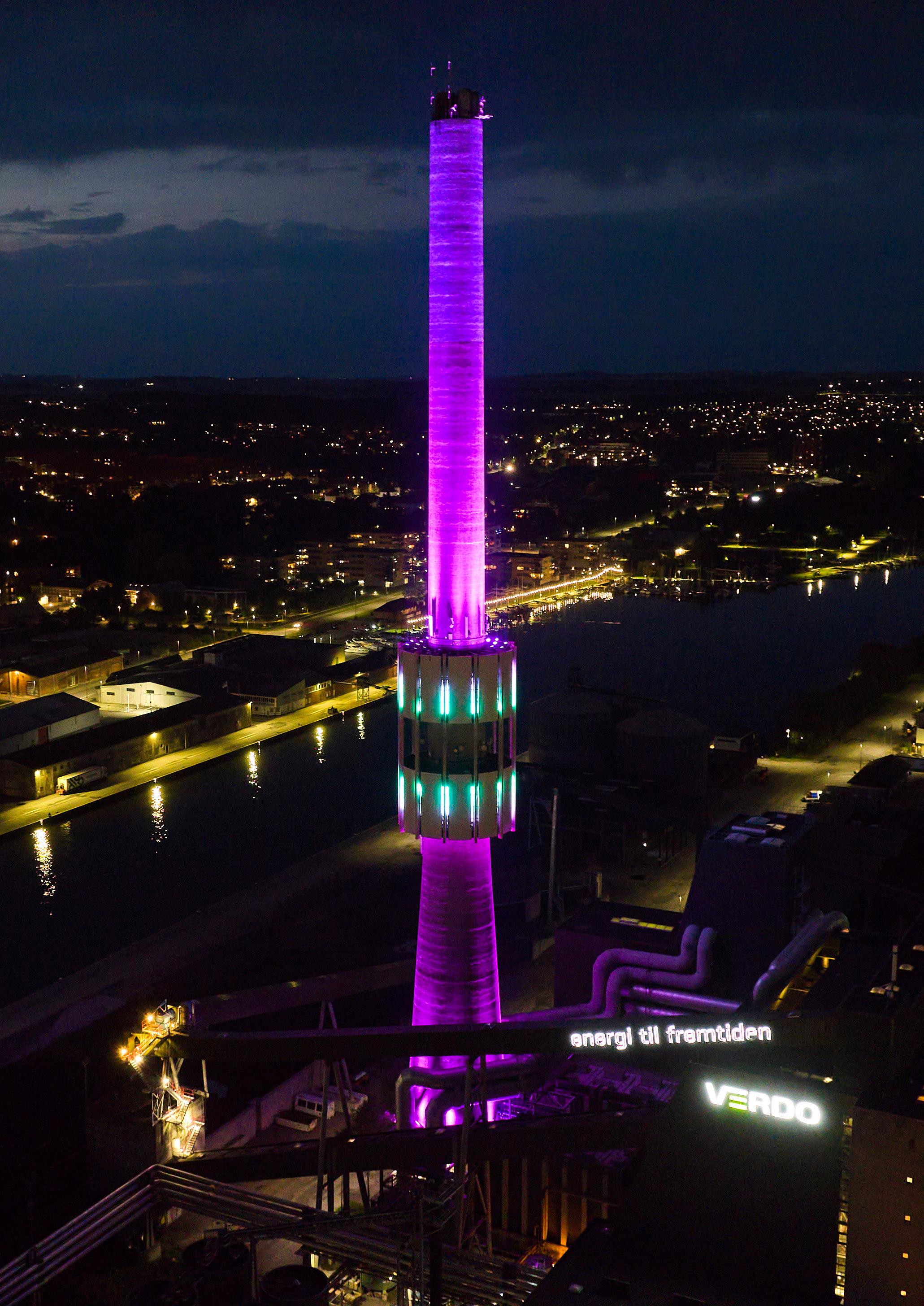
106 Annual report 2023
Financial statements
Management’s statement
The Supervisory Board and the Executive Board have today considered and approved the annual report of Verdo a.m.b.a for the financial year 1 January – 31 December 2023.
The annual report has been presented in accordance with the Danish Financial Statements Act.
In our opinion, the consolidated financial statements and the financial statements give a true and fair view of the Group’s and the company’s assets, liabilities and financial position as at 31 December 2023 and of the results of the Group’s and the
Randers, 23 April 2024
Executive Board

Jakob Flyvbjerg Christensen CEO

Kenneth R. H. Jeppesen
CFO
company’s activities and the consolidated cash flows for the financial year 1 January – 31 December 2023.
There are material uncertainties in recognition and measurement regarding factors in some subsidiaries. This leads to corresponding uncertainty when recognising and measuring in the consolidated financial statements and the parent company. Please refer to note 1.
The annual report is hereby submitted for approval by the Board of Representatives.
Supervisory Board

Torben Høeg Bonde Chairman

Pia Maach-Møller

Finn Skaarup Andersen Deputy Chairman

Finn Enoch Stengel Petersen

Employee representative

Jes Grønning Hansen
Employee representative

Peter Nowack

Jan Guldmann

Niels Rasmussen

Dines Velling Johansen
Employee representative

Peter Kjærsgaard


Bo Bach Svoldgaard

Martin Rubæk
Employee representative
Keld Christensen
107 Annual report 2023
Management’s statement |
Accounting policies
The annual report of Verdo a.m.b.a. for 2023 is presented in accordance with the Danish Financial Statements Act for large enterprises in reporting class C.
In previous years, the Group’s investments in software were recognised under the ‘property, plant and equipment’ item. This practice was changed in 2023, and software is now recognised under the ‘intangible fixed assets’ item. The change has no effect on earnings, tax, balance sheet total or equity. Comparative figures for 2022 have been adjusted to reflect the changed practice.
Apart from the above areas, the accounting policies have been applied consistently with last year.
The annual report for 2023 has been presented in DKK ‘000.
General
Recognition and measurement
Income is recognised in the income statement as earned. In addition, all costs incurred to generate the earnings for the year are recognised in the income statement, including depreciation, amortisation and provisions as well as reversals due to changed accounting estimates of amounts previously recognised in the income statement.
Assets are recognised in the balance sheet when it is probable that future economic benefits will flow to the Group and the parent company, and the value of the assets can be measured reliably.
Liabilities are recognised in the balance sheet when it is probable that future economic benefits will flow out of the Group and the parent company, and the value of the liabilities can be measured reliably.
On initial recognition, assets and liabilities are measured at cost. Subsequently, assets and liabilities are measured as described for each item below.
Certain financial assets and liabilities are measured at amortised cost, applying a constant effective interest rate until maturity. Amortised cost is calculated as original cost less any repayments and with addition/deduction of the cumulative amortisation of the difference between cost and the nominal amount. This means that any capital losses and gains are distributed across the time to maturity.
On recognition and measurement, account is taken of predictable losses and risks arising prior to the presentation of the annual report and proving or disproving conditions existing on the balance sheet date.
Principles of consolidation
The consolidated financial statements comprise the parent company Verdo a.m.b.a. as well as enterprises in which the parent company directly or indirectly holds more than 50% of the voting rights, or in which the parent company through shareholdings or otherwise has a controlling interest.
On consolidation, items of a similar nature are combined. All intercompany income and expenses, shareholdings, dividends and balances as well as realised and unrealised internal gains and losses from transactions between the consolidated enterprises are fully eliminated on consolidation.
The parent company’s equity investments in the consolidated subsidiaries are eliminated against the parent company’s share of the equity value of the subsidiaries calculated at the time of establishment of the affiliation.
Minority interests
Minority interests form part of the Group’s total equity. In the distribution of the profit for the year, the profit is divided into the portion attributable to minority interests and the portion attributable to the parent company’s shareholders. Minority interests are recognised at the carrying amount of the acquired assets and liabilities at the time of acquisition of subsidiaries.
Revenue caps
Some of the consolidated companies are subject to the special revenue cap rules applying under the Danish acts on electricity, water and heat regulation. Under these rules, any surplus income or deficit, calculated as the profit/loss for the year under the Danish acts on the supply of electricity, natural gas and heat relative to the tariffs charged, must be transferred back or charged to consumers through reduced or increased tariffs in the year following the year giving rise to the surplus income or deficit. Surplus income or deficit is therefore recognised in revenue. Under the rules of the Danish acts on the supply of electricity, natural gas and heat, any accumulated surplus income or deficit must be recognised in the balance sheet as payables to or receivables from customers.
108 Annual report 2023
| Accounting policies
Leases
Leases under which the company assumes substantially all risks and rewards of ownership (finance leases) are recognised in the balance sheet at the lower of the fair value of the asset and the present value of the lease payments, calculated on the basis of the internal rate of interest of the lease or an alternative borrowing rate as the discount rate. Assets held under finance leases are depreciated and impaired applying the principles determined for the Group’s and the parent company’s other property, plant and equipment.
The capitalised residual lease obligation is recognised in the balance sheet as a liability, and the interest element of the lease payment is charged to the income statement on a continuing basis.
Foreign currency translation
Transactions in foreign currencies are translated using the exchange rates applicable at the transaction date. Exchange differences arising between the transaction date and the date of payment are recognised in the income statement as a financial item.
Receivables, payables and other monetary items in foreign currencies which have not been settled at the balance sheet date are measured using the foreign exchange rates applicable at the balance sheet date. The difference between the exchange rate applicable at the balance sheet date and the exchange rate applicable at the date on which the receivable or payable occurred is recognised in the income statement under financial income and expenses.
Derivative financial instruments
Derivative financial instruments are initially recognised in the balance sheet at cost and subsequently measured at fair value. Positive and negative fair values of derivative financial instruments are classified as ‘Other receivables’ or ‘Other payables’.
Changes in the fair value of derivative financial instruments are recognised in the income statement, unless the derivative financial instrument is classified as and fulfils the criteria for hedge accounting, see below.
Hedge accounting
Changes in the fair value of financial instruments classified as and fulfilling the criteria for hedging the fair value of a recognised
asset or liability are recognised in the income statement together with any changes in the fair value of the hedged asset or liability attributable to the hedged risk.
Changes in the fair value of financial instruments classified as and fulfilling the criteria for hedging expected future transactions are recognised in equity under retained earnings with respect to the effective portion of the hedge. The ineffective portion is recognised in the income statement. If the hedged transaction results in an asset or a liability, the amount deferred in equity is transferred from equity and recognised in the cost of the asset or liability. If the hedged transaction results in an income or an expense, the amount deferred in equity is transferred from equity to the income statement for the period in which the hedged transaction is recognised. The amount is recognised in the same item as the hedged transaction.
Segment information on revenue Information on activities and geographical segments is based on the Group’s returns and risks based on the internal financial management.
Income statement
Revenue
The Group’s revenue comprises revenue from the sale of goods and services relating to trading in fuel and technical carbon, the production of heat and electricity, goods and services relating to infrastructure (electricity, water and heating) as well as contract work relating to electricity, street lighting and energy plants.
Income from the sale of goods and services is recognised as revenue when benefits and risks relating to the goods and services sold are passed to the buyer, the revenue can be measured reliably, and it is probable that the economic benefits of the sale will flow to the company.
Contract work in progress (construction contracts) is recognised in step with the performance of the work, whereby revenue corresponds to the selling price of the work performed during the year (percentage of completion method). This method is used when total revenue and costs associated with the construction contract and the stage of completion can be measured reliably at the balance sheet date, and it is probable that the economic benefits, including payments, will flow to the Group and the parent company. The stage of completion is calculated on the
109 Annual report 2023 Accounting policies |
basis of costs incurred relative to the expected total costs of the construction contract.
Investment grants to cover the Group’s investments in distribution systems are accrued over the depreciation period of the investment and are recognised in revenue.
Revenue is measured as the consideration received and recognised exclusive of VAT and net of discounts relating to sales.
Other operating income
Other operating income comprises gains on the sale of intangible assets and property, plant and equipment as well as proceeds from the sale of activities.
Work performed on own account listed under assets
Work performed on own account includes direct wages and indirect production costs (IPO) incurred for the full or partial construction of own systems listed under assets.
Costs of raw materials, consumables and auxiliary materials
Costs comprise direct and indirect costs of sales for the purchase of raw materials and auxiliary materials, including delivery costs, handling and services purchased.
Other external expenses
Other external expenses comprise expenses associated with the maintenance of installations, the disposal of waste, the running of vehicles, marketing, premises and administrative expenses.
Employee expenses
Employee expenses comprise wages and salaries, including holiday pay and pensions, as well as other social security costs etc. for the Group’s and the parent company’s employees. Employee expenses are less compensation received from public authorities.
Depreciation, amortisation and impairment losses
Depreciation, amortisation and impairment losses comprise ordinary depreciation, amortisation and impairment of intangible assets and property, plant and equipment.
Other operating expenses
Other operating expenses comprise losses on the sale or scrapping of intangible assets and property, plant and equipment.
Income from equity investments in subsidiaries
In the income statement, the proportionate share of profit/loss for the year is recognised under ‘Income from equity investments in subsidiaries’. Moreover, the annual adjustment of earn-out from the acquisition of enterprises is recognised under ‘Value adjustment of earn-out’ as well as losses and gains on the divestment of subsidiaries.
Value adjustment of earn-out
Value adjustment of earn-out includes the annual adjustment of conditional purchase fees that will not fall due for payment.
Income from other equity investments
Losses/gains on the divestment of equity investments are recognised in the income statement as the difference between the selling price and the carrying amount.
Financial income and expenses
Financial income and expenses are recognised in the income statement as the amounts relating to the financial year.
Income tax
With the exception of the parent company, the Danish subsidiaries of the Verdo Group are subject to the rules on compulsory joint taxation. The Group has chosen to be taxed under the rules on international joint taxation. Subsidiaries are jointly taxed from the time of their inclusion in the consolidated financial statements and up until the time when they are excluded from consolidation.
Verdo Holding A/S is the administration company and thus handles all income tax payments to the tax authorities on behalf of the jointly taxed companies.
Current Danish income tax is distributed through the payment of joint taxation contributions by the jointly taxed companies in proportion to their taxable incomes. In this connection, companies posting tax losses receive joint taxation contributions from enterprises that have been able to use such losses to reduce their own taxable profit.
110 Annual report 2023
| Accounting policies
Tax on profit for the year consists of current tax and changes in deferred tax and is recognised in the income statement with the portion attributable to the profit for the year, and directly in equity with the portion attributable to amounts recognised directly in equity.
Profit/loss from discontinuing operations
All income statement items related to discontinuing operations decided before the presentation of the annual report are recognised on a separate line in the income statement.
Balance sheet
Intangible assets
Goodwill
Acquired goodwill is measured at cost less accumulated amortisation. Goodwill is amortised on a straight-line basis over the useful life of the asset, which is an estimated 7-20 years. The amortisation period is based on the expected payback period.
Development projects
Development projects that are clearly defined and identifiable, and where the technical feasibility of the projects, sufficient resources and a potential future market or scope for development can be demonstrated, and where the intention is to produce, market or use the projects, are recognised as intangible assets. Moreover, it is a precondition that the cost can be measured reliably and that there is sufficient certainty that future earnings can cover production, selling and administrative expenses as well as development costs in step with the costs being incurred.
Development costs recognised in the balance sheet are measured at cost less accumulated amortisation and impairment losses. After completion of the development work, development costs are amortised on a straight-line basis over an estimated useful life of 3-5 years.
Software
Software is measured at cost less accumulated amortisation and impairment losses. Software is amortised on a straight-line basis over the term of the agreement. The amortisation period is usually 3-5 years, but can be up to 10 years.
Gains and losses from the sale of software are calculated as the difference between the selling price less selling costs and the carrying amount at the time of sale. Gains or losses are recognised
in the income statement under other operating income and other operating expenses, as applicable.
Property, plant and
equipment
Property, plant and equipment is measured at cost on initial recognition. Operating equipment is subsequently measured at cost less accumulated depreciation. Land is not depreciated.
The cost of self-constructed assets includes the acquisition price and costs directly attributable to the acquisition, including purchase costs and indirect costs of labour, materials, components and subcontractors until the time when the asset is ready to be put into operation.
The basis for depreciation, which is the cost less any residual value, is distributed on a straight-line basis over the expected useful lives of the assets, which are:
Distribution systems, installations and meters 10-60 years
Buildings
years
CHP plants and peak-load stations 5-30 years
Operating equipment 3-15 years
Depreciation periods and residual values are reassessed annually.
Impairment of property, plant and equipment and intangible assets
The carrying amounts of property, plant and equipment and intangible assets are assessed annually for indications of impairment over and above any depreciation and amortisation. If impairment is ascertained, the carrying amount is written down to the lower recoverable amount.
Equity investments in subsidiaries
Equity investments in subsidiaries are recognised and measured according to the equity method.
In the balance sheet, the proportionate share of the enterprises’ equity value is recognised under ‘Equity investments in subsidiaries’, based on the fair value of identifiable net assets at the time of acquisition less or plus unrealised intercompany profits or losses and with the addition of the residual value of any added value and goodwill calculated at the time of the acquisition of the enterprises.
As part of the distribution of profit, the total net revaluation of equity investments in subsidiaries is transferred to ‘Net revaluation reserve according to the equity method’ under equity. The reserve
111 Annual report 2023
20-100
Accounting policies |
is reduced by dividend distributed to the parent company and adjusted for other changes in equity in subsidiaries.
Subsidiaries with a negative equity value are recognised at DKK 0. If the parent company has a legal or constructive obligation to cover the enterprise’s negative balance, a provision is recognised.
Other financial assets
Equity investments which are not traded in an active market are measured at the lower of cost and recoverable amount.
Long-term other receivables comprise loans in the form of finance leases.
Inventories
Inventories are measured at the lower of cost according to the FIFO method and net realisable value.
The net realisable value of inventories is the amount expected to be generated by a sale in the process of normal operations with deduction of selling expenses. The net realisable value is determined allowing for marketability, obsolescence and development in expected sales sum.
Cost includes the cost price plus delivery costs.
Trade receivables and Other receivables
In the balance sheet, receivables are measured at the lower of amortised cost and net realisable value, which usually corresponds to nominal value less provisions for bad debts.
Construction contracts
Construction contracts are measured at the selling price of the work performed based on stage of completion. The stage of completion is determined as the proportion of contract costs incurred relative to the expected total costs of the contract. When it is probable that total contract costs will exceed total revenue from a contract, the expected loss is recognised in the income statement.
When the selling price cannot be determined reliably, the selling price is measured as the lower of costs incurred and net realisable value. Payments received on account are deducted from the selling
price. Individual contracts are classified as receivables when the net value is positive, and as liabilities when the net value is negative.
Costs in connection with sales work and securing contracts are recognised in the income statement as incurred.
Receivables from and payables to group enterprises
Intercompany balances comprise both outstanding intercompany trade in goods and services and the companies’ share of the Group’s cash-pool agreement with credit institution as well as the internal settlement of current income tax.
Deferred tax
Deferred tax is measured under the balance-sheet liability method on the basis of all temporary differences between the carrying amount and tax base of assets and liabilities, calculated on the basis of the planned use of the asset or the settlement of the liability, respectively.
Deferred tax assets are measured at the value at which they are expected to be realised, either through elimination in tax on future earnings or through offsetting against deferred tax liabilities within the same legal tax entity.
Deferred tax is measured on the basis of the tax rules and tax rates which, under the legislation in force at the balance sheet date, will apply when the deferred tax is expected to crystallise as current tax.
Prepayments
Prepayments recognised under assets include prepaid operating expenses.
Cash
Cash includes deposits with credit institutions.
Equity
Revaluation reserves from the revaluation of property, plant and equipment are realised in step with the depreciation of the revalued assets.
Dividend proposed by management for the financial year is shown as a separate item under equity.
112 Annual report 2023
| Accounting policies
Other provisions
Other provisions include expected costs of the warranty commitment as well as other charges etc. Other provisions are recognised when, as a result of past events, the Group has a legal or factual obligation and it is likely that the fulfilment of the obligation results in an outflow of financial resources from the Group or the parent company.
Liabilities
Defined-benefit pension obligations are recognised in the balance sheet on the basis of the calculation by actuaries of the obligations and the fair values of the related pension assets. Actuarial gains and losses arise from changes in the actuarial assumptions, including demographic and macroeconomic conditions, and are recognised directly in equity. Pension costs recognised in the income statement consist of costs for pensions for the financial year, calculated interest expenses and returns on the associated pension assets.
Investment grants to cover the Group’s investments in distribution systems are expensed over a 40 to 60-year period from receipt of such grants, corresponding to the depreciation period for the Group’s property, plant and equipment.
Mortgage loans and other long-term loans are recognised initially at the proceeds received, net of transaction costs. In subsequent periods, the loans are measured at amortised cost, so that the difference between the proceeds and the nominal value is recognised in the income statement as an interest expense over the term of the loan.
Trade payables and Other payables are measured at amortised cost, substantially corresponding to nominal value.
Deferred income
Deferred income recognised under liabilities consists of payments received relating to income in the following financial years.
Cash flow statement
No cash flow statement has been prepared for the parent company as the parent company’s cash flows are included in the consolidated cash flow statement.
The cash flow statement shows the consolidated cash flows for the year broken down into cash flows from operating, investing and
financing activities, changes in cash and cash equivalents as well as the Group’s cash and cash equivalents at the beginning and end of the year.
Cash flow from operating activities comprises the net profit/loss for the year adjusted for changes in working capital and non-cash income statement items such as depreciation, amortisation and impairment losses as well as provisions. Working capital comprises current assets less current liabilities and excluding items included in cash and cash equivalents.
Cash flow from investing activities comprises cash flows from the purchase and sale of intangible assets, property, plant and equipment and financial assets.
Cash flow from financing activities comprises cash flows from the raising and repayment of long-term debt as well as incoming and outgoing payments to and from shareholders.
Cash and cash equivalents consist of deposits and operating credit facilities with credit institutions.
Ratios
The ratios are calculated in accordance with the recommendations of CFA Society Denmark.
113 Annual report 2023 Gross margin Gross profit/loss * 100 Revenue EBITDA margin EBITDA * 100 Revenue Financial gearing Net interest-bearing debt EBITDA Return on equity Profit/loss from ordinary activities after tax * 100 Average equity Solvency ratio Equity at year-end * 100 Total assets
profit is revenue less direct costs. Net interest-bearing debt is interest-bearing liabilities less interest-bearing assets.
Definitions Gross
Accounting policies |
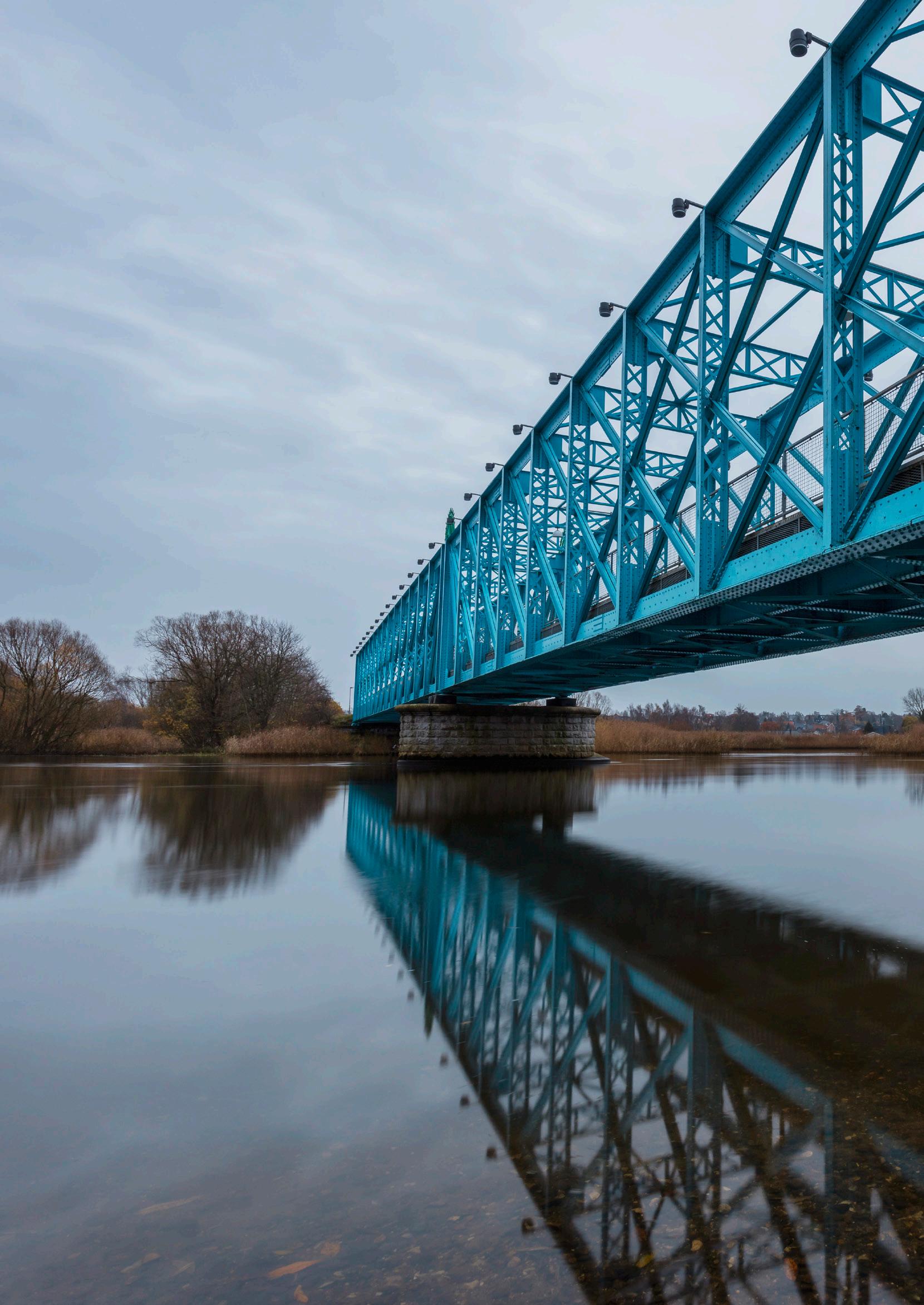
114 Annual report 2023
Income statement
115 Annual report 2023 GROUP PARENT COMPANY 2023 DKK ‘000 2022 DKK ‘000 2023 DKK ‘000 2022 DKK ‘000 Note 4 Revenue 3,971,435 5,424,621 0 0 Other operating income 360 13,686 0 0 Work performed on own account listed under assets 17,868 17,991 0 0 Costs of raw materials, consumables and auxiliary materials -3,289,055 -4,544,627 0 0 5 Other external expenses -212,290 -182,929 -313 -275 Gross profit/loss 488,318 728,742 -313 -275 6 Employee expenses -358,195 -319,939 -2,527 -1,552 Profit/loss before depreciation and amortisation (EBITDA) 130,123 408,803 -2,840 -1,827 7 Depreciation, amortisation and impairment losses -136,688 -132,685 0 0 Other operating expenses -5,986 -4,141 0 0 Operating profit/loss (EBIT) -12,551 271,977 -2,840 -1,827 Income from equity investments in subsidiaries 0 0 -15,491 239,595 Income from other equity investments 0 5,036 0 0 8 Financial income 13,377 17,659 431 102 9 Financial expenses -37,026 -44,252 0 0 Total net financials -23,649 -21,557 -15,060 239,697 Profit/loss from continuing operations before tax -36,200 250,420 -17,900 237,870 10 Tax on continuing operations 18,300 -15,300 0 0 Net profit/loss from continuing operations for the year -17,900 235,120 -17,900 237,870 11 Net profit/loss from discontinuing operations for the year 0 3,036 0 0 Net profit/loss for the year -17,900 238,156 -17,900 237,870 The Group’s profit/loss for the year is distributed as follows: Shareholders in Verdo a.m.b.a. -17,900 237,870 Minority interests 0 286 Total -17,900 238,156 25 Distribution of net profit/loss Income statement for 2023 |
116 Annual report 2023 ASSETS GROUP PARENT COMPANY 31.12.23 DKK ‘000 31.12.22 DKK ‘000 31.12.23 DKK ‘000 31.12.22 DKK ‘000 Note NON-CURRENT ASSETS Goodwill 167,944 191,087 0 0 Development projects 6,080 5,979 0 0 Software 3,308 3,191 0 0 Intangible assets under construction 39,976 24,333 0 0 12 Total intangible assets 217,308 224,590 0 0 Land and buildings 128,329 127,022 0 0 CHP plant and peak-load stations 342,750 387,116 0 0 Distribution systems, installations and meters 977,189 949,833 0 0 Operating equipment 39,054 34,118 0 0 Property, plant and equipment under construction 96,059 45,641 0 0 13 Total property, plant and equipment 1,583,381 1,543,730 0 0 14 Equity investments in subsidiaries 0 0 886,802 889,895 Other securities and equity investments 1 1 0 0 15 Other receivables 94,159 94,159 0 0 Total financial assets 94,160 94,160 886,802 889,895 Total non-current assets 1,894,849 1,862,480 886,802 889,895 CURRENT ASSETS Raw materials and consumables 66,557 65,700 0 0 Manufactured goods and goods for resale 94,929 216,894 0 0 Total inventories 161,486 282,594 0 0 Trade receivables 403,155 405,222 0 0 Deficit receivable 7,659 34,258 0 0 Receivables from subsidiaries 0 0 15,208 17,556 16 Construction contracts 86,741 66,566 0 0 17 Deferred tax assets 121,943 103,172 0 0 Other receivables 83,898 95,192 0 0 Deferred income 11,246 8,896 0 0 Total receivables 714,642 713,306 15,208 17,556 Cash 19,915 207,321 0 0 Total current assets 896,043 1,203,221 15,208 17,556 Total assets 2,790,892 3,065,701 902,010 907,451 | Balance sheet on 31 December 2023
Balance sheet
117 Annual report 2023 EQUITY AND LIABILITIES GROUP PARENT COMPANY 31.12.23 DKK ‘000 31.12.22 DKK ‘000 31.12.23 DKK ‘000 31.12.22 DKK ‘000 Note EQUITY Share capital 111,597 111,597 111,597 111,597 Revaluation reserve 31,236 33,652 0 0 Reserve for hedging instruments -30,180 -51,072 0 0 Net revaluation reserve according to the equity method 0 0 704,786 707,879 Retained earnings 789,138 813,116 85,408 87,817 Total equity 901,791 907,293 901,791 907,293 NON-CURRENT LIABILITIES 18 Surplus income water supply, investment grants and pension obligations 307,158 298,980 0 0 18 Lease commitments 11,362 9,477 0 0 18 Mortgage credit institutions 156,779 176,482 0 0 18 Credit institutions 32,663 45,991 0 0 19 Timing differences, provision and surplus income, Danish Heat Supply Act 450,270 542,721 0 0 20 Other provisions 92,745 92,583 0 0 Total non-current liabilities 1,050,977 1,166,234 0 0 Balance sheet on 31 December 2022 |
118 Annual report 2023 LIABILITIES – continued GROUP PARENT COMPANY 31.12.23 DKK ‘000 31.12.22 DKK ‘000 31.12.23 DKK ‘000 31.12.22 DKK ‘000 Note CURRENT LIABILITIES 18 Surplus income water supply, investment grants and pension obligations 16,296 13,501 0 0 18 Lease commitments 6,172 5,620 0 0 18 Mortgage credit institutions 20,067 20,276 0 0 19 Timing differences, provision and surplus income, Danish Heat Supply Act 171,247 164,648 0 0 Credit institutions 105,110 140,239 0 0 16 Construction contracts 111,048 87,081 0 0 Trade payables 288,688 299,511 131 22 Payables to subsidiaries 0 0 0 136 Income tax payable 3,496 9,776 0 0 Other payables 99,385 163,456 88 0 Deferred income 16,615 88,066 0 0 Total current liabilities 838,124 992,174 219 158 Total liabilities 1,889,101 2,158,408 219 158 Total equity and liabilities 2,790,892 3,065,701 902,010 907,451 1 Material uncertainty regarding recognition and measurement 2 Events after the reporting period 3 Special items 21 Charges and security 22 Contractual obligations and contingencies 23 Related parties 24 Interest rate risks and use of financial instruments | Balance sheet on 31 December 2023
Statement of changes in equity
119 Annual report 2023 GROUP – continued Note Amounts in DKK ‘000 Retained earnings Total Minority interests Total equity Balance as at 1 January 2022 541,269 710,821 111,350 822,171 25 Transferred via distribution of net profit/loss 237,870 237,870 286 238,156 Purchase of minority shares 1,620 0 -111,636 -111,636 Foreign currency translation adjustments of subsidiaries -10,660 -10,660 0 -10,660 Realised revaluation 0 0 0 0 Pension obligations 34,347 34,347 0 34,347 Value adjustment of hedging instruments: 0 -73,755 0 -73,755 Tax on equity items 8,670 8,670 0 8,670 Equity as at 31 December 2022 813,116 907,293 0 907,293 25 Transferred via distribution of net profit/ loss -17,900 -17,900 0 -17,900 Purchase of minority shares 0 0 0 0 Foreign currency translation adjustments of subsidiaries -2,661 -2,661 0 -2,661 Realised revaluation 2,416 0 0 0 Pension obligations -1,585 -1,585 0 -1,585 Value adjustment of hedging instruments: 0 20,892 0 20,892 Tax on equity items -4,248 -4,248 0 -4,248 Equity as at 31 December 2023 789,138 901,791 0 901,791 GROUP Note Amounts in DKK ‘000 Share capital Proposed dividend Revaluation reserve Reserve for fair value of hedging instruments Balance as at 1 January 2022 111,597 0 33,652 24,303 25 Transferred via distribution of net profit/loss 0 0 0 0 Purchase of minority shares 0 0 0 -1,620 Foreign currency translation adjustments of subsidiaries 0 0 0 0 Realised revaluation 0 0 0 0 Pension obligations 0 0 0 0 Value adjustment of hedging instruments: 0 0 0 -73,755 Tax on equity items 0 0 0 0 Equity as at 31 December 2022 111,597 0 33,652 -51,072 25 Transferred via distribution of net profit/loss 0 0 0 0 Purchase of minority shares 0 0 0 0 Foreign currency translation adjustments of subsidiaries 0 0 0 0 Realised revaluation 0 0 -2,416 0 Pension obligations 0 0 0 0 Value adjustment of hedging instruments: 0 0 0 20,892 Tax on equity items 0 0 0 0 Equity as at 31 December 2023 111,597 0 31,236 -30,180 Statement of changes in equity for 2023 |
There have been no changes in the share capital in the past five years.
120 Annual report 2023 PARENT COMPANY Note Amounts in DKK ‘000 Share capital Net revaluation reserve according to the equity method Proposed dividend Retained earnings Total Balance as at 1 January 2022 111,597 509,682 0 89,542 710,821 25 Transferred via distribution of net profit/loss 0 177,521 0 -1,725 175,796 Distributed dividend 0 0 0 0 0 Actuarial changes of pension obligations in subsidiaries 0 8,989 0 0 8,989 Value adjustment of hedging instruments: 0 17,518 0 0 17,518 Tax on entries on shareholders’ equity 0 -5,831 0 0 -5,831 Equity as at 31 December 2022 111,597 707,879 0 87,817 907,293 25 Transferred via distribution of net profit/loss 0 -3,947 0 -2,409 -6,356 Distributed dividend 0 0 0 0 0 Actuarial changes of pension obligations in subsidiaries 0 -288 0 0 -288 Value adjustment of hedging instruments: 0 1,384 0 0 1,384 Tax on entries on shareholders’ equity 0 -242 0 0 -242 Equity as at 31 December 2023 111,597 704,786 0 85,408 901,791
| Statement of changes in equity for 2023
Cash flow statement
121 Annual report 2023 GROUP 2023 DKK ‘000 2022 DKK ‘000 Operating profit/loss (EBIT) -12,551 271,977 ‘Depreciation and amortisation’, ‘Other income’ and ‘Other operating expenses’ 142,397 123,235 Investment grants 10,687 16,565 Other adjustments of non-cash operating items -7,888 30,803 Cash flow from primary operations before changes in working capital 132,645 442,580 Changes in working capital: Inventories 121,108 -161,973 Receivables -12,835 72,850 Trade payables and other payables -161,743 -1,383 Cash flow from primary operations 79,175 352,074 Interest income, received 13,377 17,659 Interest expenses, paid -37,026 -44,252 Income tax paid/refunded -10,943 -17,159 Cash flow from operating activities 44,583 308,322 Purchase of intangible assets and property, plant and equipment -108,405 -144,532 Intangible assets and property, plant and equipment under construction, adjustment -61,089 -14,524 Sale of financial assets 0 345,446 Sale of intangible assets and property, plant and equipment 3,438 10,164 Cash flow from investing activities -166,056 196,554 Total cash flows from operating and investing activities -121,473 504,876 Paid-in share capital 0 500 New finance leases 5,043 10,476 Repayments on non-current liabilities -37,126 -47,575 Cash flow from financing activities -32,083 -36,599 Cash flows for the year -153,556 468,277 Cash and cash equivalents in discontinuing companies as at 1 January 0 -41,573 Cash and cash equivalents in continuing companies as at 1 January 85,126 -341,578 Cash as at 31 December -68,430 85,126 Cash as at 31 December is specified as follows: Cash 19,915 207,321 Short-term debt to credit institutions -88,345 -122,195 Total -68,430 85,126 The cash flow statement cannot be derived directly from the consolidated financial statements. Cash flow statement for 2023 |
1. UNCERTAINTY REGARDING RECOGNITION AND MEASUREMENT
Group:
Return on invested capital in the 2000-2009 period
In 2021, while the Group’s production company was investigating similar matters relating to the 2000-2009 period, indications were found that Verdo Produktion A/S had recognised a return on invested capital of up to DKK 69 million during the period. It has not been possible to identify a direct legal basis for recognising this return, and discussions have been initiated with the Danish Utility Regulator concerning the matter.
Discussions continued during 2023, but it is still not possible to know when these will be completed. Verdo Produktion A/S has therefore continued to recognise a provision under the ‘Other provisions’ item corresponding to the entire return identified.
Interest on loans with external mortgage credit institutions
The Group received questions from the Danish Utility Regulator in 2022 regarding the inclusion of interest in price demonstrations in the Group’s production company. The discussions concern interest on loans taken out by Verdo Produktion A/S with external credit institutions, as a result of a change in practice in the calculation of interest in the price demonstration in 2018.
The Verdo Group deems that the change in the practice of Verdo Produktion A/S is correct, and that the interest can be seen as a necessary cost and thus included on a pro rata basis according to the share of heat production. Our discussions with the Danish Utility Regulator in 2023 have not made it possible at this stage
to assess the potential accounting implications, or when the discussions are expected to be concluded. The recognition has therefore still not been made.
Output model
The Danish Utility Regulator contacted Verdo Produktion A/S in 2021 about the sector’s usual method for allocating costs between electricity production and heat production – also called the ‘output model’.
Verdo Produktion A/S is in dialogue with the Danish Utility Regulator about the use of the model. The discussions in 2023 have not made it possible at this stage to assess the potential financial consequences of this enquiry.
Parent company
Recognition of unresolved cases from the Danish Utility Regulator in Verdo subsidiaries
The recognition of equity investments in the parent company is subject to material uncertainty. The greatest uncertainty relates to the recognition of decisions of the Danish Utility Regulator in the subsidiary Verdo Produktion A/S, which affects the value of the equity investments. Further details can be found in the section on material uncertainty regarding recognition and measurement in the Group.
2. EVENTS AFTER THE REPORTING PERIOD
No events with significant impact on the consolidated financial statements have occurred since the balance sheet date.
3. SPECIAL ITEMS
The Group has not received any significant decisions from the Danish Utility Regulator or realised any other material items in 2023 that must or should be disclosed as special items in the annual accounts.
In 2022, special items materially impacted the financial statements in Verdo Produktion A/S and Verdo Varme A/S, where provisions of DKK 8.9 million and DKK 56.1 million, respectively,
were made with reference to the resolved case with the Danish Utility Regulator concerning taxes collected in connection with the previously resolved cases concerning unauthorised interest on start-up capital.
The profit/loss of the parent company is affected by the same items; however, the provision affects the ‘Profit/loss from equity investments’ item instead.
122 Annual report 2023
| Notes
Notes
Segment information is provided about the Group’s activities and geographical markets. The information is based on the Group’s accounting policies, risks and internal financial management.
Adjustment concerning special items in previous years concerns the Group’s heat supply activities.
5. OTHER EXTERNAL EXPENSES (excerpts)
123 Annual report 2023 GROUP 2023 DKK ‘000 2022 DKK ‘000 Breakdown
Electricity supply 689,742 1,048,099 Water supply 26,125 25,138 Heat supply 715,250 519,337 Contract work, electricity, water, heating and energy solutions 618,545 329,496 Sale of fuel and technical coal 1,738,690 3,155,473 Electricity generation 159,899 326,971 Fibre and telephony 0 12,806 Other 23,184 20,107 Total revenue 3,971,435 5,437,427 Discontinuing operations, see note 11 0 -12,806 Revenue from continuing operations 3,971,435 5,424,621 Special items referred to in notes 1 and
0 65,031 Total revenue 3,971,435 5,489,652 Geographical breakdown of revenue: Denmark 2,425,088 2,952,157 Europe (excl. the UK) 958,993 1,517,455 Asia and Oceania 274,499 334,626 UK 12,662 82,553 North America 300,193 549,165 South America 0 1,471 Total 3,971,435 5,437,427
of revenue by activity:
3
GROUP 2023 DKK ‘000 2022 DKK ‘000 Fees to auditors appointed by the annual general meeting: Fee for statutory audit 1,037 1,040 Assurance engagements 155 45 Tax advice 578 362 Other services 5,327 4,092 Total 7,097 5,539
REVENUE
4.
Notes |
Please refer to the remuneration report available at
7.
124 Annual report 2023 6. EMPLOYEE EXPENSES GROUP PARENT COMPANY 2023 DKK ‘000 2022 DKK ‘000 2023 DKK ‘000 2022 DKK ‘000 Wages and salaries 323,863 294,885 2,527 1,552 Pensions 29,104 20,928 0 0 Other social security costs 5,228 4,126 0 0 Total 358,195 319,939 2,527 1,552 Discontinuing operations, see note 11 0 1,086 0 0 Total 358,195 321,025 2,527 1,552 Remuneration of the Supervisory Board and the Board of Representatives 2,562 2,397 2,527 1,552 Remuneration of the Executive Board 5,674 5,147 0 0 Average number of employees 535 479 0 0
www.verdo.com.
DEPRECIATION, AMORTISATION AND IMPAIRMENT LOSSES GROUP PARENT COMPANY 2023 DKK ‘000 2022 DKK ‘000 2023 DKK ‘000 2022 DKK ‘000 Intangible assets 27,256 24,631 0 0 Property, plant and equipment 109,432 116,777 0 0 Total 136,688 141,408 0 0 Discontinuing operations, see note 11 0 -8,723 0 0 Total 136,688 132,685 0 0
FINANCIAL INCOME GROUP PARENT COMPANY 2023 DKK ‘000 2022 DKK ‘000 2023 DKK ‘000 2022 DKK ‘000 Interest income from subsidiaries 0 0 431 102 Other interest income 13,377 17,659 0 0 Total 13,377 17,659 431 102 9. FINANCIAL EXPENSES GROUP PARENT COMPANY 2023 DKK ‘000 2022 DKK ‘000 2023 DKK ‘000 2022 DKK ‘000 Interest expenses 37,026 44,302 0 0 Other financial expenses 0 0 0 0 Total 37,026 44,302 0 0 Discontinuing operations, see note 11 0 -50 0 0 Total 37,026 44,252 0 0 | Notes
8.
11. DISCONTINUING OPERATIONS
125 Annual report 2023 10. TAX ON PROFIT FOR THE YEAR GROUP PARENT COMPANY 2023 DKK ‘000 2022 DKK ‘000 2023 DKK ‘000 2022 DKK ‘000 Current tax for the year 6,859 29,323 0 0 Deferred tax for the year -24,590 -6,614 0 0 Tax concerning previous years -569 -8,976 0 0 Total tax on profit/loss for the year -18,300 13,733 0 0 Tax on profit/loss for the year comprises: Calculated 22% tax on profit/loss for the year -7,964 55,416 -3,938 52,936 Tax on profit/loss for the year in subsidiaries 0 0 3,408 -53,316 Tax effect of: Non-taxable income and non-deductible expenses -9,767 -32,707 530 380 Tax concerning previous years -569 -8,976 0 0 Total tax on profit/loss for the year -18,300 13,733 0 0 Tax on profit for the year is distributed as follows: Tax on continuing operations -18,300 15,300 0 0 Tax on discontinuing operations, see note 11 0 -1,567 0 0 Total tax on profit/loss for the year -18,300 13,733 0 0 Tax on changes in equity -4,248 8,670 0 0 Total tax -22,548 22,403 0 0
2023 DKK ‘000 2022 DKK ‘000 Profit/loss from discontinuing operations is constituted by the following main figures: Revenue and other income 0 12,806 Costs of raw materials, consumables and auxiliary materials 0 1,366 ‘Employee expenses’ and ‘Other external expenses’ 0 -3,930 ‘Depreciation, amortisation and impairment losses’ and ‘Other operating expenses’ 0 -8,723 Finance costs 0 -50 Profit/loss before tax from discontinuing operations 0 1,469 Tax on discontinuing operations 0 1,567 Net profit/loss from discontinuing operations for the year 0 3,036 Notes |
Amounts in DKK ‘000
Reasons for the amortisation periods for goodwill and development projects:
Verdo Energy Systems A/S / Carbon Partners AS:
The investment in subsidiaries will be of strategic importance to the Group for many years to come. In the next few years, the subsidiaries’ activities within technical coal and energy systems are expected to increase in terms of both revenue and earnings, and based on these expectations, the economic life of the assets is determined to be 10 years.
Verdo Varme Herning A/S:
The investment in the subsidiary is considered to be of strategic importance to the Group’s heat supply activities in Denmark, and, together with group synergies, the company is expected to have a long-term value. Against this background and the expectations for the coming years, the economic life is determined to be 20 years.
Other:
Other investments in goodwill are individually assessed in terms of their earnings potential and have a recognised value of DKK 7 million. They are amortised on the basis of an economic life of 7-10 years.
Development projects:
Investments in development are amortised over the economic life of the assets based on the period of 3-5 years in which the projects are expected to contribute to increased activity and earnings.
Software:
Investments in software are amortised over their expected technical lifetime. For the vast majority, this is expected to be between 3-5 years, but may be up to 10 years for some assets.
126 Annual report 2023
GROUP
Goodwill Development projects Software Intangible assets under construction Total Cost as at 1 January 2023 351,721 9,833 0 0 361,554 Net effect of changes in accounting policies 0 0 29,951 24,333 54,284 Corrected cost as at 1 January 2023 351,721 9,833 29,951 24,333 415,838 Completed plant 0 2,790 1,542 -4,332 0 Additions 0 0 0 21,044 21,044 Disposals 0 0 0 -1,069 -1,069 Cost as at 31 December 2023 351,721 12,623 31,493 39,976 435,813 Amortisation and impairment losses
January 2023 160,634 3,855 0 0 164,489 Net effect of changes in accounting policies 0 0 26,760 0 26,760 Corrected amortisation and impairment losses as at 1 January 2023 160,634 3,855 26,760 0 191,249 Amortisation 23,143 2,688 1,425 0 27,256 Amortisation, disposed assets 0 0 0 0 0 Amortisation as at 31 December 2023 183,777 6,543 28,185 0 218,505 Carrying
167,944 6,080 3,308 39,976 217,308 Amortisation period 7-20 years 3-5 years 3-10 years | Notes
12. INTANGIBLE ASSETS
as at 1
amount as at 31 December 2023
127 Annual report 2023 13. PROPERTY, PLANT AND EQUIPMENT GROUP Amounts in DKK ‘000 Land and buildings CHP plant and peak-load stations Distribution systems and installations, and meters Operating equipment Property, plant and equipment under construction Total Cost as at 1 January 2023 190,734 1,454,357 2,424,373 160,574 69,974 4,300,012 Net effect of changes in accounting policies 0 0 0 -29,951 -24,333 -54,284 Corrected cost as at 1 January 2023 190,734 1,454,357 2,424,373 130,623 45,641 4,245,728 Foreign currency translation adjustment 0 0 0 -60 0 -60 Completed plant 3,666 5,842 74,904 4,227 -88,639 0 Additions 859 151 192 12,384 143,919 157,505 Disposals -162 0 -7,852 -18,258 -4,862 -31,134 Cost as at 31 December 2023 195,097 1,460,350 2,491,617 128,916 96,059 4,372,039 Depreciation and impairment losses as at 1 January 2023 63,712 1,067,241 1,474,540 123,265 0 2,728,758 Net effect of changes in accounting policies 0 0 0 -26,760 0 -26,760 Corrected depreciation and impairment losses as at 1 January 2023 63,712 1,067,241 1,474,540 96,505 0 2,701,998 Foreign currency translation adjustment 0 0 0 -44 0 -44 Depreciation 3,056 50,359 45,064 10,953 0 109,432 Reversal of previously impaired assets 0 0 0 0 0 0 Depreciation, disposed assets 0 0 -5,176 -17,552 0 -22,728 Depreciation and impairment losses as at 31 December 2023 66,768 1,117,600 1,514,428 89,862 0 2,788,658 Carrying amount as at 31 December 2023 128,329 342,750 977,189 39,054 96,059 1,583,381 Depreciation period 20-100 years 5-30 years 10-60 years 3-15 years The carrying amount of property, plant and equipment includes the following: Value of recognised interest 722 7,167 0 0 0 7,889 Value of lease assets 0 0 0 17,856 0 17,856 Notes |
receivables include loans. The loans carry market-rate interest.
128 Annual report 2023 14. EQUITY INVESTMENTS IN SUBSIDIARIES PARENT COMPANY 2023 DKK ‘000 2022 DKK ‘000 Cost as at 1 January 182,016 182,016 Additions 0 0 Disposals 0 0 Cost as at 31 December 182,016 182,016 Value adjustments as at 1 January 707,879 509,684 Share of profit/loss -15,491 239,595 Dividend paid 0 0 Entries on shareholders’ equity 12,398 -41,400 Disposals 0 0 Revaluations as at 31 December 704,786 707,879 Carrying amount as at 31 December 886,802 889,895 Of which non-depreciated balances 164,958 187,019 Gains on the divestment of subsidiaries 0 0 Balances (goodwill) on initial recognition of subsidiaries amount to DKK 164,958,000. Name Registered office Net profit/loss for the year Equity Ownership interest Verdo Holding A/S Randers -15,490 886,376 100% Verdo Innovation A/S (under liquidation) Randers -1 426 100% 15. OTHER RECEIVABLES (long-term) GROUP 2023 DKK ‘000 2022 DKK ‘000 Cost as at 1 January 94,159 94,159 Exchange adjustment 0 0 Additions 0 0 Disposals 0 0 Cost as at 31 December 94,159 94,159 Repayments as at 1 January 0 0 Repayments for the year 0 0 Repayments on other receivables written off 0 0 Repayments as at 31 December 0 0 Carrying amount as at 31 December 94,159 94,159 Of which recognised as current assets 0 0 Receivables over 1 year 94,159 94,159 Other
| Notes
in the balance sheet:
At the end of 2023, the Group had recognised tax assets of DKK 121,943,000. The management believes that taxable income will
for utilisation of the timing differences in depreciation and amortisation. At the end of 2023, the Group had non-recognised deferred tax assets of DKK 455,926,000 that management does not expect to
to utilise in the coming years. The elimination of deferred tax assets is expected to take place over a number of years as the timing differences primarily relate to assets with a long time horizon. Also, the timing will depend on the size of future investments.
18. NON-CURRENT LIABILITIES GROUP
in DKK ‘000
129 Annual report 2023 16. CONSTRUCTION CONTRACTS GROUP 2023 DKK ‘000 2022 DKK ‘000 Selling price of work performed 759,550 501,155 Progress billings -783,857 -521,670 Total net value -24,307 -20,515 Recognition
Construction contracts (assets) 86,741 66,566 Construction contracts (liabilities) -111,048 -87,081 Total -24,307 -20,515 Notes |
DEFERRED TAX GROUP PARENT COMPANY 2023 DKK ‘000 2022 DKK ‘000 2023 DKK ‘000 2022 DKK ‘000 Deferred tax as at 1 January 103,172 84,033 0 0 Annual adjustment of deferred tax 24,590 6,614 0 0 Tax on changes in equity -5,819 12,525 0 Deferred tax as at 31 December 121,943 103,172 0 0 Deferred tax is distributed as follows: Property, plant and equipment 83,569 58,549 0 0 Accrued income 34,821 40,658 0 0 Accrued expenses 1,054 1,052 0 0 Changes in equity 967 2,205 0 0 Pension obligations 1,532 708 0 0 Total deferred tax 121,943 103,172 0 0
17.
be
coming years
be
generated in the
able
Amounts
Mortgage credit institutions Lease commitments Credit institutions Other Total debt as at 31 December 2023 176,846 17,534 49,428 323,454 Repayments next year -20,067 -6,172 -16,765 -16,296 Non-current portion 156,779 11,362 32,663 307,158 Outstanding debt after five years 68,217 28 0 248,911 ‘Other’ covers pension obligations, surplus income in water supply and accrued investment grants. Pension obligations are recognised in the income statement in step with the disbursement of pensions. The current portion of credit institutions of DKK 16,765,000 is recognised in the credit institutions item under current liabilities. The remainder of this item consists of bank debt.
19. DANISH HEAT SUPPLY ACT
20.
The warranty commitment is reduced concurrently with the expiry of the warranties provided on delivered services. Other provisions include cases involving public authorities which have not yet been decided.
130 Annual report 2023 21. Charges and security GROUP PARENT COMPANY 2023 DKK ‘000 2022 DKK ‘000 2023 DKK ‘000 2022 DKK ‘000 Security 420,692 252,811 0 0 Carrying amount of property, plant and equipment pledged as security for lease commitments 17,071 15,097 0 0 Mortgage on property 436,400 436,400 0 0 Total 874,163 704,308 0 0 Property
been pledged
security for mortgages from mortgage credit institutions, of which the outstanding debt as at 31 December 2023 constitutes DKK
carrying amount of the pledge is DKK 301,517,000. As at 31 December 2023, the carrying amount of assets held under finance
in respect of pension obligations to public servants as well as parent company guarantees to
has
as
176,846,000. As at 31 December 2023, the
leases is DKK 17,856,000. Guarantees include both ordinary builders’ guarantees and also guarantees
suppliers.
OTHER PROVISIONS GROUP 2023 DKK ‘000 2022 DKK ‘000 Warranty commitments 5,109 4,947 Other provisions 87,636 87,636 Total 92,745 92,583
GROUP 2023 DKK ‘000 2022 DKK ‘000 Provision for investments 103,290 109,731 Timing differences 338,848 321,107 Repayment of interest on intercompany loans 54,233 89,473 Repayment of return on invested capital for 2010-2017 66,848 122,027 Repayment of tax collected in the heating companies 37,609 65,031 Surplus income 20,689 0 Total 621,517 707,369 Recognised as short-term debt -171,247 -164,648 Non-current liabilities 450,270 542,721 Outstanding debt after five years 200,812 398,632 | Notes
22. CONTRACTUAL OBLIGATIONS AND CONTINGENCIES
The Group’s lease commitments total DKK 6,118,000, of which DKK 0 million falls due after five years.
For 2023, the Group’s trading company has entered into contracts for the purchase of fuel and freight valued at DKK 91,639,000 to cover already concluded contracts on the sale of fuel.
The Group’s electricity trading company has entered into fixed-price contracts for 2023 with the company’s end-customers, and to hedge the associated price risk, financial electricity purchase contracts have been entered into in
conjunction with agreements on the physical delivery of electricity. Financial purchase contracts have also been entered into to hedge future price risks associated with the ‘KvartalsEl’ product. The fair value of these contracts is recognised directly in equity with a loss of DKK -19,119,000 before tax.
Demolition obligation
The Group is under an obligation to demolish the Randers Kraftvarmeværk (KVR) CHP plant and to clean up the site at the Port of Randers. Uncertainty surrounds the time frame as well as the scope of the obligation, and the demolition is not expected to lead to a material draw on the Group’s resources. The amount is therefore not recognised in the balance sheet.
23. RELATED PARTIES
All related-party transactions are carried out on an arm’s-length basis.
No party has a controlling interest in the company.
24. INTEREST RATE RISKS AND USE OF FINANCIAL INSTRUMENTS
The company uses interest rate swaps to hedge recognised and unrecognised transactions. In this way, variable interest payments are converted into fixed interest payments.
The hedged cash flows will be realised on an ongoing basis and will affect the results in the coming years and until the expiry of the interest rate swaps. The terms of the swaps are primarily aligned with the long-term cash flows which they hedge.
131 Annual report 2023 Notes |
NET
PARENT COMPANY 2023 DKK ‘000 2022 DKK ‘000 Proposed distribution of profit/loss: Retained earnings -2,409 -1,725 Proposed dividend 0 0 Net revaluation reserve according to the equity method -15,491 239,595 Total -17,900 237,870 GROUP PARENT COMPANY 2023 DKK ‘000 2022 DKK ‘000 2023 DKK ‘000 2022 DKK ‘000 Term 1-5 years 66,604 186,568 0 0 Term 6-15 years 155,562 175,856 0 0 Notional amount of interest rate swaps 222,166 362,424 0 0 Value adjustment recognised in equity -9,299 -7,819 0 0
25. DISTRIBUTION OF
PROFIT/LOSS
To the shareholders of Verdo a.m.b.a.
In our opinion, the consolidated financial statements and the financial statements give a true and fair view of the Group’s and the company’s assets, liabilities and financial position as at 31 December 2023 and of the results of the Group’s and the company’s activities and the consolidated cash flows for the financial year 1 January – 31 December 2023 in accordance with the Danish Financial Statements Act.
We have audited the consolidated financial statements and the financial statements of Verdo a.m.b.a. for the financial year 1 January – 31 December 2023 comprising the income statement, balance sheet, statement of changes in equity and notes, including accounting policies, for the Group and the company as well as the consolidated cash flow statement (‘the financial statements’).
Basis
of opinion
We conducted our audit in accordance with International Standards on Auditing and additional requirements applicable in Denmark. Our responsibilities under those standards and requirements are further described in the ‘Auditor’s responsibilities for the audit of the financial statements’ section of the auditor’s report. We are independent of the company in accordance with the International Ethics Standards Board for Accountants’ Code of Ethics for Professional Accountants (IESBA Code) and the other ethical requirements that are relevant to our audit of the financial statements in Denmark. We have also fulfilled our other ethical responsibilities in accordance with these requirements and the IESBA Code. We believe that the audit evidence we have obtained is sufficient and appropriate to provide a basis for our opinion.
Emphasis of matter
We draw attention to note 1 of the financial statements, which describes the uncertainty that exists within the Group regarding the recognition of return on invested capital, inclusion of interest and the ‘output model’.
We draw attention to note 1 of the financial statements, which describes the uncertainty surrounding the recognition of equity investments in the parent company.
Our opinion is not qualified in respect of this matter.
Statement on the management commentary
The management is responsible for the management commentary. Our opinion on the financial statements does not include the
management commentary, and we do not express any form of opinion on the management commentary.
In connection with our audit of the financial statements, it is our responsibility to read the management commentary and in this connection consider whether the management commentary is materially inconsistent with the financial statements or the knowledge we have obtained during our audit, or in any other way appears to be materially misstated.
Furthermore, it is our responsibility to consider whether the management commentary contains the information required under the Danish Financial Statements Act.
Based on the work performed, we believe that the management commentary is in accordance with the consolidated financial statements and the financial statements and has been prepared in accordance with the provisions of the Danish Financial Statements Act. We have not detected any material misstatement in the management commentary.
Management’s responsibilities for the financial statements
The management is responsible for the preparation of consolidated financial statements and financial statements that give a true and fair view in accordance with the Danish Financial Statements Act. The management is also responsible for such internal control as the management determines is necessary to enable the preparation of financial statements that are free from material misstatement, whether due to fraud or error.
In preparing the financial statements, the management is responsible for assessing the ability of the Group and of the company to continue as a going concern, disclosing, as applicable, matters related to continuing as a going concern and using the going concern basis of accounting unless the management either intends to liquidate the Group or the company or to cease operations, or has no realistic alternative but to do so.
Auditor’s responsibilities for the audit of the financial statements
Our aim is to obtain reasonable assurance that the financial statements as a whole are free from material misstatement, whether due to fraud or error, and to issue an auditor’s report with an opinion. Reasonable assurance is a high level of assurance, but is not a guarantee that an audit conducted in accordance with International Standards on Auditing and the additional
132 Annual report 2023
| The independent auditor’s report
requirements applicable in Denmark will always detect a material misstatement when it exists. Misstatements can arise from fraud or error and are considered material if, individually or in the aggregate, they could reasonably be expected to influence the financial decisions of users taken on the basis of these financial statements.
As part of an audit conducted in accordance with International Standards on Auditing and the additional requirements applicable in Denmark, we exercise professional judgment and maintain professional scepticism throughout the audit. We also:
Identify and assess the risks of material misstatement of the financial statements, whether due to fraud or error, design and perform audit procedures responsive to those risks, and obtain audit evidence that is sufficient and appropriate to provide a basis for our opinion. The risk of not detecting a material misstatement resulting from fraud is higher than for one resulting from error, as fraud may involve collusion, forgery, intentional omissions, misrepresentations or the override of internal control.
• Obtain an understanding of internal control relevant to the audit in order to design audit procedures that are appropriate in the circumstances, but not for the purpose of expressing an opinion on the effectiveness of the Group’s and the company’s internal control.
• Evaluate the appropriateness of accounting policies used and the reasonableness of accounting estimates and related disclosures made by the management.
Conclude on the appropriateness of the management’s use of the going concern basis of accounting in its preparation of the financial statements and, based on the audit evidence obtained, on whether a material uncertainty exists related to events or conditions that may cast significant doubt on the Group’s and the company’s ability to continue as a going concern. If we conclude that a material uncertainty exists, we are required to draw attention in our auditor’s report to the related disclosures in the financial statements or, if such disclosures are inadequate, to modify our opinion. Our conclusions are based on the audit evidence obtained up to the date of our auditor’s report. However, future events or
conditions may cause the Group and the company to cease to continue as a going concern.
Evaluate the overall presentation, structure and content of the financial statements, including the disclosures in the notes, and whether the financial statements represent the underlying transactions and events in a manner that achieves fair presentation.
Obtain sufficient and appropriate audit evidence regarding the financial information on the enterprises or business activities within the Group for the purpose of expressing an opinion on the consolidated financial statements. We are responsible for the direction, supervision and performance of the group audit. We are solely responsible for our audit opinion.
We communicate with those charged with governance regarding, among other matters, the planned scope and timing of the audit and significant audit findings, including any significant deficiencies in internal control that we identify during our audit.
Aarhus, 23 April 2024
PricewaterhouseCoopers Statsautoriseret Revisionspartnerselskab
CVR no. 33 77 12 31


Claus Dalager Kristian Kjær Jensen
State Authorised Public Accountant
State Authorised Public Accountant MNE NO.: mne26745 MNE NO.: mne35627
133 Annual report 2023
The independent auditor’s report |
134 Annual report 2023
Company information
Verdo a.m.b.a.
Agerskellet 7 8920 Randers NV, Denmark
E: info@verdo.com
T: +45 7010 0230 W: verdo.com
CVR no.: 25 48 19 68
Certifications
Licence code: FSC® C125676
Licence code: PEFC/09-31-131
Production
Edited by: Verdo Holding A/S
Circulation: 200 copies
Photos: Colourbox, Jakob Lerche, Bo Janting, KOMO
Production:
Printed on FSC® and Swan-labelled paper at an FSC® and Swan-certified printing house.
Paper: Munken Polar

135 Annual report 2023
Agerskellet 7 8920 Randers NV +45 7010 0230 info@verdo.com verdo.com












 Torben Høeg Bonde Jakob Flyvbjerg Christensen Chairman of the Board CEO
Torben Høeg Bonde Jakob Flyvbjerg Christensen Chairman of the Board CEO







 Peter Nowack, board member
Top, from left: Keld Christensen, board member, Peter Kjærsgaard, board member.
Second row: Niels Rasmussen, board member, Martin Rubæk, employee representative.
Third row: Pia Maach-Møller, board member, Finn Stengel Petersen, board member, Bo Svoldgaard, board member. Fourth row: Jakob Flyvbjerg Christensen, CEO of Verdo, Torben Høeg Bonde, Chairman, Dines Velling Johansen, employee representative. Bottom row: Lars van Hulst Pedersen, employee representative, Jan Guldmann, board member, Finn Skaarup Andersen, Deputy Chairman.
Jes Grønning Hansen, employee representative
Peter Nowack, board member
Top, from left: Keld Christensen, board member, Peter Kjærsgaard, board member.
Second row: Niels Rasmussen, board member, Martin Rubæk, employee representative.
Third row: Pia Maach-Møller, board member, Finn Stengel Petersen, board member, Bo Svoldgaard, board member. Fourth row: Jakob Flyvbjerg Christensen, CEO of Verdo, Torben Høeg Bonde, Chairman, Dines Velling Johansen, employee representative. Bottom row: Lars van Hulst Pedersen, employee representative, Jan Guldmann, board member, Finn Skaarup Andersen, Deputy Chairman.
Jes Grønning Hansen, employee representative











































































